BREXIT Impact on UK Recruitment
VerifiedAdded on 2020/12/10
|40
|14583
|403
Report
AI Summary
This report investigates the impact of Brexit on the UK recruitment sector, particularly in the food manufacturing industry. It analyzes the importance of free movement of labor, the role of migrant workers, and the potential for labor shortages. The report utilizes a mixed-methods approach, drawing on secondary data sources, including industry reports, news articles, and academic journals. The findings suggest that Brexit has created significant challenges for the recruitment sector, particularly in the food industry, due to the loss of EU workers and the uncertainty surrounding future immigration policies.
Contribute Materials
Your contribution can guide someone’s learning journey. Share your
documents today.
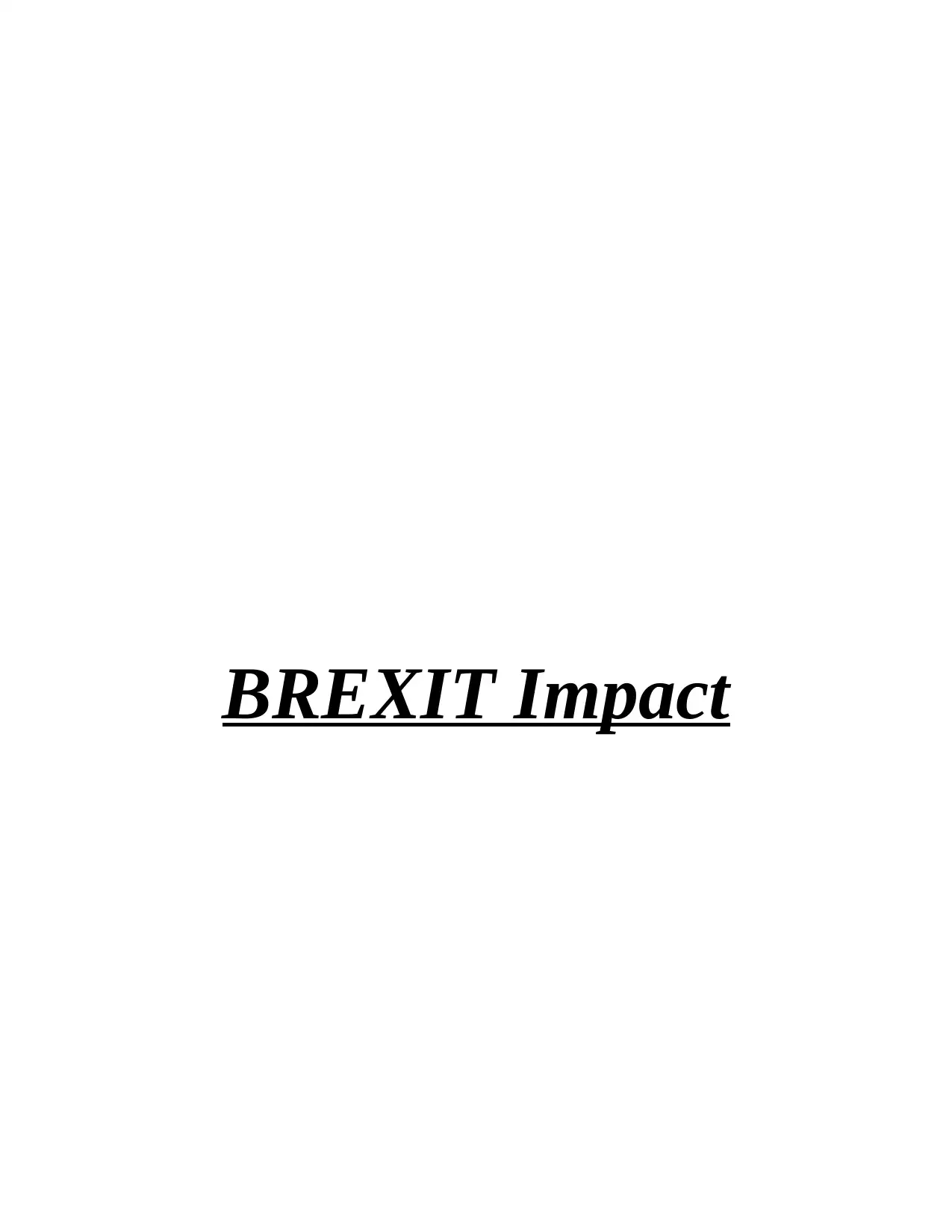
BREXIT Impact
Secure Best Marks with AI Grader
Need help grading? Try our AI Grader for instant feedback on your assignments.
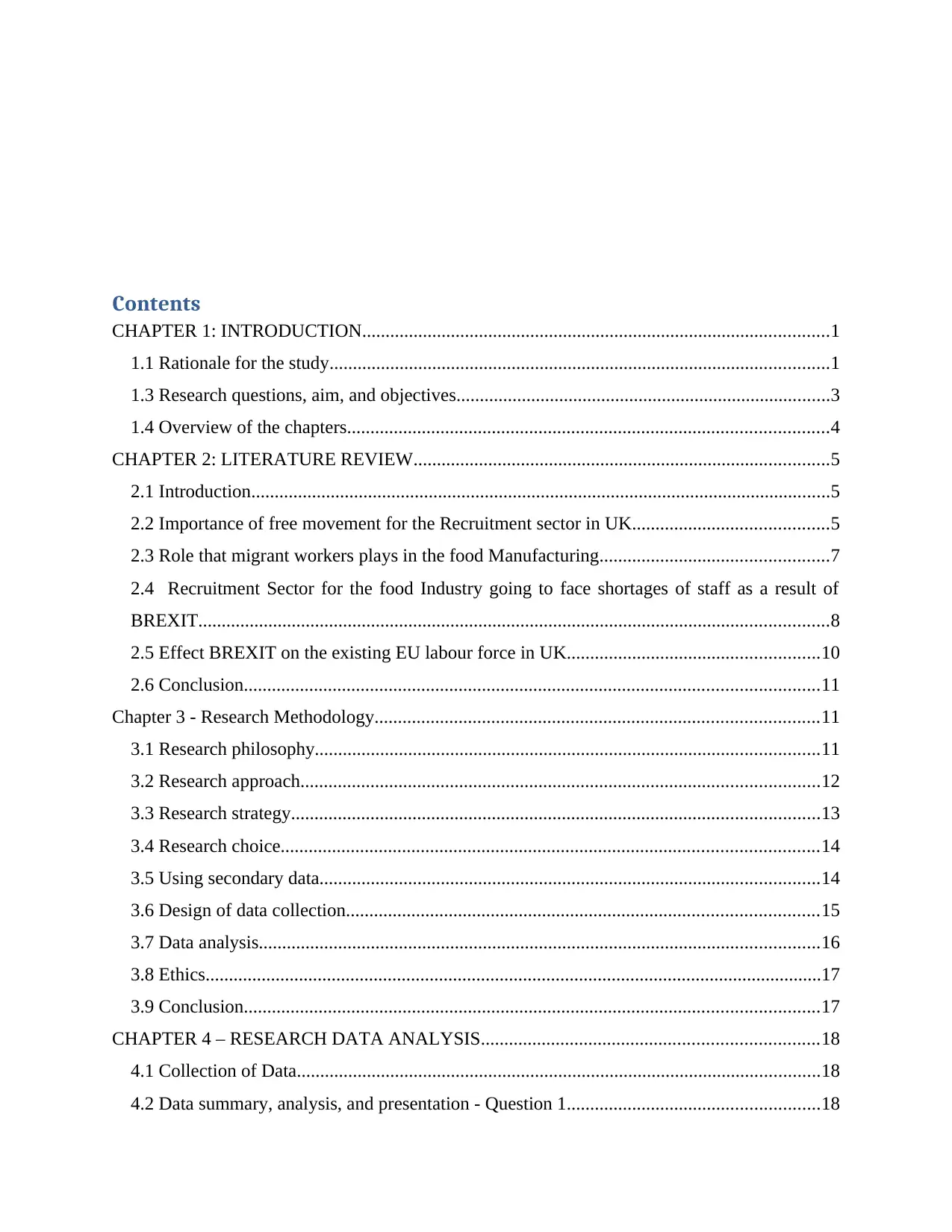
Contents
CHAPTER 1: INTRODUCTION....................................................................................................1
1.1 Rationale for the study...........................................................................................................1
1.3 Research questions, aim, and objectives................................................................................3
1.4 Overview of the chapters.......................................................................................................4
CHAPTER 2: LITERATURE REVIEW.........................................................................................5
2.1 Introduction............................................................................................................................5
2.2 Importance of free movement for the Recruitment sector in UK..........................................5
2.3 Role that migrant workers plays in the food Manufacturing.................................................7
2.4 Recruitment Sector for the food Industry going to face shortages of staff as a result of
BREXIT.......................................................................................................................................8
2.5 Effect BREXIT on the existing EU labour force in UK......................................................10
2.6 Conclusion...........................................................................................................................11
Chapter 3 - Research Methodology...............................................................................................11
3.1 Research philosophy............................................................................................................11
3.2 Research approach...............................................................................................................12
3.3 Research strategy.................................................................................................................13
3.4 Research choice...................................................................................................................14
3.5 Using secondary data...........................................................................................................14
3.6 Design of data collection.....................................................................................................15
3.7 Data analysis........................................................................................................................16
3.8 Ethics....................................................................................................................................17
3.9 Conclusion...........................................................................................................................17
CHAPTER 4 – RESEARCH DATA ANALYSIS........................................................................18
4.1 Collection of Data................................................................................................................18
4.2 Data summary, analysis, and presentation - Question 1......................................................18
CHAPTER 1: INTRODUCTION....................................................................................................1
1.1 Rationale for the study...........................................................................................................1
1.3 Research questions, aim, and objectives................................................................................3
1.4 Overview of the chapters.......................................................................................................4
CHAPTER 2: LITERATURE REVIEW.........................................................................................5
2.1 Introduction............................................................................................................................5
2.2 Importance of free movement for the Recruitment sector in UK..........................................5
2.3 Role that migrant workers plays in the food Manufacturing.................................................7
2.4 Recruitment Sector for the food Industry going to face shortages of staff as a result of
BREXIT.......................................................................................................................................8
2.5 Effect BREXIT on the existing EU labour force in UK......................................................10
2.6 Conclusion...........................................................................................................................11
Chapter 3 - Research Methodology...............................................................................................11
3.1 Research philosophy............................................................................................................11
3.2 Research approach...............................................................................................................12
3.3 Research strategy.................................................................................................................13
3.4 Research choice...................................................................................................................14
3.5 Using secondary data...........................................................................................................14
3.6 Design of data collection.....................................................................................................15
3.7 Data analysis........................................................................................................................16
3.8 Ethics....................................................................................................................................17
3.9 Conclusion...........................................................................................................................17
CHAPTER 4 – RESEARCH DATA ANALYSIS........................................................................18
4.1 Collection of Data................................................................................................................18
4.2 Data summary, analysis, and presentation - Question 1......................................................18
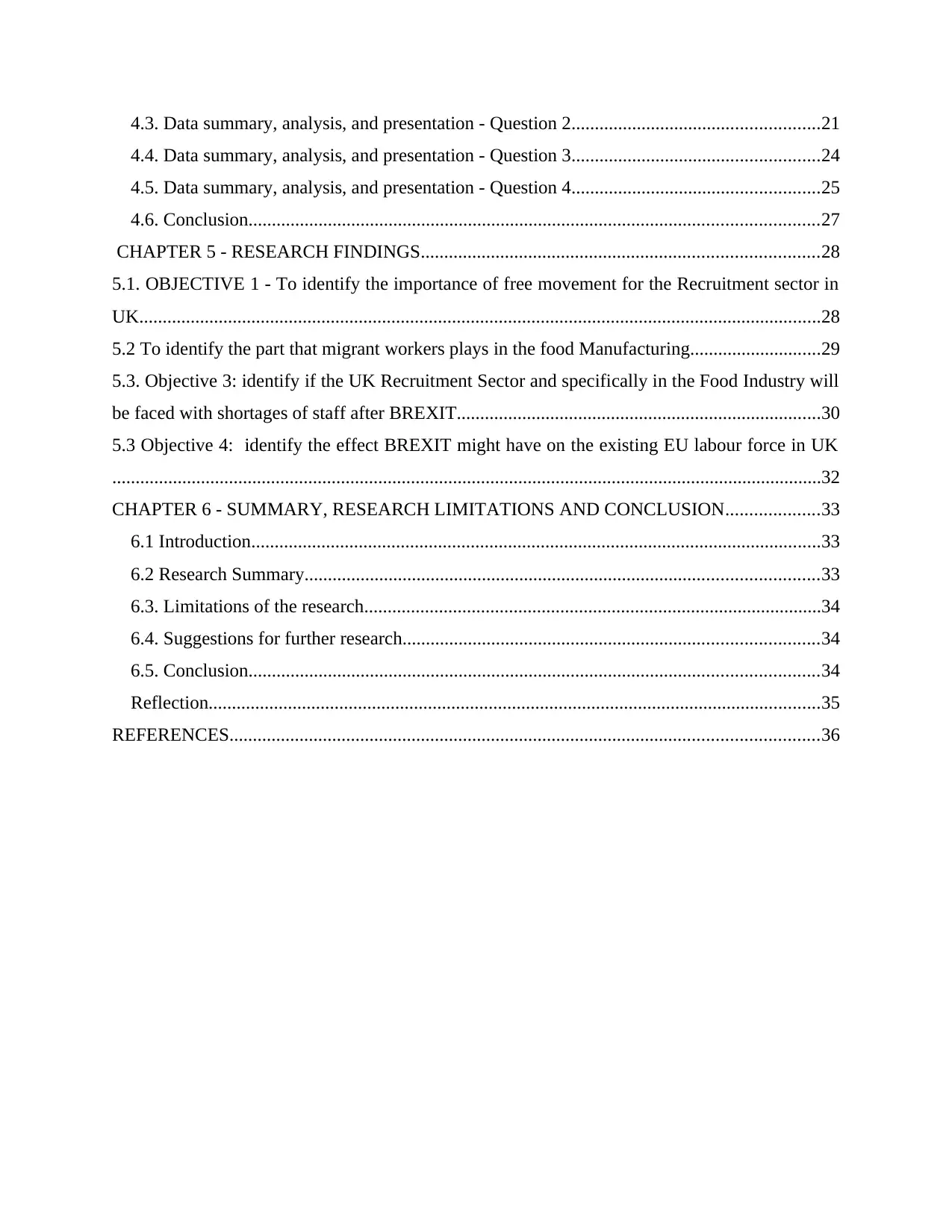
4.3. Data summary, analysis, and presentation - Question 2.....................................................21
4.4. Data summary, analysis, and presentation - Question 3.....................................................24
4.5. Data summary, analysis, and presentation - Question 4.....................................................25
4.6. Conclusion..........................................................................................................................27
CHAPTER 5 - RESEARCH FINDINGS.....................................................................................28
5.1. OBJECTIVE 1 - To identify the importance of free movement for the Recruitment sector in
UK..................................................................................................................................................28
5.2 To identify the part that migrant workers plays in the food Manufacturing............................29
5.3. Objective 3: identify if the UK Recruitment Sector and specifically in the Food Industry will
be faced with shortages of staff after BREXIT..............................................................................30
5.3 Objective 4: identify the effect BREXIT might have on the existing EU labour force in UK
........................................................................................................................................................32
CHAPTER 6 - SUMMARY, RESEARCH LIMITATIONS AND CONCLUSION....................33
6.1 Introduction..........................................................................................................................33
6.2 Research Summary..............................................................................................................33
6.3. Limitations of the research..................................................................................................34
6.4. Suggestions for further research.........................................................................................34
6.5. Conclusion..........................................................................................................................34
Reflection...................................................................................................................................35
REFERENCES..............................................................................................................................36
4.4. Data summary, analysis, and presentation - Question 3.....................................................24
4.5. Data summary, analysis, and presentation - Question 4.....................................................25
4.6. Conclusion..........................................................................................................................27
CHAPTER 5 - RESEARCH FINDINGS.....................................................................................28
5.1. OBJECTIVE 1 - To identify the importance of free movement for the Recruitment sector in
UK..................................................................................................................................................28
5.2 To identify the part that migrant workers plays in the food Manufacturing............................29
5.3. Objective 3: identify if the UK Recruitment Sector and specifically in the Food Industry will
be faced with shortages of staff after BREXIT..............................................................................30
5.3 Objective 4: identify the effect BREXIT might have on the existing EU labour force in UK
........................................................................................................................................................32
CHAPTER 6 - SUMMARY, RESEARCH LIMITATIONS AND CONCLUSION....................33
6.1 Introduction..........................................................................................................................33
6.2 Research Summary..............................................................................................................33
6.3. Limitations of the research..................................................................................................34
6.4. Suggestions for further research.........................................................................................34
6.5. Conclusion..........................................................................................................................34
Reflection...................................................................................................................................35
REFERENCES..............................................................................................................................36
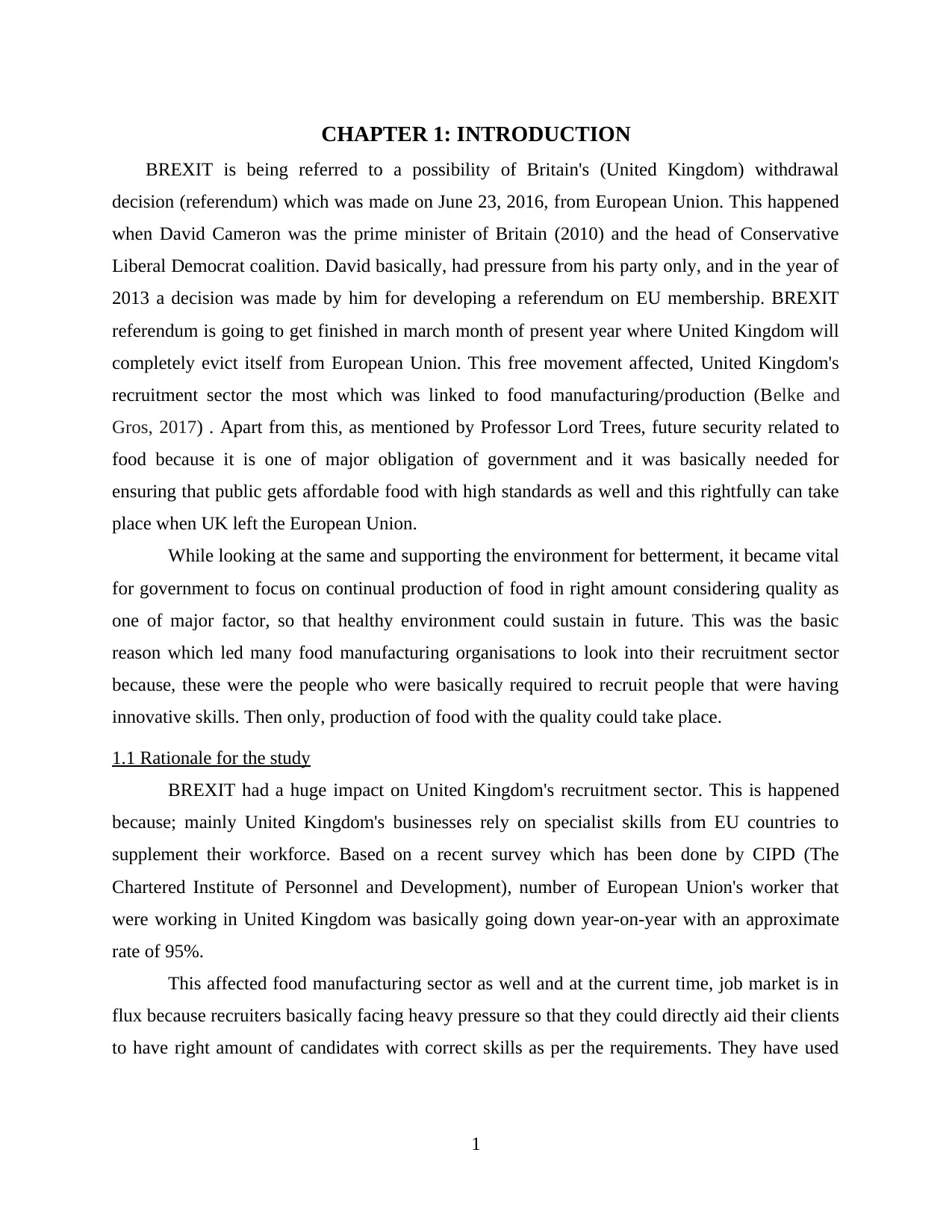
CHAPTER 1: INTRODUCTION
BREXIT is being referred to a possibility of Britain's (United Kingdom) withdrawal
decision (referendum) which was made on June 23, 2016, from European Union. This happened
when David Cameron was the prime minister of Britain (2010) and the head of Conservative
Liberal Democrat coalition. David basically, had pressure from his party only, and in the year of
2013 a decision was made by him for developing a referendum on EU membership. BREXIT
referendum is going to get finished in march month of present year where United Kingdom will
completely evict itself from European Union. This free movement affected, United Kingdom's
recruitment sector the most which was linked to food manufacturing/production (Belke and
Gros, 2017) . Apart from this, as mentioned by Professor Lord Trees, future security related to
food because it is one of major obligation of government and it was basically needed for
ensuring that public gets affordable food with high standards as well and this rightfully can take
place when UK left the European Union.
While looking at the same and supporting the environment for betterment, it became vital
for government to focus on continual production of food in right amount considering quality as
one of major factor, so that healthy environment could sustain in future. This was the basic
reason which led many food manufacturing organisations to look into their recruitment sector
because, these were the people who were basically required to recruit people that were having
innovative skills. Then only, production of food with the quality could take place.
1.1 Rationale for the study
BREXIT had a huge impact on United Kingdom's recruitment sector. This is happened
because; mainly United Kingdom's businesses rely on specialist skills from EU countries to
supplement their workforce. Based on a recent survey which has been done by CIPD (The
Chartered Institute of Personnel and Development), number of European Union's worker that
were working in United Kingdom was basically going down year-on-year with an approximate
rate of 95%.
This affected food manufacturing sector as well and at the current time, job market is in
flux because recruiters basically facing heavy pressure so that they could directly aid their clients
to have right amount of candidates with correct skills as per the requirements. They have used
1
BREXIT is being referred to a possibility of Britain's (United Kingdom) withdrawal
decision (referendum) which was made on June 23, 2016, from European Union. This happened
when David Cameron was the prime minister of Britain (2010) and the head of Conservative
Liberal Democrat coalition. David basically, had pressure from his party only, and in the year of
2013 a decision was made by him for developing a referendum on EU membership. BREXIT
referendum is going to get finished in march month of present year where United Kingdom will
completely evict itself from European Union. This free movement affected, United Kingdom's
recruitment sector the most which was linked to food manufacturing/production (Belke and
Gros, 2017) . Apart from this, as mentioned by Professor Lord Trees, future security related to
food because it is one of major obligation of government and it was basically needed for
ensuring that public gets affordable food with high standards as well and this rightfully can take
place when UK left the European Union.
While looking at the same and supporting the environment for betterment, it became vital
for government to focus on continual production of food in right amount considering quality as
one of major factor, so that healthy environment could sustain in future. This was the basic
reason which led many food manufacturing organisations to look into their recruitment sector
because, these were the people who were basically required to recruit people that were having
innovative skills. Then only, production of food with the quality could take place.
1.1 Rationale for the study
BREXIT had a huge impact on United Kingdom's recruitment sector. This is happened
because; mainly United Kingdom's businesses rely on specialist skills from EU countries to
supplement their workforce. Based on a recent survey which has been done by CIPD (The
Chartered Institute of Personnel and Development), number of European Union's worker that
were working in United Kingdom was basically going down year-on-year with an approximate
rate of 95%.
This affected food manufacturing sector as well and at the current time, job market is in
flux because recruiters basically facing heavy pressure so that they could directly aid their clients
to have right amount of candidates with correct skills as per the requirements. They have used
1
Secure Best Marks with AI Grader
Need help grading? Try our AI Grader for instant feedback on your assignments.
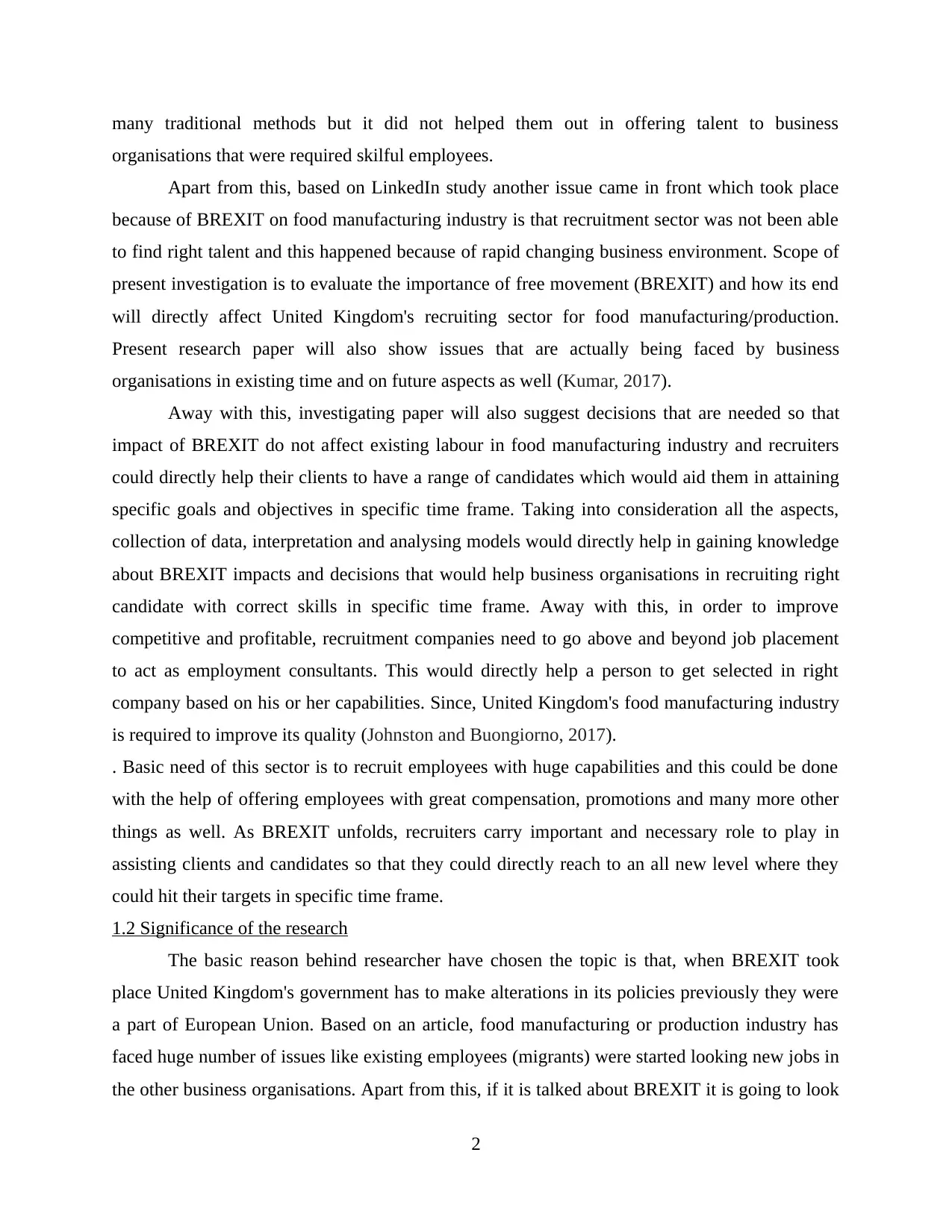
many traditional methods but it did not helped them out in offering talent to business
organisations that were required skilful employees.
Apart from this, based on LinkedIn study another issue came in front which took place
because of BREXIT on food manufacturing industry is that recruitment sector was not been able
to find right talent and this happened because of rapid changing business environment. Scope of
present investigation is to evaluate the importance of free movement (BREXIT) and how its end
will directly affect United Kingdom's recruiting sector for food manufacturing/production.
Present research paper will also show issues that are actually being faced by business
organisations in existing time and on future aspects as well (Kumar, 2017).
Away with this, investigating paper will also suggest decisions that are needed so that
impact of BREXIT do not affect existing labour in food manufacturing industry and recruiters
could directly help their clients to have a range of candidates which would aid them in attaining
specific goals and objectives in specific time frame. Taking into consideration all the aspects,
collection of data, interpretation and analysing models would directly help in gaining knowledge
about BREXIT impacts and decisions that would help business organisations in recruiting right
candidate with correct skills in specific time frame. Away with this, in order to improve
competitive and profitable, recruitment companies need to go above and beyond job placement
to act as employment consultants. This would directly help a person to get selected in right
company based on his or her capabilities. Since, United Kingdom's food manufacturing industry
is required to improve its quality (Johnston and Buongiorno, 2017).
. Basic need of this sector is to recruit employees with huge capabilities and this could be done
with the help of offering employees with great compensation, promotions and many more other
things as well. As BREXIT unfolds, recruiters carry important and necessary role to play in
assisting clients and candidates so that they could directly reach to an all new level where they
could hit their targets in specific time frame.
1.2 Significance of the research
The basic reason behind researcher have chosen the topic is that, when BREXIT took
place United Kingdom's government has to make alterations in its policies previously they were
a part of European Union. Based on an article, food manufacturing or production industry has
faced huge number of issues like existing employees (migrants) were started looking new jobs in
the other business organisations. Apart from this, if it is talked about BREXIT it is going to look
2
organisations that were required skilful employees.
Apart from this, based on LinkedIn study another issue came in front which took place
because of BREXIT on food manufacturing industry is that recruitment sector was not been able
to find right talent and this happened because of rapid changing business environment. Scope of
present investigation is to evaluate the importance of free movement (BREXIT) and how its end
will directly affect United Kingdom's recruiting sector for food manufacturing/production.
Present research paper will also show issues that are actually being faced by business
organisations in existing time and on future aspects as well (Kumar, 2017).
Away with this, investigating paper will also suggest decisions that are needed so that
impact of BREXIT do not affect existing labour in food manufacturing industry and recruiters
could directly help their clients to have a range of candidates which would aid them in attaining
specific goals and objectives in specific time frame. Taking into consideration all the aspects,
collection of data, interpretation and analysing models would directly help in gaining knowledge
about BREXIT impacts and decisions that would help business organisations in recruiting right
candidate with correct skills in specific time frame. Away with this, in order to improve
competitive and profitable, recruitment companies need to go above and beyond job placement
to act as employment consultants. This would directly help a person to get selected in right
company based on his or her capabilities. Since, United Kingdom's food manufacturing industry
is required to improve its quality (Johnston and Buongiorno, 2017).
. Basic need of this sector is to recruit employees with huge capabilities and this could be done
with the help of offering employees with great compensation, promotions and many more other
things as well. As BREXIT unfolds, recruiters carry important and necessary role to play in
assisting clients and candidates so that they could directly reach to an all new level where they
could hit their targets in specific time frame.
1.2 Significance of the research
The basic reason behind researcher have chosen the topic is that, when BREXIT took
place United Kingdom's government has to make alterations in its policies previously they were
a part of European Union. Based on an article, food manufacturing or production industry has
faced huge number of issues like existing employees (migrants) were started looking new jobs in
the other business organisations. Apart from this, if it is talked about BREXIT it is going to look
2
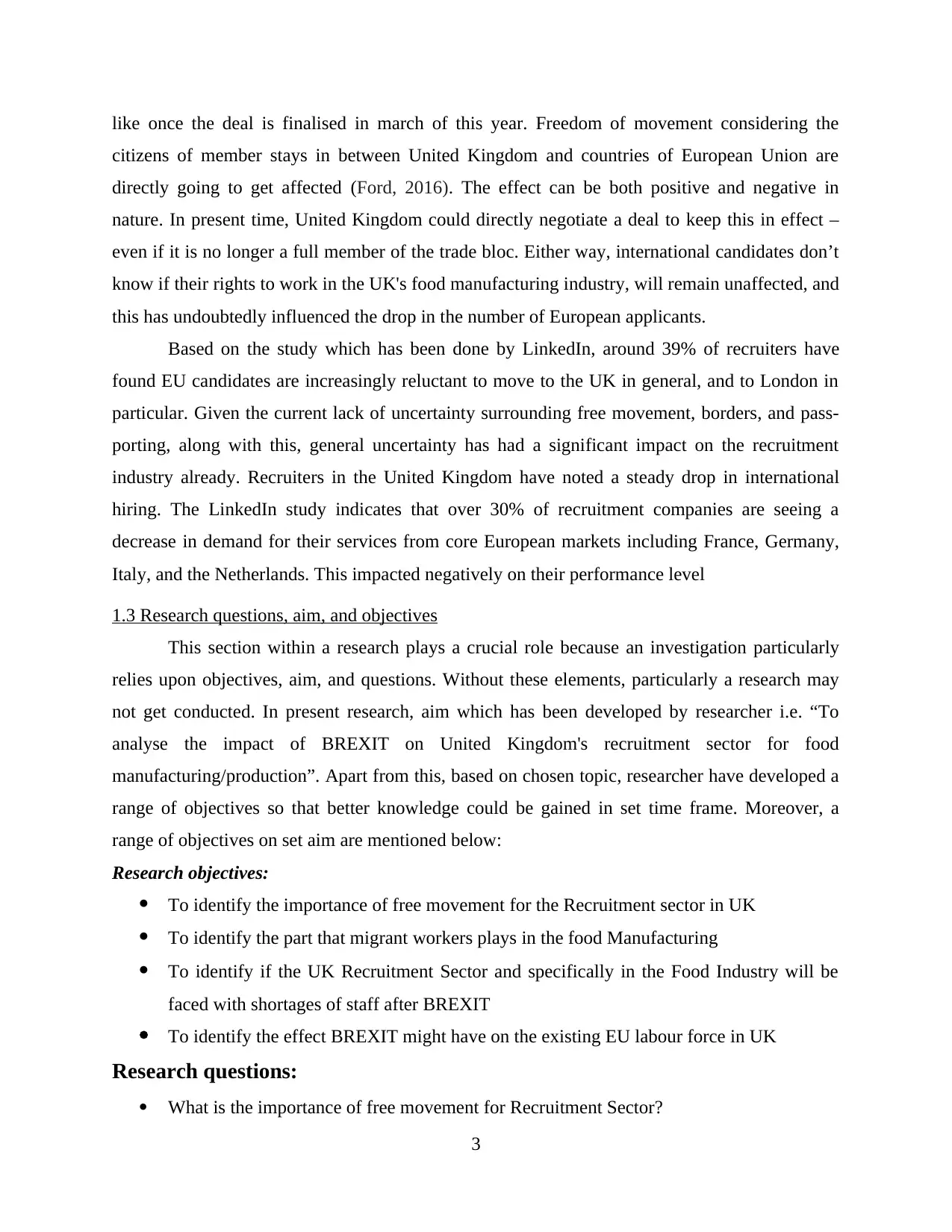
like once the deal is finalised in march of this year. Freedom of movement considering the
citizens of member stays in between United Kingdom and countries of European Union are
directly going to get affected (Ford, 2016). The effect can be both positive and negative in
nature. In present time, United Kingdom could directly negotiate a deal to keep this in effect –
even if it is no longer a full member of the trade bloc. Either way, international candidates don’t
know if their rights to work in the UK's food manufacturing industry, will remain unaffected, and
this has undoubtedly influenced the drop in the number of European applicants.
Based on the study which has been done by LinkedIn, around 39% of recruiters have
found EU candidates are increasingly reluctant to move to the UK in general, and to London in
particular. Given the current lack of uncertainty surrounding free movement, borders, and pass-
porting, along with this, general uncertainty has had a significant impact on the recruitment
industry already. Recruiters in the United Kingdom have noted a steady drop in international
hiring. The LinkedIn study indicates that over 30% of recruitment companies are seeing a
decrease in demand for their services from core European markets including France, Germany,
Italy, and the Netherlands. This impacted negatively on their performance level
1.3 Research questions, aim, and objectives
This section within a research plays a crucial role because an investigation particularly
relies upon objectives, aim, and questions. Without these elements, particularly a research may
not get conducted. In present research, aim which has been developed by researcher i.e. “To
analyse the impact of BREXIT on United Kingdom's recruitment sector for food
manufacturing/production”. Apart from this, based on chosen topic, researcher have developed a
range of objectives so that better knowledge could be gained in set time frame. Moreover, a
range of objectives on set aim are mentioned below:
Research objectives:
To identify the importance of free movement for the Recruitment sector in UK
To identify the part that migrant workers plays in the food Manufacturing
To identify if the UK Recruitment Sector and specifically in the Food Industry will be
faced with shortages of staff after BREXIT
To identify the effect BREXIT might have on the existing EU labour force in UK
Research questions:
What is the importance of free movement for Recruitment Sector?
3
citizens of member stays in between United Kingdom and countries of European Union are
directly going to get affected (Ford, 2016). The effect can be both positive and negative in
nature. In present time, United Kingdom could directly negotiate a deal to keep this in effect –
even if it is no longer a full member of the trade bloc. Either way, international candidates don’t
know if their rights to work in the UK's food manufacturing industry, will remain unaffected, and
this has undoubtedly influenced the drop in the number of European applicants.
Based on the study which has been done by LinkedIn, around 39% of recruiters have
found EU candidates are increasingly reluctant to move to the UK in general, and to London in
particular. Given the current lack of uncertainty surrounding free movement, borders, and pass-
porting, along with this, general uncertainty has had a significant impact on the recruitment
industry already. Recruiters in the United Kingdom have noted a steady drop in international
hiring. The LinkedIn study indicates that over 30% of recruitment companies are seeing a
decrease in demand for their services from core European markets including France, Germany,
Italy, and the Netherlands. This impacted negatively on their performance level
1.3 Research questions, aim, and objectives
This section within a research plays a crucial role because an investigation particularly
relies upon objectives, aim, and questions. Without these elements, particularly a research may
not get conducted. In present research, aim which has been developed by researcher i.e. “To
analyse the impact of BREXIT on United Kingdom's recruitment sector for food
manufacturing/production”. Apart from this, based on chosen topic, researcher have developed a
range of objectives so that better knowledge could be gained in set time frame. Moreover, a
range of objectives on set aim are mentioned below:
Research objectives:
To identify the importance of free movement for the Recruitment sector in UK
To identify the part that migrant workers plays in the food Manufacturing
To identify if the UK Recruitment Sector and specifically in the Food Industry will be
faced with shortages of staff after BREXIT
To identify the effect BREXIT might have on the existing EU labour force in UK
Research questions:
What is the importance of free movement for Recruitment Sector?
3
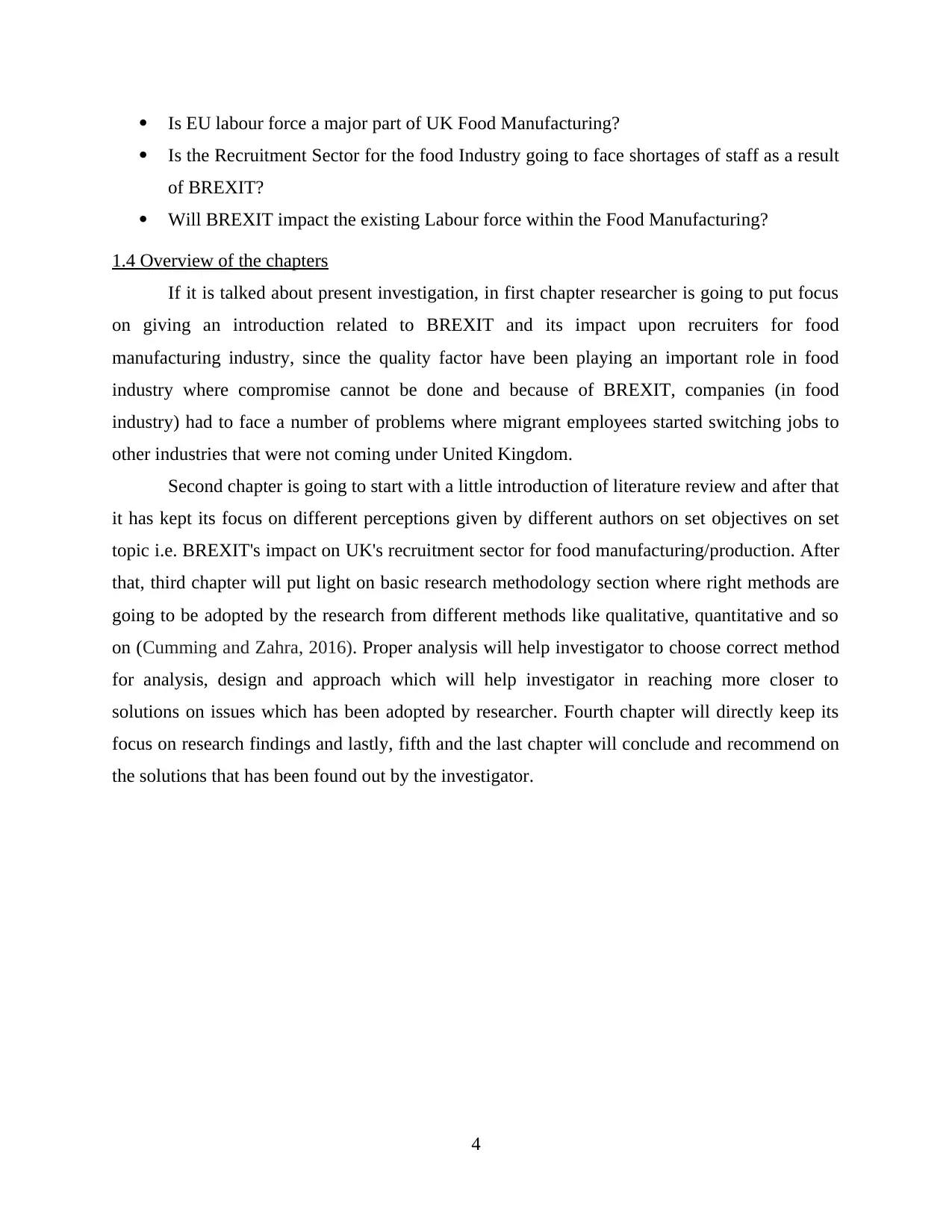
Is EU labour force a major part of UK Food Manufacturing?
Is the Recruitment Sector for the food Industry going to face shortages of staff as a result
of BREXIT?
Will BREXIT impact the existing Labour force within the Food Manufacturing?
1.4 Overview of the chapters
If it is talked about present investigation, in first chapter researcher is going to put focus
on giving an introduction related to BREXIT and its impact upon recruiters for food
manufacturing industry, since the quality factor have been playing an important role in food
industry where compromise cannot be done and because of BREXIT, companies (in food
industry) had to face a number of problems where migrant employees started switching jobs to
other industries that were not coming under United Kingdom.
Second chapter is going to start with a little introduction of literature review and after that
it has kept its focus on different perceptions given by different authors on set objectives on set
topic i.e. BREXIT's impact on UK's recruitment sector for food manufacturing/production. After
that, third chapter will put light on basic research methodology section where right methods are
going to be adopted by the research from different methods like qualitative, quantitative and so
on (Cumming and Zahra, 2016). Proper analysis will help investigator to choose correct method
for analysis, design and approach which will help investigator in reaching more closer to
solutions on issues which has been adopted by researcher. Fourth chapter will directly keep its
focus on research findings and lastly, fifth and the last chapter will conclude and recommend on
the solutions that has been found out by the investigator.
4
Is the Recruitment Sector for the food Industry going to face shortages of staff as a result
of BREXIT?
Will BREXIT impact the existing Labour force within the Food Manufacturing?
1.4 Overview of the chapters
If it is talked about present investigation, in first chapter researcher is going to put focus
on giving an introduction related to BREXIT and its impact upon recruiters for food
manufacturing industry, since the quality factor have been playing an important role in food
industry where compromise cannot be done and because of BREXIT, companies (in food
industry) had to face a number of problems where migrant employees started switching jobs to
other industries that were not coming under United Kingdom.
Second chapter is going to start with a little introduction of literature review and after that
it has kept its focus on different perceptions given by different authors on set objectives on set
topic i.e. BREXIT's impact on UK's recruitment sector for food manufacturing/production. After
that, third chapter will put light on basic research methodology section where right methods are
going to be adopted by the research from different methods like qualitative, quantitative and so
on (Cumming and Zahra, 2016). Proper analysis will help investigator to choose correct method
for analysis, design and approach which will help investigator in reaching more closer to
solutions on issues which has been adopted by researcher. Fourth chapter will directly keep its
focus on research findings and lastly, fifth and the last chapter will conclude and recommend on
the solutions that has been found out by the investigator.
4
Paraphrase This Document
Need a fresh take? Get an instant paraphrase of this document with our AI Paraphraser
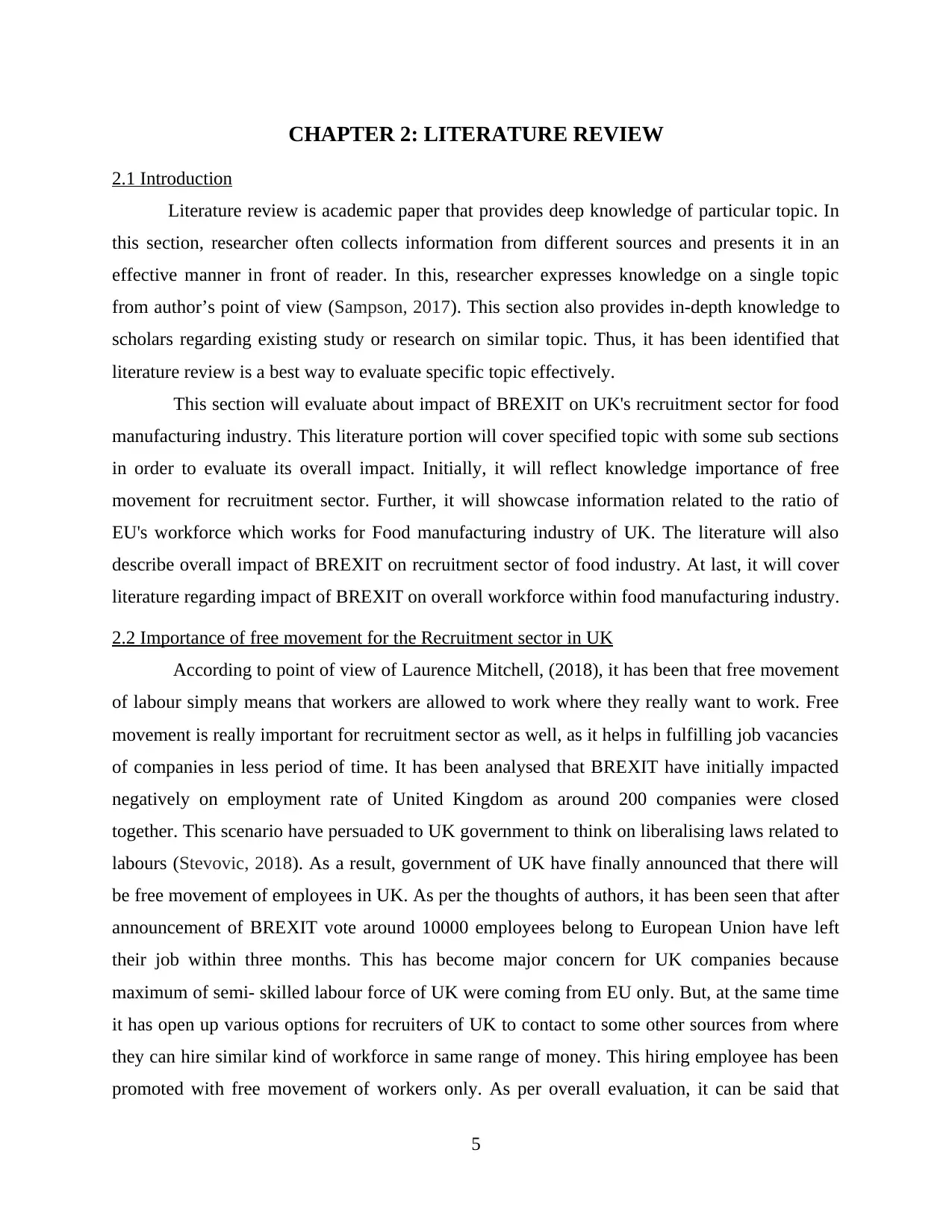
CHAPTER 2: LITERATURE REVIEW
2.1 Introduction
Literature review is academic paper that provides deep knowledge of particular topic. In
this section, researcher often collects information from different sources and presents it in an
effective manner in front of reader. In this, researcher expresses knowledge on a single topic
from author’s point of view (Sampson, 2017). This section also provides in-depth knowledge to
scholars regarding existing study or research on similar topic. Thus, it has been identified that
literature review is a best way to evaluate specific topic effectively.
This section will evaluate about impact of BREXIT on UK's recruitment sector for food
manufacturing industry. This literature portion will cover specified topic with some sub sections
in order to evaluate its overall impact. Initially, it will reflect knowledge importance of free
movement for recruitment sector. Further, it will showcase information related to the ratio of
EU's workforce which works for Food manufacturing industry of UK. The literature will also
describe overall impact of BREXIT on recruitment sector of food industry. At last, it will cover
literature regarding impact of BREXIT on overall workforce within food manufacturing industry.
2.2 Importance of free movement for the Recruitment sector in UK
According to point of view of Laurence Mitchell, (2018), it has been that free movement
of labour simply means that workers are allowed to work where they really want to work. Free
movement is really important for recruitment sector as well, as it helps in fulfilling job vacancies
of companies in less period of time. It has been analysed that BREXIT have initially impacted
negatively on employment rate of United Kingdom as around 200 companies were closed
together. This scenario have persuaded to UK government to think on liberalising laws related to
labours (Stevovic, 2018). As a result, government of UK have finally announced that there will
be free movement of employees in UK. As per the thoughts of authors, it has been seen that after
announcement of BREXIT vote around 10000 employees belong to European Union have left
their job within three months. This has become major concern for UK companies because
maximum of semi- skilled labour force of UK were coming from EU only. But, at the same time
it has open up various options for recruiters of UK to contact to some other sources from where
they can hire similar kind of workforce in same range of money. This hiring employee has been
promoted with free movement of workers only. As per overall evaluation, it can be said that
5
2.1 Introduction
Literature review is academic paper that provides deep knowledge of particular topic. In
this section, researcher often collects information from different sources and presents it in an
effective manner in front of reader. In this, researcher expresses knowledge on a single topic
from author’s point of view (Sampson, 2017). This section also provides in-depth knowledge to
scholars regarding existing study or research on similar topic. Thus, it has been identified that
literature review is a best way to evaluate specific topic effectively.
This section will evaluate about impact of BREXIT on UK's recruitment sector for food
manufacturing industry. This literature portion will cover specified topic with some sub sections
in order to evaluate its overall impact. Initially, it will reflect knowledge importance of free
movement for recruitment sector. Further, it will showcase information related to the ratio of
EU's workforce which works for Food manufacturing industry of UK. The literature will also
describe overall impact of BREXIT on recruitment sector of food industry. At last, it will cover
literature regarding impact of BREXIT on overall workforce within food manufacturing industry.
2.2 Importance of free movement for the Recruitment sector in UK
According to point of view of Laurence Mitchell, (2018), it has been that free movement
of labour simply means that workers are allowed to work where they really want to work. Free
movement is really important for recruitment sector as well, as it helps in fulfilling job vacancies
of companies in less period of time. It has been analysed that BREXIT have initially impacted
negatively on employment rate of United Kingdom as around 200 companies were closed
together. This scenario have persuaded to UK government to think on liberalising laws related to
labours (Stevovic, 2018). As a result, government of UK have finally announced that there will
be free movement of employees in UK. As per the thoughts of authors, it has been seen that after
announcement of BREXIT vote around 10000 employees belong to European Union have left
their job within three months. This has become major concern for UK companies because
maximum of semi- skilled labour force of UK were coming from EU only. But, at the same time
it has open up various options for recruiters of UK to contact to some other sources from where
they can hire similar kind of workforce in same range of money. This hiring employee has been
promoted with free movement of workers only. As per overall evaluation, it can be said that
5
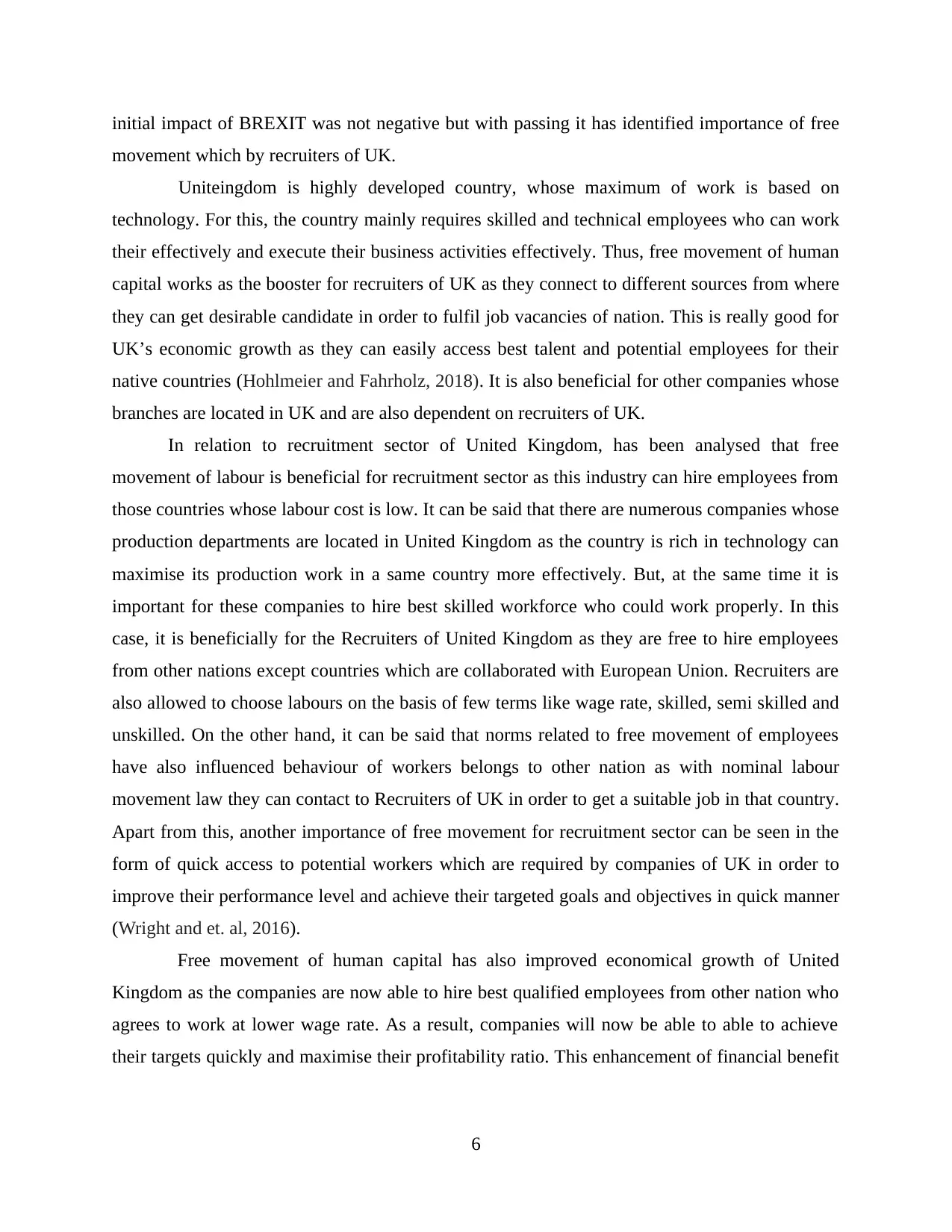
initial impact of BREXIT was not negative but with passing it has identified importance of free
movement which by recruiters of UK.
Uniteingdom is highly developed country, whose maximum of work is based on
technology. For this, the country mainly requires skilled and technical employees who can work
their effectively and execute their business activities effectively. Thus, free movement of human
capital works as the booster for recruiters of UK as they connect to different sources from where
they can get desirable candidate in order to fulfil job vacancies of nation. This is really good for
UK’s economic growth as they can easily access best talent and potential employees for their
native countries (Hohlmeier and Fahrholz, 2018). It is also beneficial for other companies whose
branches are located in UK and are also dependent on recruiters of UK.
In relation to recruitment sector of United Kingdom, has been analysed that free
movement of labour is beneficial for recruitment sector as this industry can hire employees from
those countries whose labour cost is low. It can be said that there are numerous companies whose
production departments are located in United Kingdom as the country is rich in technology can
maximise its production work in a same country more effectively. But, at the same time it is
important for these companies to hire best skilled workforce who could work properly. In this
case, it is beneficially for the Recruiters of United Kingdom as they are free to hire employees
from other nations except countries which are collaborated with European Union. Recruiters are
also allowed to choose labours on the basis of few terms like wage rate, skilled, semi skilled and
unskilled. On the other hand, it can be said that norms related to free movement of employees
have also influenced behaviour of workers belongs to other nation as with nominal labour
movement law they can contact to Recruiters of UK in order to get a suitable job in that country.
Apart from this, another importance of free movement for recruitment sector can be seen in the
form of quick access to potential workers which are required by companies of UK in order to
improve their performance level and achieve their targeted goals and objectives in quick manner
(Wright and et. al, 2016).
Free movement of human capital has also improved economical growth of United
Kingdom as the companies are now able to hire best qualified employees from other nation who
agrees to work at lower wage rate. As a result, companies will now be able to able to achieve
their targets quickly and maximise their profitability ratio. This enhancement of financial benefit
6
movement which by recruiters of UK.
Uniteingdom is highly developed country, whose maximum of work is based on
technology. For this, the country mainly requires skilled and technical employees who can work
their effectively and execute their business activities effectively. Thus, free movement of human
capital works as the booster for recruiters of UK as they connect to different sources from where
they can get desirable candidate in order to fulfil job vacancies of nation. This is really good for
UK’s economic growth as they can easily access best talent and potential employees for their
native countries (Hohlmeier and Fahrholz, 2018). It is also beneficial for other companies whose
branches are located in UK and are also dependent on recruiters of UK.
In relation to recruitment sector of United Kingdom, has been analysed that free
movement of labour is beneficial for recruitment sector as this industry can hire employees from
those countries whose labour cost is low. It can be said that there are numerous companies whose
production departments are located in United Kingdom as the country is rich in technology can
maximise its production work in a same country more effectively. But, at the same time it is
important for these companies to hire best skilled workforce who could work properly. In this
case, it is beneficially for the Recruiters of United Kingdom as they are free to hire employees
from other nations except countries which are collaborated with European Union. Recruiters are
also allowed to choose labours on the basis of few terms like wage rate, skilled, semi skilled and
unskilled. On the other hand, it can be said that norms related to free movement of employees
have also influenced behaviour of workers belongs to other nation as with nominal labour
movement law they can contact to Recruiters of UK in order to get a suitable job in that country.
Apart from this, another importance of free movement for recruitment sector can be seen in the
form of quick access to potential workers which are required by companies of UK in order to
improve their performance level and achieve their targeted goals and objectives in quick manner
(Wright and et. al, 2016).
Free movement of human capital has also improved economical growth of United
Kingdom as the companies are now able to hire best qualified employees from other nation who
agrees to work at lower wage rate. As a result, companies will now be able to able to achieve
their targets quickly and maximise their profitability ratio. This enhancement of financial benefit
6
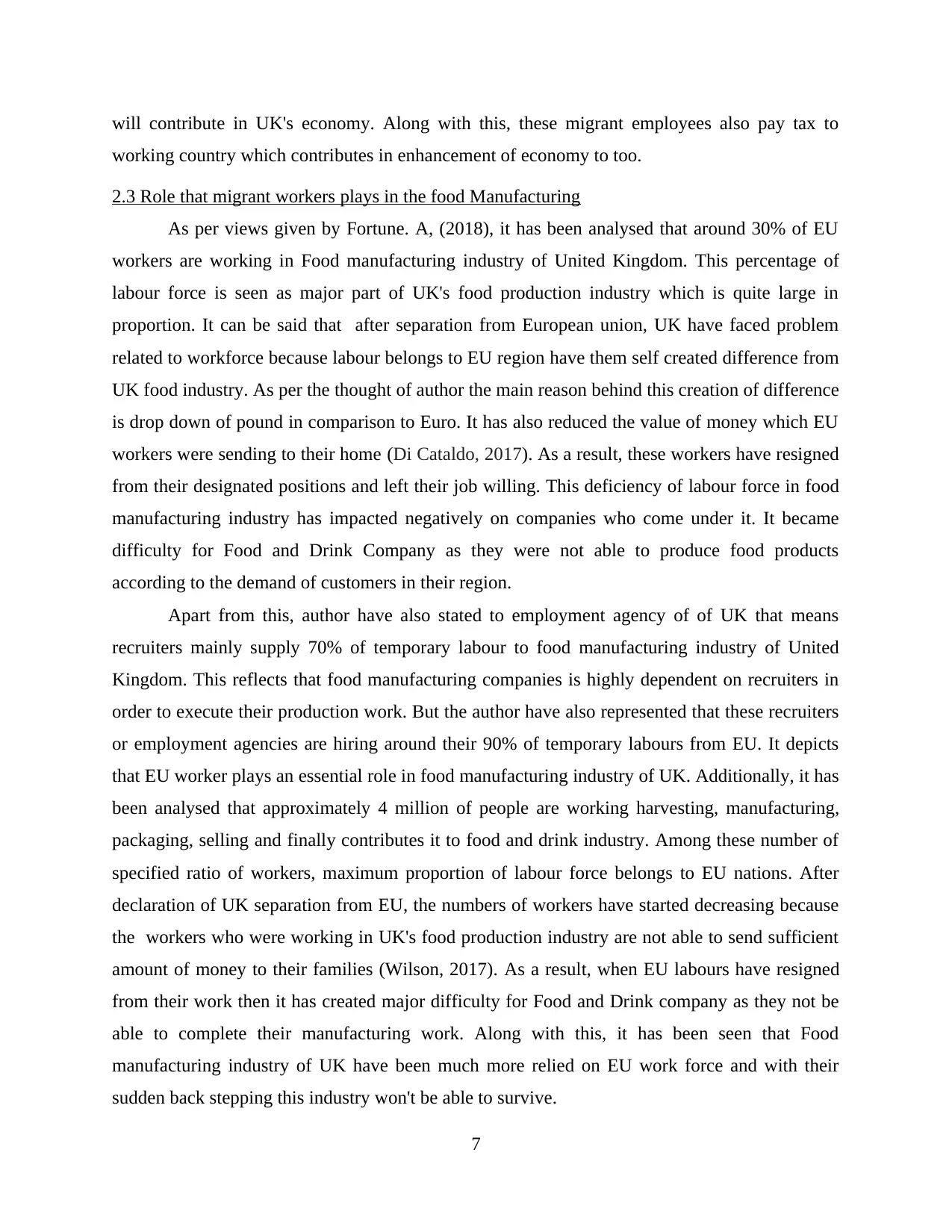
will contribute in UK's economy. Along with this, these migrant employees also pay tax to
working country which contributes in enhancement of economy to too.
2.3 Role that migrant workers plays in the food Manufacturing
As per views given by Fortune. A, (2018), it has been analysed that around 30% of EU
workers are working in Food manufacturing industry of United Kingdom. This percentage of
labour force is seen as major part of UK's food production industry which is quite large in
proportion. It can be said that after separation from European union, UK have faced problem
related to workforce because labour belongs to EU region have them self created difference from
UK food industry. As per the thought of author the main reason behind this creation of difference
is drop down of pound in comparison to Euro. It has also reduced the value of money which EU
workers were sending to their home (Di Cataldo, 2017). As a result, these workers have resigned
from their designated positions and left their job willing. This deficiency of labour force in food
manufacturing industry has impacted negatively on companies who come under it. It became
difficulty for Food and Drink Company as they were not able to produce food products
according to the demand of customers in their region.
Apart from this, author have also stated to employment agency of of UK that means
recruiters mainly supply 70% of temporary labour to food manufacturing industry of United
Kingdom. This reflects that food manufacturing companies is highly dependent on recruiters in
order to execute their production work. But the author have also represented that these recruiters
or employment agencies are hiring around their 90% of temporary labours from EU. It depicts
that EU worker plays an essential role in food manufacturing industry of UK. Additionally, it has
been analysed that approximately 4 million of people are working harvesting, manufacturing,
packaging, selling and finally contributes it to food and drink industry. Among these number of
specified ratio of workers, maximum proportion of labour force belongs to EU nations. After
declaration of UK separation from EU, the numbers of workers have started decreasing because
the workers who were working in UK's food production industry are not able to send sufficient
amount of money to their families (Wilson, 2017). As a result, when EU labours have resigned
from their work then it has created major difficulty for Food and Drink company as they not be
able to complete their manufacturing work. Along with this, it has been seen that Food
manufacturing industry of UK have been much more relied on EU work force and with their
sudden back stepping this industry won't be able to survive.
7
working country which contributes in enhancement of economy to too.
2.3 Role that migrant workers plays in the food Manufacturing
As per views given by Fortune. A, (2018), it has been analysed that around 30% of EU
workers are working in Food manufacturing industry of United Kingdom. This percentage of
labour force is seen as major part of UK's food production industry which is quite large in
proportion. It can be said that after separation from European union, UK have faced problem
related to workforce because labour belongs to EU region have them self created difference from
UK food industry. As per the thought of author the main reason behind this creation of difference
is drop down of pound in comparison to Euro. It has also reduced the value of money which EU
workers were sending to their home (Di Cataldo, 2017). As a result, these workers have resigned
from their designated positions and left their job willing. This deficiency of labour force in food
manufacturing industry has impacted negatively on companies who come under it. It became
difficulty for Food and Drink Company as they were not able to produce food products
according to the demand of customers in their region.
Apart from this, author have also stated to employment agency of of UK that means
recruiters mainly supply 70% of temporary labour to food manufacturing industry of United
Kingdom. This reflects that food manufacturing companies is highly dependent on recruiters in
order to execute their production work. But the author have also represented that these recruiters
or employment agencies are hiring around their 90% of temporary labours from EU. It depicts
that EU worker plays an essential role in food manufacturing industry of UK. Additionally, it has
been analysed that approximately 4 million of people are working harvesting, manufacturing,
packaging, selling and finally contributes it to food and drink industry. Among these number of
specified ratio of workers, maximum proportion of labour force belongs to EU nations. After
declaration of UK separation from EU, the numbers of workers have started decreasing because
the workers who were working in UK's food production industry are not able to send sufficient
amount of money to their families (Wilson, 2017). As a result, when EU labours have resigned
from their work then it has created major difficulty for Food and Drink company as they not be
able to complete their manufacturing work. Along with this, it has been seen that Food
manufacturing industry of UK have been much more relied on EU work force and with their
sudden back stepping this industry won't be able to survive.
7
Secure Best Marks with AI Grader
Need help grading? Try our AI Grader for instant feedback on your assignments.
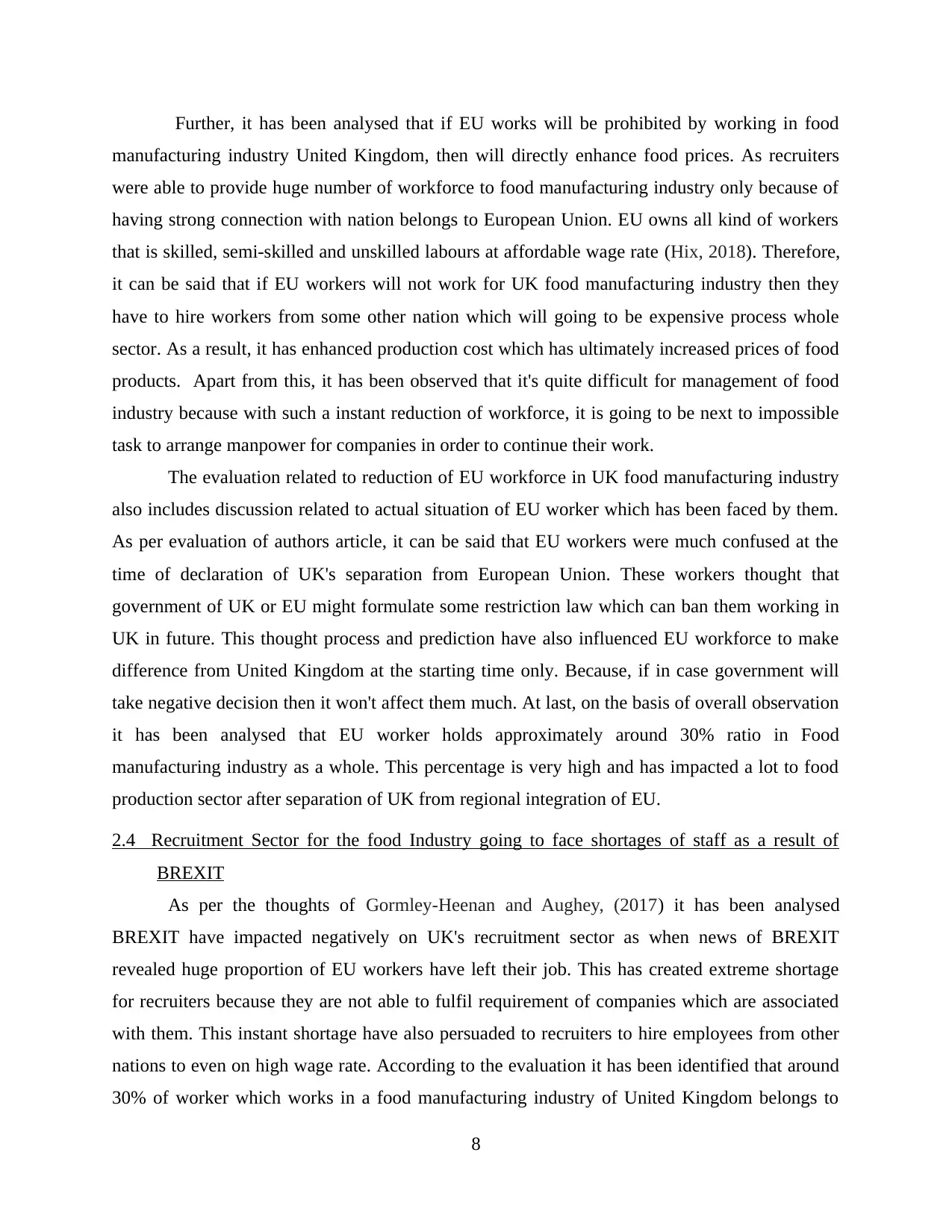
Further, it has been analysed that if EU works will be prohibited by working in food
manufacturing industry United Kingdom, then will directly enhance food prices. As recruiters
were able to provide huge number of workforce to food manufacturing industry only because of
having strong connection with nation belongs to European Union. EU owns all kind of workers
that is skilled, semi-skilled and unskilled labours at affordable wage rate (Hix, 2018). Therefore,
it can be said that if EU workers will not work for UK food manufacturing industry then they
have to hire workers from some other nation which will going to be expensive process whole
sector. As a result, it has enhanced production cost which has ultimately increased prices of food
products. Apart from this, it has been observed that it's quite difficult for management of food
industry because with such a instant reduction of workforce, it is going to be next to impossible
task to arrange manpower for companies in order to continue their work.
The evaluation related to reduction of EU workforce in UK food manufacturing industry
also includes discussion related to actual situation of EU worker which has been faced by them.
As per evaluation of authors article, it can be said that EU workers were much confused at the
time of declaration of UK's separation from European Union. These workers thought that
government of UK or EU might formulate some restriction law which can ban them working in
UK in future. This thought process and prediction have also influenced EU workforce to make
difference from United Kingdom at the starting time only. Because, if in case government will
take negative decision then it won't affect them much. At last, on the basis of overall observation
it has been analysed that EU worker holds approximately around 30% ratio in Food
manufacturing industry as a whole. This percentage is very high and has impacted a lot to food
production sector after separation of UK from regional integration of EU.
2.4 Recruitment Sector for the food Industry going to face shortages of staff as a result of
BREXIT
As per the thoughts of Gormley-Heenan and Aughey, (2017) it has been analysed
BREXIT have impacted negatively on UK's recruitment sector as when news of BREXIT
revealed huge proportion of EU workers have left their job. This has created extreme shortage
for recruiters because they are not able to fulfil requirement of companies which are associated
with them. This instant shortage have also persuaded to recruiters to hire employees from other
nations to even on high wage rate. According to the evaluation it has been identified that around
30% of worker which works in a food manufacturing industry of United Kingdom belongs to
8
manufacturing industry United Kingdom, then will directly enhance food prices. As recruiters
were able to provide huge number of workforce to food manufacturing industry only because of
having strong connection with nation belongs to European Union. EU owns all kind of workers
that is skilled, semi-skilled and unskilled labours at affordable wage rate (Hix, 2018). Therefore,
it can be said that if EU workers will not work for UK food manufacturing industry then they
have to hire workers from some other nation which will going to be expensive process whole
sector. As a result, it has enhanced production cost which has ultimately increased prices of food
products. Apart from this, it has been observed that it's quite difficult for management of food
industry because with such a instant reduction of workforce, it is going to be next to impossible
task to arrange manpower for companies in order to continue their work.
The evaluation related to reduction of EU workforce in UK food manufacturing industry
also includes discussion related to actual situation of EU worker which has been faced by them.
As per evaluation of authors article, it can be said that EU workers were much confused at the
time of declaration of UK's separation from European Union. These workers thought that
government of UK or EU might formulate some restriction law which can ban them working in
UK in future. This thought process and prediction have also influenced EU workforce to make
difference from United Kingdom at the starting time only. Because, if in case government will
take negative decision then it won't affect them much. At last, on the basis of overall observation
it has been analysed that EU worker holds approximately around 30% ratio in Food
manufacturing industry as a whole. This percentage is very high and has impacted a lot to food
production sector after separation of UK from regional integration of EU.
2.4 Recruitment Sector for the food Industry going to face shortages of staff as a result of
BREXIT
As per the thoughts of Gormley-Heenan and Aughey, (2017) it has been analysed
BREXIT have impacted negatively on UK's recruitment sector as when news of BREXIT
revealed huge proportion of EU workers have left their job. This has created extreme shortage
for recruiters because they are not able to fulfil requirement of companies which are associated
with them. This instant shortage have also persuaded to recruiters to hire employees from other
nations to even on high wage rate. According to the evaluation it has been identified that around
30% of worker which works in a food manufacturing industry of United Kingdom belongs to
8
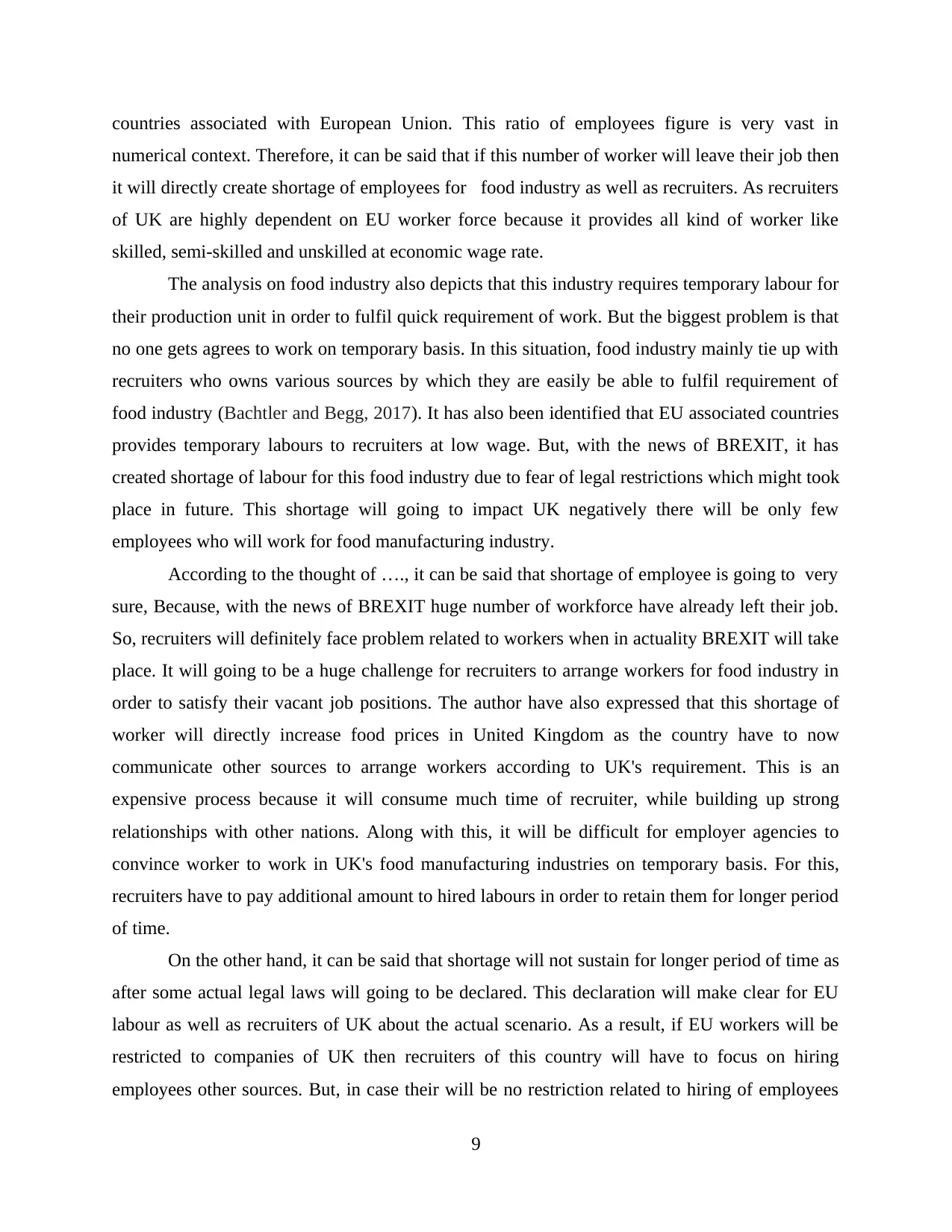
countries associated with European Union. This ratio of employees figure is very vast in
numerical context. Therefore, it can be said that if this number of worker will leave their job then
it will directly create shortage of employees for food industry as well as recruiters. As recruiters
of UK are highly dependent on EU worker force because it provides all kind of worker like
skilled, semi-skilled and unskilled at economic wage rate.
The analysis on food industry also depicts that this industry requires temporary labour for
their production unit in order to fulfil quick requirement of work. But the biggest problem is that
no one gets agrees to work on temporary basis. In this situation, food industry mainly tie up with
recruiters who owns various sources by which they are easily be able to fulfil requirement of
food industry (Bachtler and Begg, 2017). It has also been identified that EU associated countries
provides temporary labours to recruiters at low wage. But, with the news of BREXIT, it has
created shortage of labour for this food industry due to fear of legal restrictions which might took
place in future. This shortage will going to impact UK negatively there will be only few
employees who will work for food manufacturing industry.
According to the thought of …., it can be said that shortage of employee is going to very
sure, Because, with the news of BREXIT huge number of workforce have already left their job.
So, recruiters will definitely face problem related to workers when in actuality BREXIT will take
place. It will going to be a huge challenge for recruiters to arrange workers for food industry in
order to satisfy their vacant job positions. The author have also expressed that this shortage of
worker will directly increase food prices in United Kingdom as the country have to now
communicate other sources to arrange workers according to UK's requirement. This is an
expensive process because it will consume much time of recruiter, while building up strong
relationships with other nations. Along with this, it will be difficult for employer agencies to
convince worker to work in UK's food manufacturing industries on temporary basis. For this,
recruiters have to pay additional amount to hired labours in order to retain them for longer period
of time.
On the other hand, it can be said that shortage will not sustain for longer period of time as
after some actual legal laws will going to be declared. This declaration will make clear for EU
labour as well as recruiters of UK about the actual scenario. As a result, if EU workers will be
restricted to companies of UK then recruiters of this country will have to focus on hiring
employees other sources. But, in case their will be no restriction related to hiring of employees
9
numerical context. Therefore, it can be said that if this number of worker will leave their job then
it will directly create shortage of employees for food industry as well as recruiters. As recruiters
of UK are highly dependent on EU worker force because it provides all kind of worker like
skilled, semi-skilled and unskilled at economic wage rate.
The analysis on food industry also depicts that this industry requires temporary labour for
their production unit in order to fulfil quick requirement of work. But the biggest problem is that
no one gets agrees to work on temporary basis. In this situation, food industry mainly tie up with
recruiters who owns various sources by which they are easily be able to fulfil requirement of
food industry (Bachtler and Begg, 2017). It has also been identified that EU associated countries
provides temporary labours to recruiters at low wage. But, with the news of BREXIT, it has
created shortage of labour for this food industry due to fear of legal restrictions which might took
place in future. This shortage will going to impact UK negatively there will be only few
employees who will work for food manufacturing industry.
According to the thought of …., it can be said that shortage of employee is going to very
sure, Because, with the news of BREXIT huge number of workforce have already left their job.
So, recruiters will definitely face problem related to workers when in actuality BREXIT will take
place. It will going to be a huge challenge for recruiters to arrange workers for food industry in
order to satisfy their vacant job positions. The author have also expressed that this shortage of
worker will directly increase food prices in United Kingdom as the country have to now
communicate other sources to arrange workers according to UK's requirement. This is an
expensive process because it will consume much time of recruiter, while building up strong
relationships with other nations. Along with this, it will be difficult for employer agencies to
convince worker to work in UK's food manufacturing industries on temporary basis. For this,
recruiters have to pay additional amount to hired labours in order to retain them for longer period
of time.
On the other hand, it can be said that shortage will not sustain for longer period of time as
after some actual legal laws will going to be declared. This declaration will make clear for EU
labour as well as recruiters of UK about the actual scenario. As a result, if EU workers will be
restricted to companies of UK then recruiters of this country will have to focus on hiring
employees other sources. But, in case their will be no restriction related to hiring of employees
9
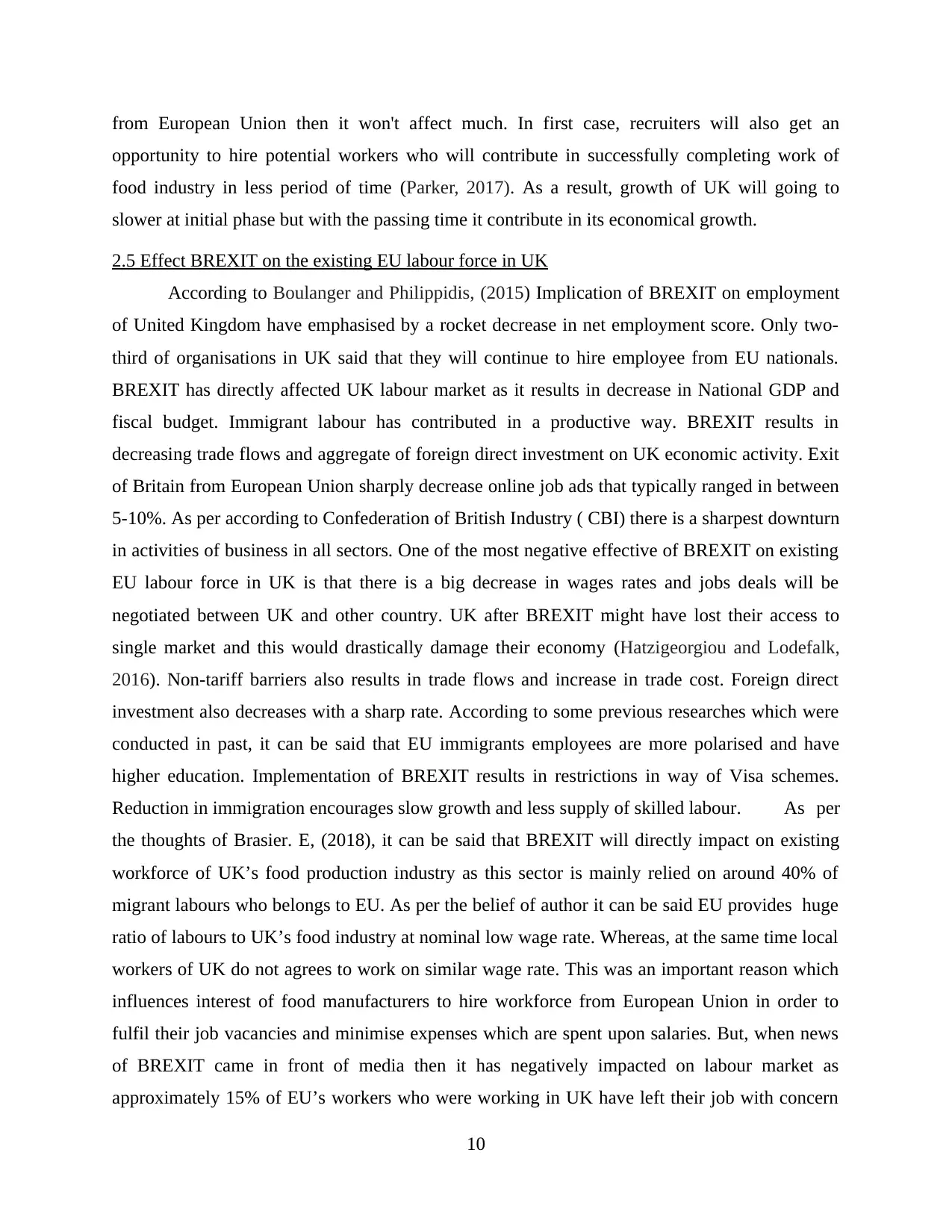
from European Union then it won't affect much. In first case, recruiters will also get an
opportunity to hire potential workers who will contribute in successfully completing work of
food industry in less period of time (Parker, 2017). As a result, growth of UK will going to
slower at initial phase but with the passing time it contribute in its economical growth.
2.5 Effect BREXIT on the existing EU labour force in UK
According to Boulanger and Philippidis, (2015) Implication of BREXIT on employment
of United Kingdom have emphasised by a rocket decrease in net employment score. Only two-
third of organisations in UK said that they will continue to hire employee from EU nationals.
BREXIT has directly affected UK labour market as it results in decrease in National GDP and
fiscal budget. Immigrant labour has contributed in a productive way. BREXIT results in
decreasing trade flows and aggregate of foreign direct investment on UK economic activity. Exit
of Britain from European Union sharply decrease online job ads that typically ranged in between
5-10%. As per according to Confederation of British Industry ( CBI) there is a sharpest downturn
in activities of business in all sectors. One of the most negative effective of BREXIT on existing
EU labour force in UK is that there is a big decrease in wages rates and jobs deals will be
negotiated between UK and other country. UK after BREXIT might have lost their access to
single market and this would drastically damage their economy (Hatzigeorgiou and Lodefalk,
2016). Non-tariff barriers also results in trade flows and increase in trade cost. Foreign direct
investment also decreases with a sharp rate. According to some previous researches which were
conducted in past, it can be said that EU immigrants employees are more polarised and have
higher education. Implementation of BREXIT results in restrictions in way of Visa schemes.
Reduction in immigration encourages slow growth and less supply of skilled labour. As per
the thoughts of Brasier. E, (2018), it can be said that BREXIT will directly impact on existing
workforce of UK’s food production industry as this sector is mainly relied on around 40% of
migrant labours who belongs to EU. As per the belief of author it can be said EU provides huge
ratio of labours to UK’s food industry at nominal low wage rate. Whereas, at the same time local
workers of UK do not agrees to work on similar wage rate. This was an important reason which
influences interest of food manufacturers to hire workforce from European Union in order to
fulfil their job vacancies and minimise expenses which are spent upon salaries. But, when news
of BREXIT came in front of media then it has negatively impacted on labour market as
approximately 15% of EU’s workers who were working in UK have left their job with concern
10
opportunity to hire potential workers who will contribute in successfully completing work of
food industry in less period of time (Parker, 2017). As a result, growth of UK will going to
slower at initial phase but with the passing time it contribute in its economical growth.
2.5 Effect BREXIT on the existing EU labour force in UK
According to Boulanger and Philippidis, (2015) Implication of BREXIT on employment
of United Kingdom have emphasised by a rocket decrease in net employment score. Only two-
third of organisations in UK said that they will continue to hire employee from EU nationals.
BREXIT has directly affected UK labour market as it results in decrease in National GDP and
fiscal budget. Immigrant labour has contributed in a productive way. BREXIT results in
decreasing trade flows and aggregate of foreign direct investment on UK economic activity. Exit
of Britain from European Union sharply decrease online job ads that typically ranged in between
5-10%. As per according to Confederation of British Industry ( CBI) there is a sharpest downturn
in activities of business in all sectors. One of the most negative effective of BREXIT on existing
EU labour force in UK is that there is a big decrease in wages rates and jobs deals will be
negotiated between UK and other country. UK after BREXIT might have lost their access to
single market and this would drastically damage their economy (Hatzigeorgiou and Lodefalk,
2016). Non-tariff barriers also results in trade flows and increase in trade cost. Foreign direct
investment also decreases with a sharp rate. According to some previous researches which were
conducted in past, it can be said that EU immigrants employees are more polarised and have
higher education. Implementation of BREXIT results in restrictions in way of Visa schemes.
Reduction in immigration encourages slow growth and less supply of skilled labour. As per
the thoughts of Brasier. E, (2018), it can be said that BREXIT will directly impact on existing
workforce of UK’s food production industry as this sector is mainly relied on around 40% of
migrant labours who belongs to EU. As per the belief of author it can be said EU provides huge
ratio of labours to UK’s food industry at nominal low wage rate. Whereas, at the same time local
workers of UK do not agrees to work on similar wage rate. This was an important reason which
influences interest of food manufacturers to hire workforce from European Union in order to
fulfil their job vacancies and minimise expenses which are spent upon salaries. But, when news
of BREXIT came in front of media then it has negatively impacted on labour market as
approximately 15% of EU’s workers who were working in UK have left their job with concern
10
Paraphrase This Document
Need a fresh take? Get an instant paraphrase of this document with our AI Paraphraser
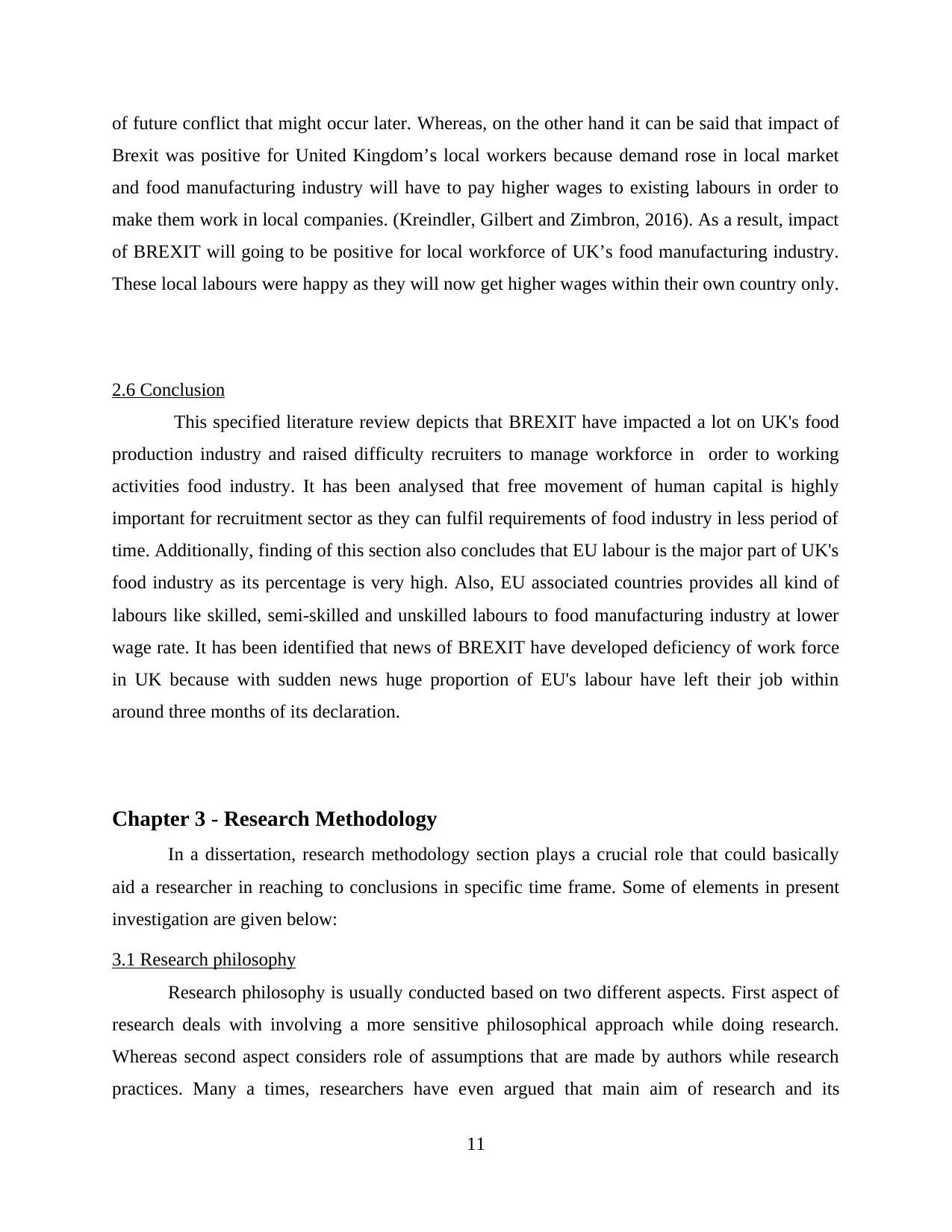
of future conflict that might occur later. Whereas, on the other hand it can be said that impact of
Brexit was positive for United Kingdom’s local workers because demand rose in local market
and food manufacturing industry will have to pay higher wages to existing labours in order to
make them work in local companies. (Kreindler, Gilbert and Zimbron, 2016). As a result, impact
of BREXIT will going to be positive for local workforce of UK’s food manufacturing industry.
These local labours were happy as they will now get higher wages within their own country only.
2.6 Conclusion
This specified literature review depicts that BREXIT have impacted a lot on UK's food
production industry and raised difficulty recruiters to manage workforce in order to working
activities food industry. It has been analysed that free movement of human capital is highly
important for recruitment sector as they can fulfil requirements of food industry in less period of
time. Additionally, finding of this section also concludes that EU labour is the major part of UK's
food industry as its percentage is very high. Also, EU associated countries provides all kind of
labours like skilled, semi-skilled and unskilled labours to food manufacturing industry at lower
wage rate. It has been identified that news of BREXIT have developed deficiency of work force
in UK because with sudden news huge proportion of EU's labour have left their job within
around three months of its declaration.
Chapter 3 - Research Methodology
In a dissertation, research methodology section plays a crucial role that could basically
aid a researcher in reaching to conclusions in specific time frame. Some of elements in present
investigation are given below:
3.1 Research philosophy
Research philosophy is usually conducted based on two different aspects. First aspect of
research deals with involving a more sensitive philosophical approach while doing research.
Whereas second aspect considers role of assumptions that are made by authors while research
practices. Many a times, researchers have even argued that main aim of research and its
11
Brexit was positive for United Kingdom’s local workers because demand rose in local market
and food manufacturing industry will have to pay higher wages to existing labours in order to
make them work in local companies. (Kreindler, Gilbert and Zimbron, 2016). As a result, impact
of BREXIT will going to be positive for local workforce of UK’s food manufacturing industry.
These local labours were happy as they will now get higher wages within their own country only.
2.6 Conclusion
This specified literature review depicts that BREXIT have impacted a lot on UK's food
production industry and raised difficulty recruiters to manage workforce in order to working
activities food industry. It has been analysed that free movement of human capital is highly
important for recruitment sector as they can fulfil requirements of food industry in less period of
time. Additionally, finding of this section also concludes that EU labour is the major part of UK's
food industry as its percentage is very high. Also, EU associated countries provides all kind of
labours like skilled, semi-skilled and unskilled labours to food manufacturing industry at lower
wage rate. It has been identified that news of BREXIT have developed deficiency of work force
in UK because with sudden news huge proportion of EU's labour have left their job within
around three months of its declaration.
Chapter 3 - Research Methodology
In a dissertation, research methodology section plays a crucial role that could basically
aid a researcher in reaching to conclusions in specific time frame. Some of elements in present
investigation are given below:
3.1 Research philosophy
Research philosophy is usually conducted based on two different aspects. First aspect of
research deals with involving a more sensitive philosophical approach while doing research.
Whereas second aspect considers role of assumptions that are made by authors while research
practices. Many a times, researchers have even argued that main aim of research and its
11
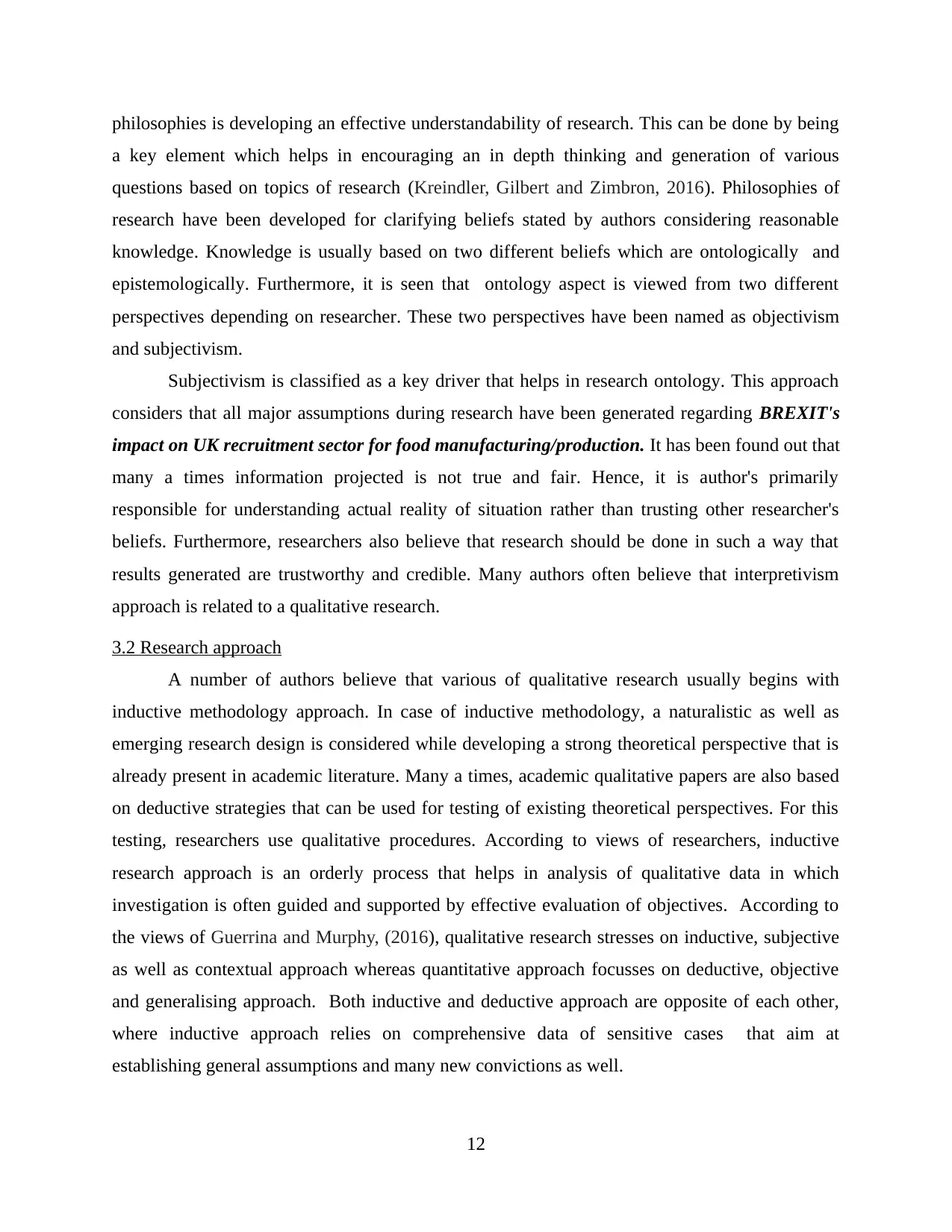
philosophies is developing an effective understandability of research. This can be done by being
a key element which helps in encouraging an in depth thinking and generation of various
questions based on topics of research (Kreindler, Gilbert and Zimbron, 2016). Philosophies of
research have been developed for clarifying beliefs stated by authors considering reasonable
knowledge. Knowledge is usually based on two different beliefs which are ontologically and
epistemologically. Furthermore, it is seen that ontology aspect is viewed from two different
perspectives depending on researcher. These two perspectives have been named as objectivism
and subjectivism.
Subjectivism is classified as a key driver that helps in research ontology. This approach
considers that all major assumptions during research have been generated regarding BREXIT's
impact on UK recruitment sector for food manufacturing/production. It has been found out that
many a times information projected is not true and fair. Hence, it is author's primarily
responsible for understanding actual reality of situation rather than trusting other researcher's
beliefs. Furthermore, researchers also believe that research should be done in such a way that
results generated are trustworthy and credible. Many authors often believe that interpretivism
approach is related to a qualitative research.
3.2 Research approach
A number of authors believe that various of qualitative research usually begins with
inductive methodology approach. In case of inductive methodology, a naturalistic as well as
emerging research design is considered while developing a strong theoretical perspective that is
already present in academic literature. Many a times, academic qualitative papers are also based
on deductive strategies that can be used for testing of existing theoretical perspectives. For this
testing, researchers use qualitative procedures. According to views of researchers, inductive
research approach is an orderly process that helps in analysis of qualitative data in which
investigation is often guided and supported by effective evaluation of objectives. According to
the views of Guerrina and Murphy, (2016), qualitative research stresses on inductive, subjective
as well as contextual approach whereas quantitative approach focusses on deductive, objective
and generalising approach. Both inductive and deductive approach are opposite of each other,
where inductive approach relies on comprehensive data of sensitive cases that aim at
establishing general assumptions and many new convictions as well.
12
a key element which helps in encouraging an in depth thinking and generation of various
questions based on topics of research (Kreindler, Gilbert and Zimbron, 2016). Philosophies of
research have been developed for clarifying beliefs stated by authors considering reasonable
knowledge. Knowledge is usually based on two different beliefs which are ontologically and
epistemologically. Furthermore, it is seen that ontology aspect is viewed from two different
perspectives depending on researcher. These two perspectives have been named as objectivism
and subjectivism.
Subjectivism is classified as a key driver that helps in research ontology. This approach
considers that all major assumptions during research have been generated regarding BREXIT's
impact on UK recruitment sector for food manufacturing/production. It has been found out that
many a times information projected is not true and fair. Hence, it is author's primarily
responsible for understanding actual reality of situation rather than trusting other researcher's
beliefs. Furthermore, researchers also believe that research should be done in such a way that
results generated are trustworthy and credible. Many authors often believe that interpretivism
approach is related to a qualitative research.
3.2 Research approach
A number of authors believe that various of qualitative research usually begins with
inductive methodology approach. In case of inductive methodology, a naturalistic as well as
emerging research design is considered while developing a strong theoretical perspective that is
already present in academic literature. Many a times, academic qualitative papers are also based
on deductive strategies that can be used for testing of existing theoretical perspectives. For this
testing, researchers use qualitative procedures. According to views of researchers, inductive
research approach is an orderly process that helps in analysis of qualitative data in which
investigation is often guided and supported by effective evaluation of objectives. According to
the views of Guerrina and Murphy, (2016), qualitative research stresses on inductive, subjective
as well as contextual approach whereas quantitative approach focusses on deductive, objective
and generalising approach. Both inductive and deductive approach are opposite of each other,
where inductive approach relies on comprehensive data of sensitive cases that aim at
establishing general assumptions and many new convictions as well.
12
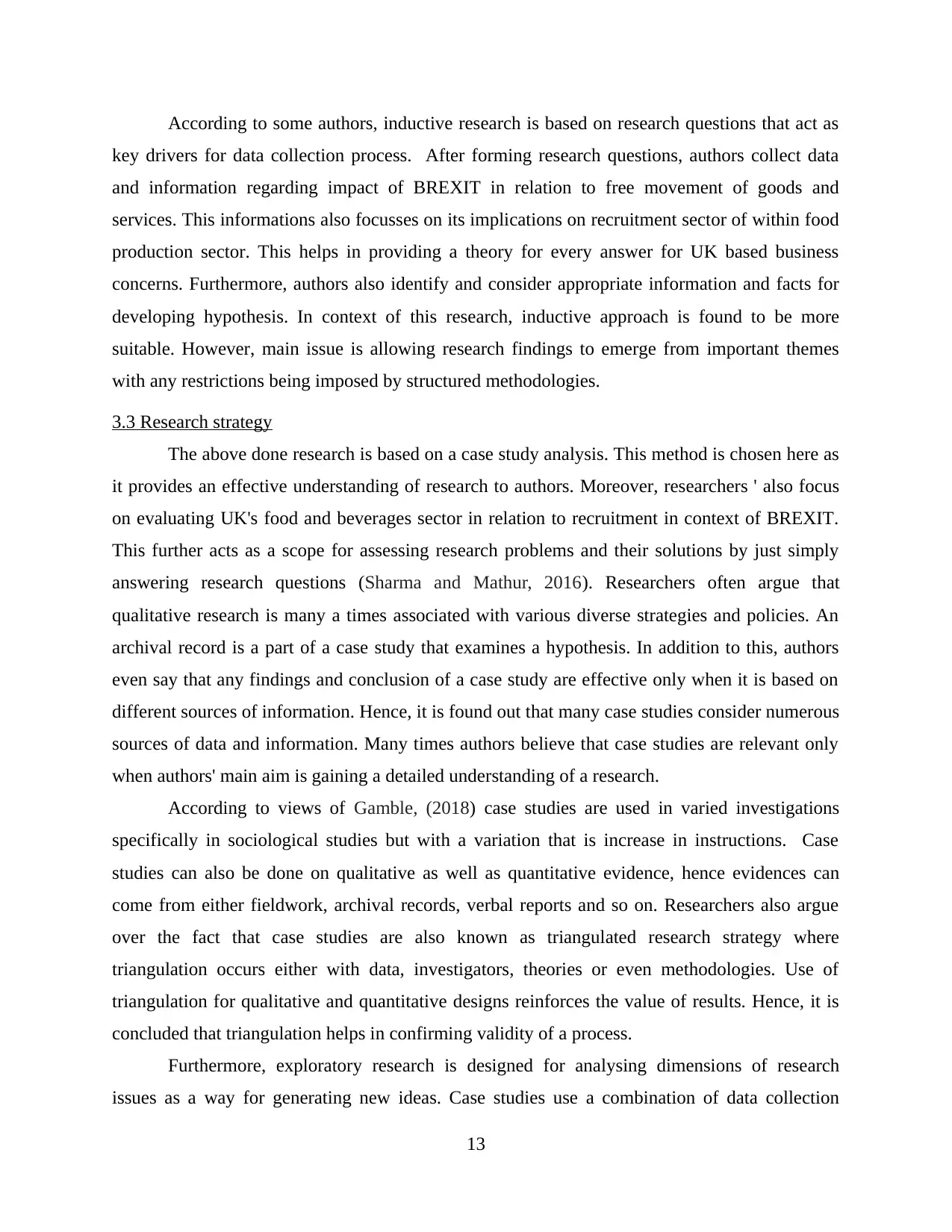
According to some authors, inductive research is based on research questions that act as
key drivers for data collection process. After forming research questions, authors collect data
and information regarding impact of BREXIT in relation to free movement of goods and
services. This informations also focusses on its implications on recruitment sector of within food
production sector. This helps in providing a theory for every answer for UK based business
concerns. Furthermore, authors also identify and consider appropriate information and facts for
developing hypothesis. In context of this research, inductive approach is found to be more
suitable. However, main issue is allowing research findings to emerge from important themes
with any restrictions being imposed by structured methodologies.
3.3 Research strategy
The above done research is based on a case study analysis. This method is chosen here as
it provides an effective understanding of research to authors. Moreover, researchers ' also focus
on evaluating UK's food and beverages sector in relation to recruitment in context of BREXIT.
This further acts as a scope for assessing research problems and their solutions by just simply
answering research questions (Sharma and Mathur, 2016). Researchers often argue that
qualitative research is many a times associated with various diverse strategies and policies. An
archival record is a part of a case study that examines a hypothesis. In addition to this, authors
even say that any findings and conclusion of a case study are effective only when it is based on
different sources of information. Hence, it is found out that many case studies consider numerous
sources of data and information. Many times authors believe that case studies are relevant only
when authors' main aim is gaining a detailed understanding of a research.
According to views of Gamble, (2018) case studies are used in varied investigations
specifically in sociological studies but with a variation that is increase in instructions. Case
studies can also be done on qualitative as well as quantitative evidence, hence evidences can
come from either fieldwork, archival records, verbal reports and so on. Researchers also argue
over the fact that case studies are also known as triangulated research strategy where
triangulation occurs either with data, investigators, theories or even methodologies. Use of
triangulation for qualitative and quantitative designs reinforces the value of results. Hence, it is
concluded that triangulation helps in confirming validity of a process.
Furthermore, exploratory research is designed for analysing dimensions of research
issues as a way for generating new ideas. Case studies use a combination of data collection
13
key drivers for data collection process. After forming research questions, authors collect data
and information regarding impact of BREXIT in relation to free movement of goods and
services. This informations also focusses on its implications on recruitment sector of within food
production sector. This helps in providing a theory for every answer for UK based business
concerns. Furthermore, authors also identify and consider appropriate information and facts for
developing hypothesis. In context of this research, inductive approach is found to be more
suitable. However, main issue is allowing research findings to emerge from important themes
with any restrictions being imposed by structured methodologies.
3.3 Research strategy
The above done research is based on a case study analysis. This method is chosen here as
it provides an effective understanding of research to authors. Moreover, researchers ' also focus
on evaluating UK's food and beverages sector in relation to recruitment in context of BREXIT.
This further acts as a scope for assessing research problems and their solutions by just simply
answering research questions (Sharma and Mathur, 2016). Researchers often argue that
qualitative research is many a times associated with various diverse strategies and policies. An
archival record is a part of a case study that examines a hypothesis. In addition to this, authors
even say that any findings and conclusion of a case study are effective only when it is based on
different sources of information. Hence, it is found out that many case studies consider numerous
sources of data and information. Many times authors believe that case studies are relevant only
when authors' main aim is gaining a detailed understanding of a research.
According to views of Gamble, (2018) case studies are used in varied investigations
specifically in sociological studies but with a variation that is increase in instructions. Case
studies can also be done on qualitative as well as quantitative evidence, hence evidences can
come from either fieldwork, archival records, verbal reports and so on. Researchers also argue
over the fact that case studies are also known as triangulated research strategy where
triangulation occurs either with data, investigators, theories or even methodologies. Use of
triangulation for qualitative and quantitative designs reinforces the value of results. Hence, it is
concluded that triangulation helps in confirming validity of a process.
Furthermore, exploratory research is designed for analysing dimensions of research
issues as a way for generating new ideas. Case studies use a combination of data collection
13
Secure Best Marks with AI Grader
Need help grading? Try our AI Grader for instant feedback on your assignments.
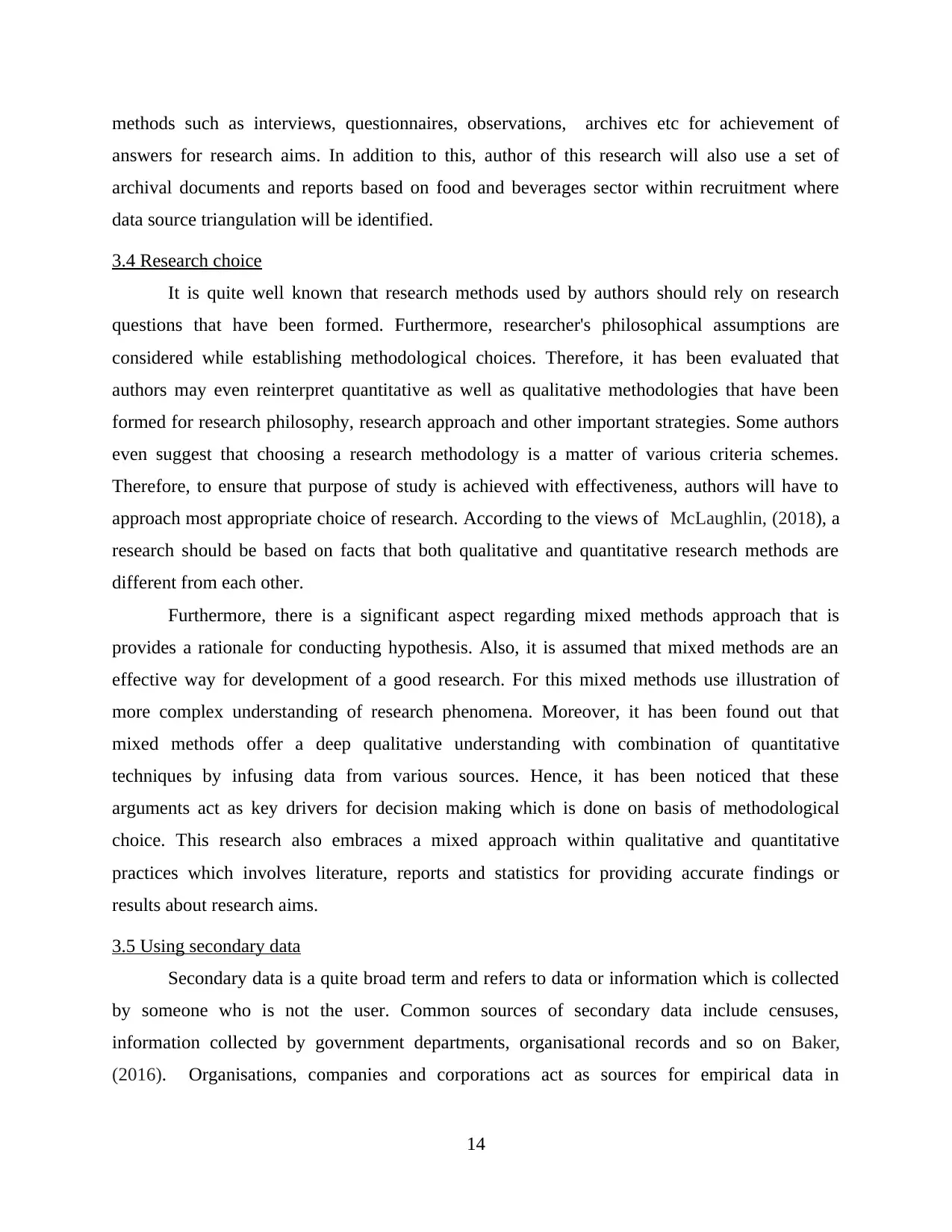
methods such as interviews, questionnaires, observations, archives etc for achievement of
answers for research aims. In addition to this, author of this research will also use a set of
archival documents and reports based on food and beverages sector within recruitment where
data source triangulation will be identified.
3.4 Research choice
It is quite well known that research methods used by authors should rely on research
questions that have been formed. Furthermore, researcher's philosophical assumptions are
considered while establishing methodological choices. Therefore, it has been evaluated that
authors may even reinterpret quantitative as well as qualitative methodologies that have been
formed for research philosophy, research approach and other important strategies. Some authors
even suggest that choosing a research methodology is a matter of various criteria schemes.
Therefore, to ensure that purpose of study is achieved with effectiveness, authors will have to
approach most appropriate choice of research. According to the views of McLaughlin, (2018), a
research should be based on facts that both qualitative and quantitative research methods are
different from each other.
Furthermore, there is a significant aspect regarding mixed methods approach that is
provides a rationale for conducting hypothesis. Also, it is assumed that mixed methods are an
effective way for development of a good research. For this mixed methods use illustration of
more complex understanding of research phenomena. Moreover, it has been found out that
mixed methods offer a deep qualitative understanding with combination of quantitative
techniques by infusing data from various sources. Hence, it has been noticed that these
arguments act as key drivers for decision making which is done on basis of methodological
choice. This research also embraces a mixed approach within qualitative and quantitative
practices which involves literature, reports and statistics for providing accurate findings or
results about research aims.
3.5 Using secondary data
Secondary data is a quite broad term and refers to data or information which is collected
by someone who is not the user. Common sources of secondary data include censuses,
information collected by government departments, organisational records and so on Baker,
(2016). Organisations, companies and corporations act as sources for empirical data in
14
answers for research aims. In addition to this, author of this research will also use a set of
archival documents and reports based on food and beverages sector within recruitment where
data source triangulation will be identified.
3.4 Research choice
It is quite well known that research methods used by authors should rely on research
questions that have been formed. Furthermore, researcher's philosophical assumptions are
considered while establishing methodological choices. Therefore, it has been evaluated that
authors may even reinterpret quantitative as well as qualitative methodologies that have been
formed for research philosophy, research approach and other important strategies. Some authors
even suggest that choosing a research methodology is a matter of various criteria schemes.
Therefore, to ensure that purpose of study is achieved with effectiveness, authors will have to
approach most appropriate choice of research. According to the views of McLaughlin, (2018), a
research should be based on facts that both qualitative and quantitative research methods are
different from each other.
Furthermore, there is a significant aspect regarding mixed methods approach that is
provides a rationale for conducting hypothesis. Also, it is assumed that mixed methods are an
effective way for development of a good research. For this mixed methods use illustration of
more complex understanding of research phenomena. Moreover, it has been found out that
mixed methods offer a deep qualitative understanding with combination of quantitative
techniques by infusing data from various sources. Hence, it has been noticed that these
arguments act as key drivers for decision making which is done on basis of methodological
choice. This research also embraces a mixed approach within qualitative and quantitative
practices which involves literature, reports and statistics for providing accurate findings or
results about research aims.
3.5 Using secondary data
Secondary data is a quite broad term and refers to data or information which is collected
by someone who is not the user. Common sources of secondary data include censuses,
information collected by government departments, organisational records and so on Baker,
(2016). Organisations, companies and corporations act as sources for empirical data in
14
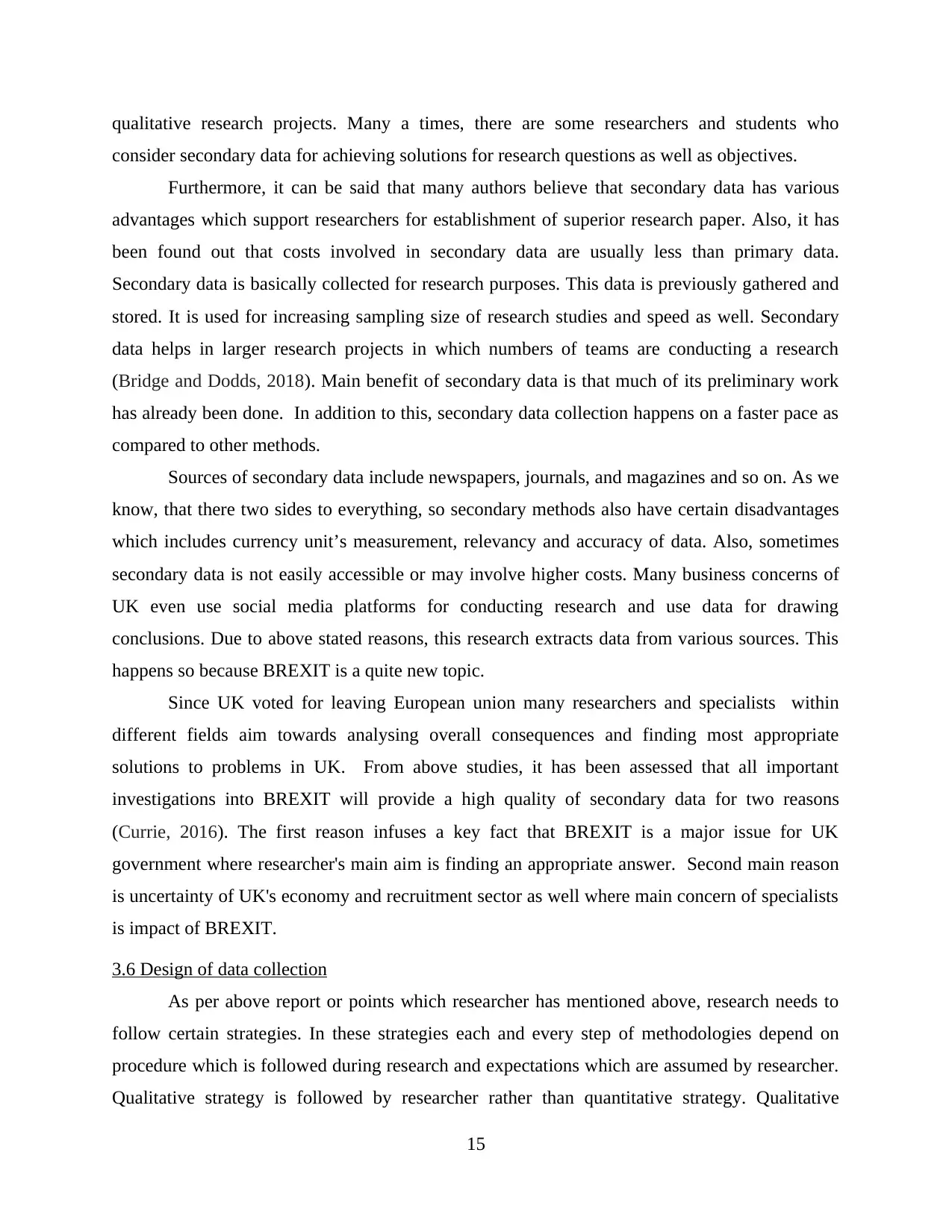
qualitative research projects. Many a times, there are some researchers and students who
consider secondary data for achieving solutions for research questions as well as objectives.
Furthermore, it can be said that many authors believe that secondary data has various
advantages which support researchers for establishment of superior research paper. Also, it has
been found out that costs involved in secondary data are usually less than primary data.
Secondary data is basically collected for research purposes. This data is previously gathered and
stored. It is used for increasing sampling size of research studies and speed as well. Secondary
data helps in larger research projects in which numbers of teams are conducting a research
(Bridge and Dodds, 2018). Main benefit of secondary data is that much of its preliminary work
has already been done. In addition to this, secondary data collection happens on a faster pace as
compared to other methods.
Sources of secondary data include newspapers, journals, and magazines and so on. As we
know, that there two sides to everything, so secondary methods also have certain disadvantages
which includes currency unit’s measurement, relevancy and accuracy of data. Also, sometimes
secondary data is not easily accessible or may involve higher costs. Many business concerns of
UK even use social media platforms for conducting research and use data for drawing
conclusions. Due to above stated reasons, this research extracts data from various sources. This
happens so because BREXIT is a quite new topic.
Since UK voted for leaving European union many researchers and specialists within
different fields aim towards analysing overall consequences and finding most appropriate
solutions to problems in UK. From above studies, it has been assessed that all important
investigations into BREXIT will provide a high quality of secondary data for two reasons
(Currie, 2016). The first reason infuses a key fact that BREXIT is a major issue for UK
government where researcher's main aim is finding an appropriate answer. Second main reason
is uncertainty of UK's economy and recruitment sector as well where main concern of specialists
is impact of BREXIT.
3.6 Design of data collection
As per above report or points which researcher has mentioned above, research needs to
follow certain strategies. In these strategies each and every step of methodologies depend on
procedure which is followed during research and expectations which are assumed by researcher.
Qualitative strategy is followed by researcher rather than quantitative strategy. Qualitative
15
consider secondary data for achieving solutions for research questions as well as objectives.
Furthermore, it can be said that many authors believe that secondary data has various
advantages which support researchers for establishment of superior research paper. Also, it has
been found out that costs involved in secondary data are usually less than primary data.
Secondary data is basically collected for research purposes. This data is previously gathered and
stored. It is used for increasing sampling size of research studies and speed as well. Secondary
data helps in larger research projects in which numbers of teams are conducting a research
(Bridge and Dodds, 2018). Main benefit of secondary data is that much of its preliminary work
has already been done. In addition to this, secondary data collection happens on a faster pace as
compared to other methods.
Sources of secondary data include newspapers, journals, and magazines and so on. As we
know, that there two sides to everything, so secondary methods also have certain disadvantages
which includes currency unit’s measurement, relevancy and accuracy of data. Also, sometimes
secondary data is not easily accessible or may involve higher costs. Many business concerns of
UK even use social media platforms for conducting research and use data for drawing
conclusions. Due to above stated reasons, this research extracts data from various sources. This
happens so because BREXIT is a quite new topic.
Since UK voted for leaving European union many researchers and specialists within
different fields aim towards analysing overall consequences and finding most appropriate
solutions to problems in UK. From above studies, it has been assessed that all important
investigations into BREXIT will provide a high quality of secondary data for two reasons
(Currie, 2016). The first reason infuses a key fact that BREXIT is a major issue for UK
government where researcher's main aim is finding an appropriate answer. Second main reason
is uncertainty of UK's economy and recruitment sector as well where main concern of specialists
is impact of BREXIT.
3.6 Design of data collection
As per above report or points which researcher has mentioned above, research needs to
follow certain strategies. In these strategies each and every step of methodologies depend on
procedure which is followed during research and expectations which are assumed by researcher.
Qualitative strategy is followed by researcher rather than quantitative strategy. Qualitative
15
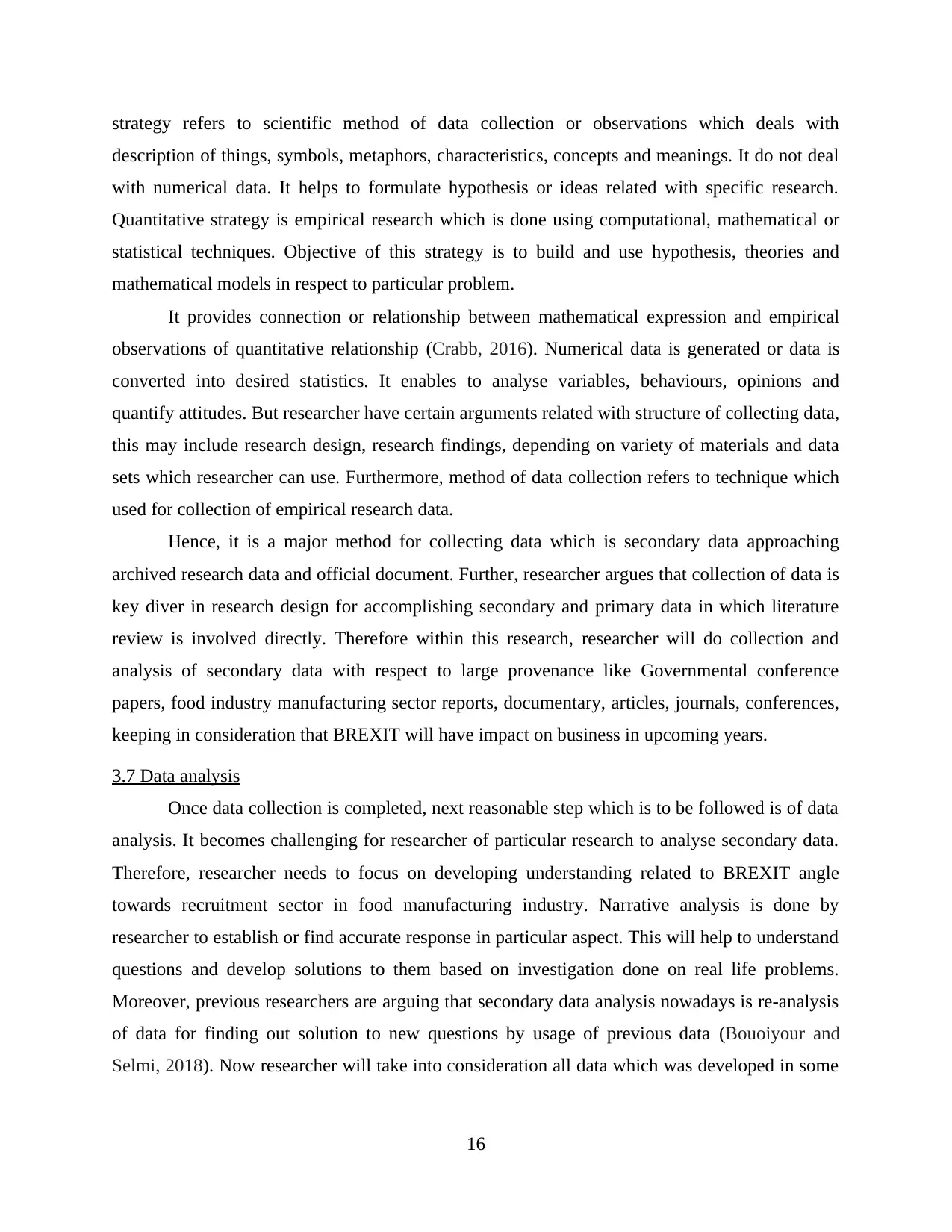
strategy refers to scientific method of data collection or observations which deals with
description of things, symbols, metaphors, characteristics, concepts and meanings. It do not deal
with numerical data. It helps to formulate hypothesis or ideas related with specific research.
Quantitative strategy is empirical research which is done using computational, mathematical or
statistical techniques. Objective of this strategy is to build and use hypothesis, theories and
mathematical models in respect to particular problem.
It provides connection or relationship between mathematical expression and empirical
observations of quantitative relationship (Crabb, 2016). Numerical data is generated or data is
converted into desired statistics. It enables to analyse variables, behaviours, opinions and
quantify attitudes. But researcher have certain arguments related with structure of collecting data,
this may include research design, research findings, depending on variety of materials and data
sets which researcher can use. Furthermore, method of data collection refers to technique which
used for collection of empirical research data.
Hence, it is a major method for collecting data which is secondary data approaching
archived research data and official document. Further, researcher argues that collection of data is
key diver in research design for accomplishing secondary and primary data in which literature
review is involved directly. Therefore within this research, researcher will do collection and
analysis of secondary data with respect to large provenance like Governmental conference
papers, food industry manufacturing sector reports, documentary, articles, journals, conferences,
keeping in consideration that BREXIT will have impact on business in upcoming years.
3.7 Data analysis
Once data collection is completed, next reasonable step which is to be followed is of data
analysis. It becomes challenging for researcher of particular research to analyse secondary data.
Therefore, researcher needs to focus on developing understanding related to BREXIT angle
towards recruitment sector in food manufacturing industry. Narrative analysis is done by
researcher to establish or find accurate response in particular aspect. This will help to understand
questions and develop solutions to them based on investigation done on real life problems.
Moreover, previous researchers are arguing that secondary data analysis nowadays is re-analysis
of data for finding out solution to new questions by usage of previous data (Bouoiyour and
Selmi, 2018). Now researcher will take into consideration all data which was developed in some
16
description of things, symbols, metaphors, characteristics, concepts and meanings. It do not deal
with numerical data. It helps to formulate hypothesis or ideas related with specific research.
Quantitative strategy is empirical research which is done using computational, mathematical or
statistical techniques. Objective of this strategy is to build and use hypothesis, theories and
mathematical models in respect to particular problem.
It provides connection or relationship between mathematical expression and empirical
observations of quantitative relationship (Crabb, 2016). Numerical data is generated or data is
converted into desired statistics. It enables to analyse variables, behaviours, opinions and
quantify attitudes. But researcher have certain arguments related with structure of collecting data,
this may include research design, research findings, depending on variety of materials and data
sets which researcher can use. Furthermore, method of data collection refers to technique which
used for collection of empirical research data.
Hence, it is a major method for collecting data which is secondary data approaching
archived research data and official document. Further, researcher argues that collection of data is
key diver in research design for accomplishing secondary and primary data in which literature
review is involved directly. Therefore within this research, researcher will do collection and
analysis of secondary data with respect to large provenance like Governmental conference
papers, food industry manufacturing sector reports, documentary, articles, journals, conferences,
keeping in consideration that BREXIT will have impact on business in upcoming years.
3.7 Data analysis
Once data collection is completed, next reasonable step which is to be followed is of data
analysis. It becomes challenging for researcher of particular research to analyse secondary data.
Therefore, researcher needs to focus on developing understanding related to BREXIT angle
towards recruitment sector in food manufacturing industry. Narrative analysis is done by
researcher to establish or find accurate response in particular aspect. This will help to understand
questions and develop solutions to them based on investigation done on real life problems.
Moreover, previous researchers are arguing that secondary data analysis nowadays is re-analysis
of data for finding out solution to new questions by usage of previous data (Bouoiyour and
Selmi, 2018). Now researcher will take into consideration all data which was developed in some
16
Paraphrase This Document
Need a fresh take? Get an instant paraphrase of this document with our AI Paraphraser
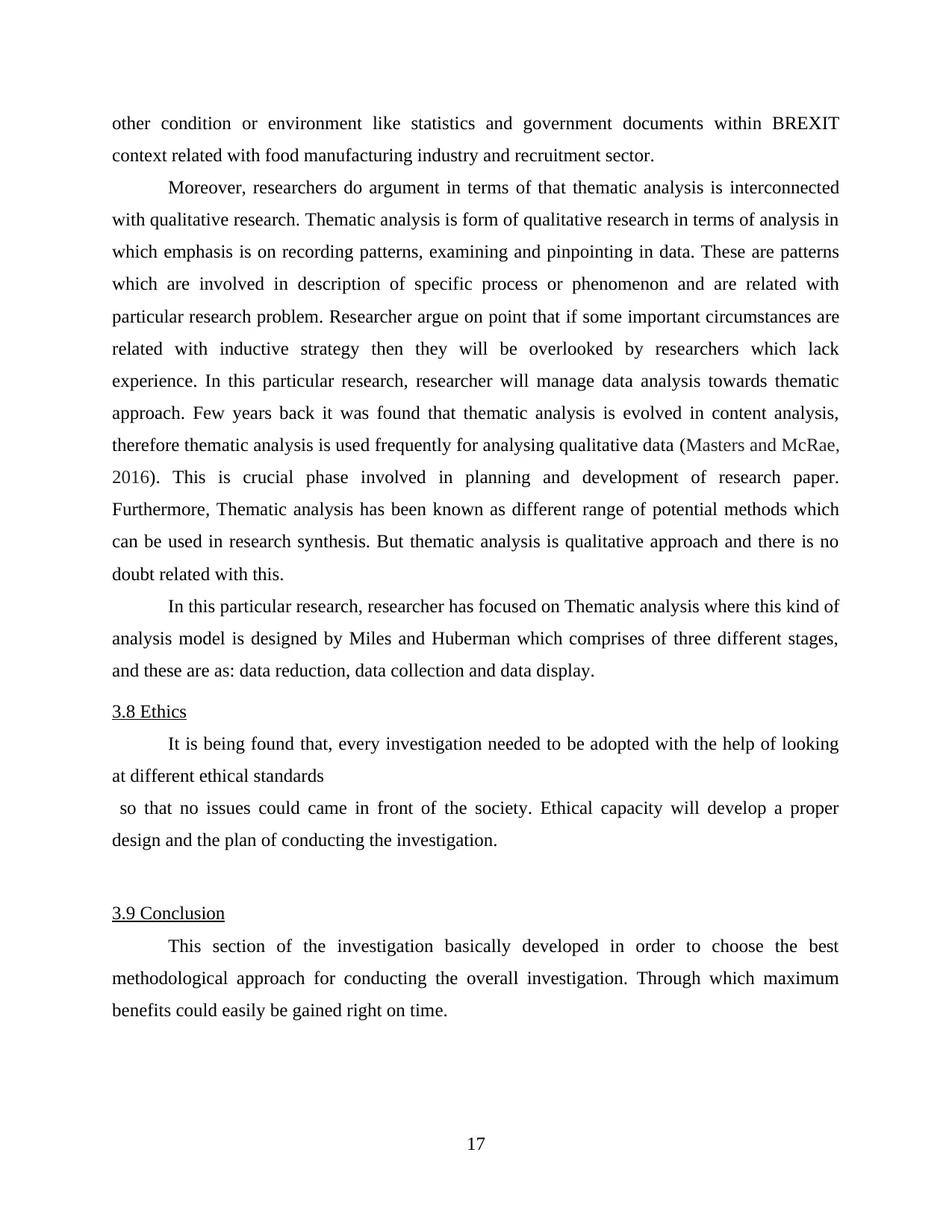
other condition or environment like statistics and government documents within BREXIT
context related with food manufacturing industry and recruitment sector.
Moreover, researchers do argument in terms of that thematic analysis is interconnected
with qualitative research. Thematic analysis is form of qualitative research in terms of analysis in
which emphasis is on recording patterns, examining and pinpointing in data. These are patterns
which are involved in description of specific process or phenomenon and are related with
particular research problem. Researcher argue on point that if some important circumstances are
related with inductive strategy then they will be overlooked by researchers which lack
experience. In this particular research, researcher will manage data analysis towards thematic
approach. Few years back it was found that thematic analysis is evolved in content analysis,
therefore thematic analysis is used frequently for analysing qualitative data (Masters and McRae,
2016). This is crucial phase involved in planning and development of research paper.
Furthermore, Thematic analysis has been known as different range of potential methods which
can be used in research synthesis. But thematic analysis is qualitative approach and there is no
doubt related with this.
In this particular research, researcher has focused on Thematic analysis where this kind of
analysis model is designed by Miles and Huberman which comprises of three different stages,
and these are as: data reduction, data collection and data display.
3.8 Ethics
It is being found that, every investigation needed to be adopted with the help of looking
at different ethical standards
so that no issues could came in front of the society. Ethical capacity will develop a proper
design and the plan of conducting the investigation.
3.9 Conclusion
This section of the investigation basically developed in order to choose the best
methodological approach for conducting the overall investigation. Through which maximum
benefits could easily be gained right on time.
17
context related with food manufacturing industry and recruitment sector.
Moreover, researchers do argument in terms of that thematic analysis is interconnected
with qualitative research. Thematic analysis is form of qualitative research in terms of analysis in
which emphasis is on recording patterns, examining and pinpointing in data. These are patterns
which are involved in description of specific process or phenomenon and are related with
particular research problem. Researcher argue on point that if some important circumstances are
related with inductive strategy then they will be overlooked by researchers which lack
experience. In this particular research, researcher will manage data analysis towards thematic
approach. Few years back it was found that thematic analysis is evolved in content analysis,
therefore thematic analysis is used frequently for analysing qualitative data (Masters and McRae,
2016). This is crucial phase involved in planning and development of research paper.
Furthermore, Thematic analysis has been known as different range of potential methods which
can be used in research synthesis. But thematic analysis is qualitative approach and there is no
doubt related with this.
In this particular research, researcher has focused on Thematic analysis where this kind of
analysis model is designed by Miles and Huberman which comprises of three different stages,
and these are as: data reduction, data collection and data display.
3.8 Ethics
It is being found that, every investigation needed to be adopted with the help of looking
at different ethical standards
so that no issues could came in front of the society. Ethical capacity will develop a proper
design and the plan of conducting the investigation.
3.9 Conclusion
This section of the investigation basically developed in order to choose the best
methodological approach for conducting the overall investigation. Through which maximum
benefits could easily be gained right on time.
17
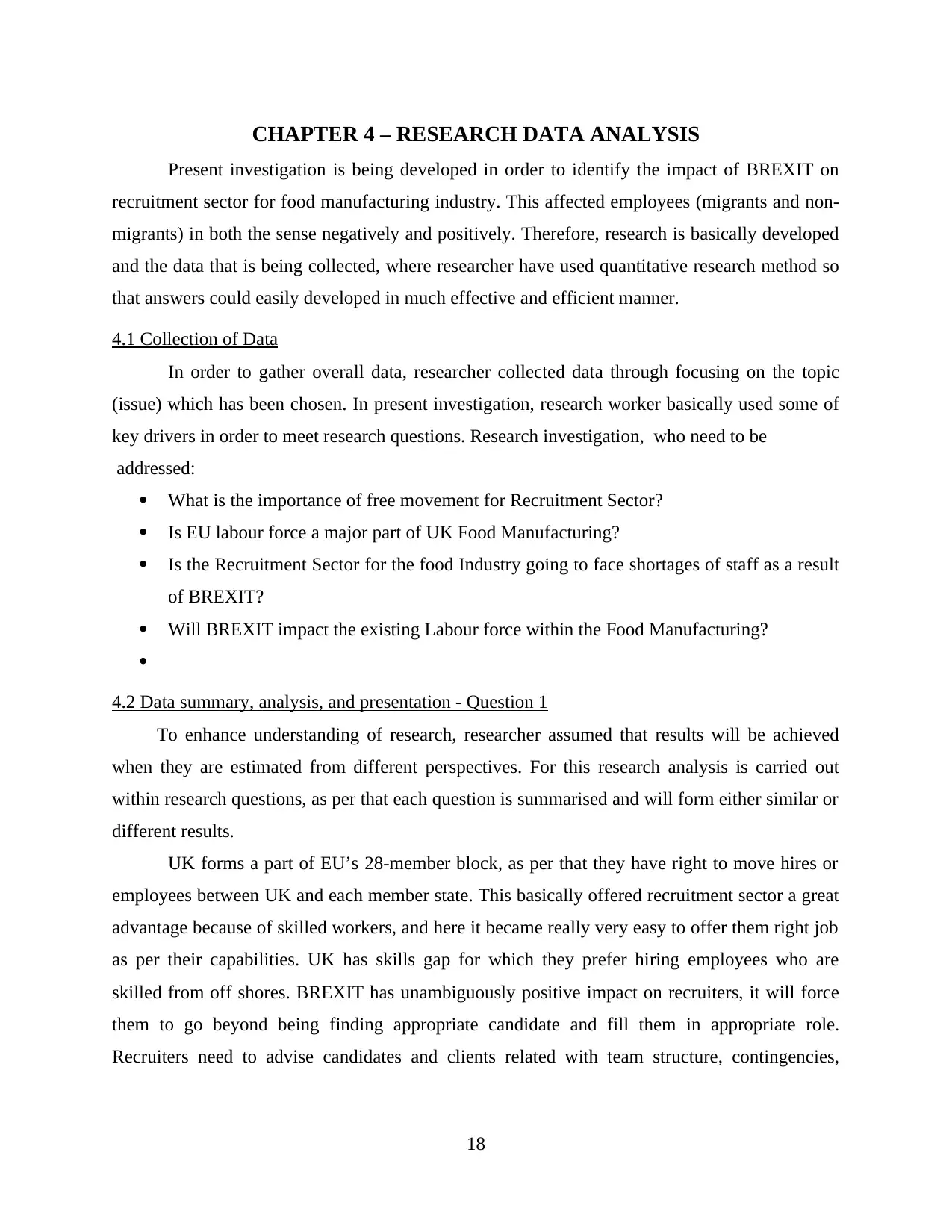
CHAPTER 4 – RESEARCH DATA ANALYSIS
Present investigation is being developed in order to identify the impact of BREXIT on
recruitment sector for food manufacturing industry. This affected employees (migrants and non-
migrants) in both the sense negatively and positively. Therefore, research is basically developed
and the data that is being collected, where researcher have used quantitative research method so
that answers could easily developed in much effective and efficient manner.
4.1 Collection of Data
In order to gather overall data, researcher collected data through focusing on the topic
(issue) which has been chosen. In present investigation, research worker basically used some of
key drivers in order to meet research questions. Research investigation, who need to be
addressed:
What is the importance of free movement for Recruitment Sector?
Is EU labour force a major part of UK Food Manufacturing?
Is the Recruitment Sector for the food Industry going to face shortages of staff as a result
of BREXIT?
Will BREXIT impact the existing Labour force within the Food Manufacturing?
4.2 Data summary, analysis, and presentation - Question 1
To enhance understanding of research, researcher assumed that results will be achieved
when they are estimated from different perspectives. For this research analysis is carried out
within research questions, as per that each question is summarised and will form either similar or
different results.
UK forms a part of EU’s 28-member block, as per that they have right to move hires or
employees between UK and each member state. This basically offered recruitment sector a great
advantage because of skilled workers, and here it became really very easy to offer them right job
as per their capabilities. UK has skills gap for which they prefer hiring employees who are
skilled from off shores. BREXIT has unambiguously positive impact on recruiters, it will force
them to go beyond being finding appropriate candidate and fill them in appropriate role.
Recruiters need to advise candidates and clients related with team structure, contingencies,
18
Present investigation is being developed in order to identify the impact of BREXIT on
recruitment sector for food manufacturing industry. This affected employees (migrants and non-
migrants) in both the sense negatively and positively. Therefore, research is basically developed
and the data that is being collected, where researcher have used quantitative research method so
that answers could easily developed in much effective and efficient manner.
4.1 Collection of Data
In order to gather overall data, researcher collected data through focusing on the topic
(issue) which has been chosen. In present investigation, research worker basically used some of
key drivers in order to meet research questions. Research investigation, who need to be
addressed:
What is the importance of free movement for Recruitment Sector?
Is EU labour force a major part of UK Food Manufacturing?
Is the Recruitment Sector for the food Industry going to face shortages of staff as a result
of BREXIT?
Will BREXIT impact the existing Labour force within the Food Manufacturing?
4.2 Data summary, analysis, and presentation - Question 1
To enhance understanding of research, researcher assumed that results will be achieved
when they are estimated from different perspectives. For this research analysis is carried out
within research questions, as per that each question is summarised and will form either similar or
different results.
UK forms a part of EU’s 28-member block, as per that they have right to move hires or
employees between UK and each member state. This basically offered recruitment sector a great
advantage because of skilled workers, and here it became really very easy to offer them right job
as per their capabilities. UK has skills gap for which they prefer hiring employees who are
skilled from off shores. BREXIT has unambiguously positive impact on recruiters, it will force
them to go beyond being finding appropriate candidate and fill them in appropriate role.
Recruiters need to advise candidates and clients related with team structure, contingencies,
18
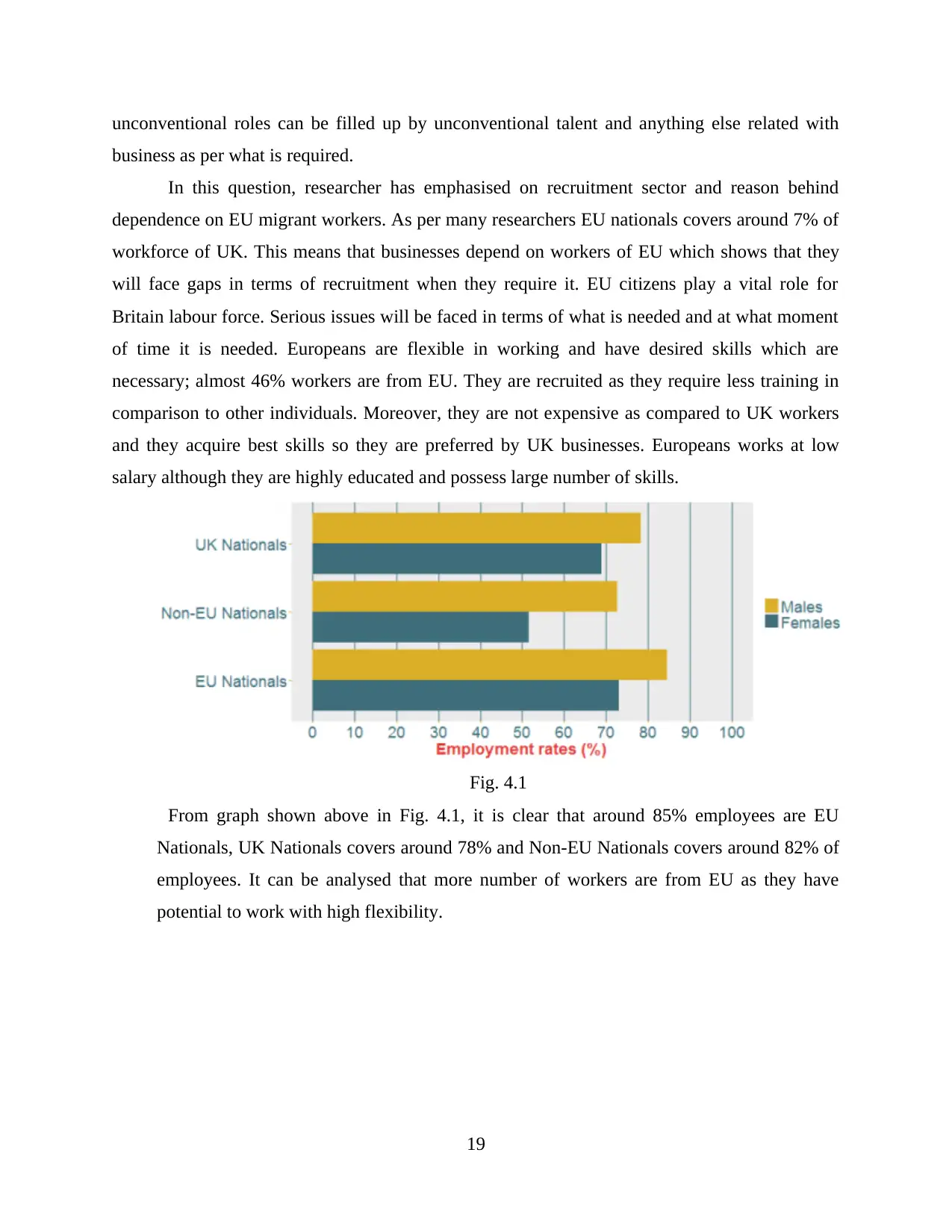
unconventional roles can be filled up by unconventional talent and anything else related with
business as per what is required.
In this question, researcher has emphasised on recruitment sector and reason behind
dependence on EU migrant workers. As per many researchers EU nationals covers around 7% of
workforce of UK. This means that businesses depend on workers of EU which shows that they
will face gaps in terms of recruitment when they require it. EU citizens play a vital role for
Britain labour force. Serious issues will be faced in terms of what is needed and at what moment
of time it is needed. Europeans are flexible in working and have desired skills which are
necessary; almost 46% workers are from EU. They are recruited as they require less training in
comparison to other individuals. Moreover, they are not expensive as compared to UK workers
and they acquire best skills so they are preferred by UK businesses. Europeans works at low
salary although they are highly educated and possess large number of skills.
Fig. 4.1
From graph shown above in Fig. 4.1, it is clear that around 85% employees are EU
Nationals, UK Nationals covers around 78% and Non-EU Nationals covers around 82% of
employees. It can be analysed that more number of workers are from EU as they have
potential to work with high flexibility.
19
business as per what is required.
In this question, researcher has emphasised on recruitment sector and reason behind
dependence on EU migrant workers. As per many researchers EU nationals covers around 7% of
workforce of UK. This means that businesses depend on workers of EU which shows that they
will face gaps in terms of recruitment when they require it. EU citizens play a vital role for
Britain labour force. Serious issues will be faced in terms of what is needed and at what moment
of time it is needed. Europeans are flexible in working and have desired skills which are
necessary; almost 46% workers are from EU. They are recruited as they require less training in
comparison to other individuals. Moreover, they are not expensive as compared to UK workers
and they acquire best skills so they are preferred by UK businesses. Europeans works at low
salary although they are highly educated and possess large number of skills.
Fig. 4.1
From graph shown above in Fig. 4.1, it is clear that around 85% employees are EU
Nationals, UK Nationals covers around 78% and Non-EU Nationals covers around 82% of
employees. It can be analysed that more number of workers are from EU as they have
potential to work with high flexibility.
19
Secure Best Marks with AI Grader
Need help grading? Try our AI Grader for instant feedback on your assignments.
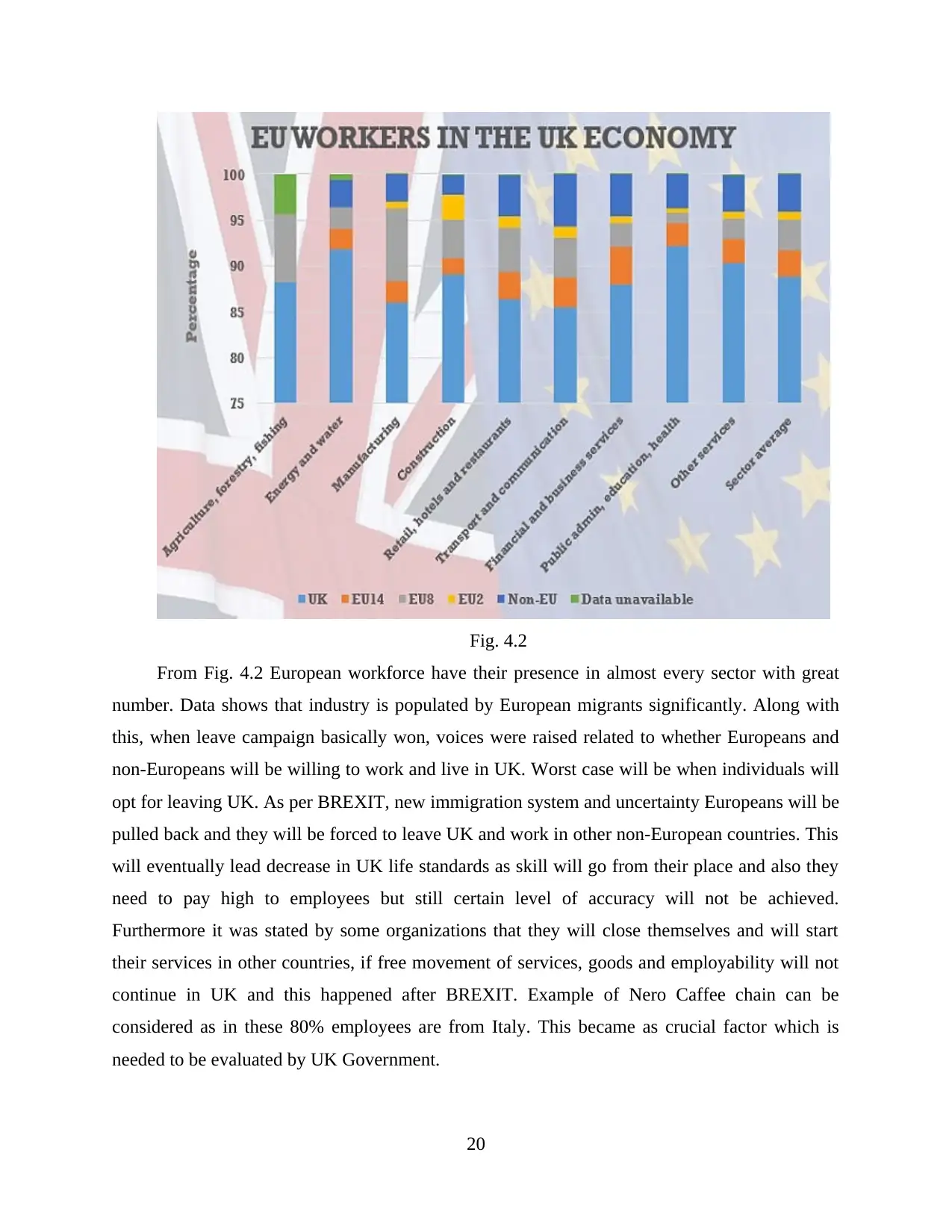
Fig. 4.2
From Fig. 4.2 European workforce have their presence in almost every sector with great
number. Data shows that industry is populated by European migrants significantly. Along with
this, when leave campaign basically won, voices were raised related to whether Europeans and
non-Europeans will be willing to work and live in UK. Worst case will be when individuals will
opt for leaving UK. As per BREXIT, new immigration system and uncertainty Europeans will be
pulled back and they will be forced to leave UK and work in other non-European countries. This
will eventually lead decrease in UK life standards as skill will go from their place and also they
need to pay high to employees but still certain level of accuracy will not be achieved.
Furthermore it was stated by some organizations that they will close themselves and will start
their services in other countries, if free movement of services, goods and employability will not
continue in UK and this happened after BREXIT. Example of Nero Caffee chain can be
considered as in these 80% employees are from Italy. This became as crucial factor which is
needed to be evaluated by UK Government.
20
From Fig. 4.2 European workforce have their presence in almost every sector with great
number. Data shows that industry is populated by European migrants significantly. Along with
this, when leave campaign basically won, voices were raised related to whether Europeans and
non-Europeans will be willing to work and live in UK. Worst case will be when individuals will
opt for leaving UK. As per BREXIT, new immigration system and uncertainty Europeans will be
pulled back and they will be forced to leave UK and work in other non-European countries. This
will eventually lead decrease in UK life standards as skill will go from their place and also they
need to pay high to employees but still certain level of accuracy will not be achieved.
Furthermore it was stated by some organizations that they will close themselves and will start
their services in other countries, if free movement of services, goods and employability will not
continue in UK and this happened after BREXIT. Example of Nero Caffee chain can be
considered as in these 80% employees are from Italy. This became as crucial factor which is
needed to be evaluated by UK Government.
20
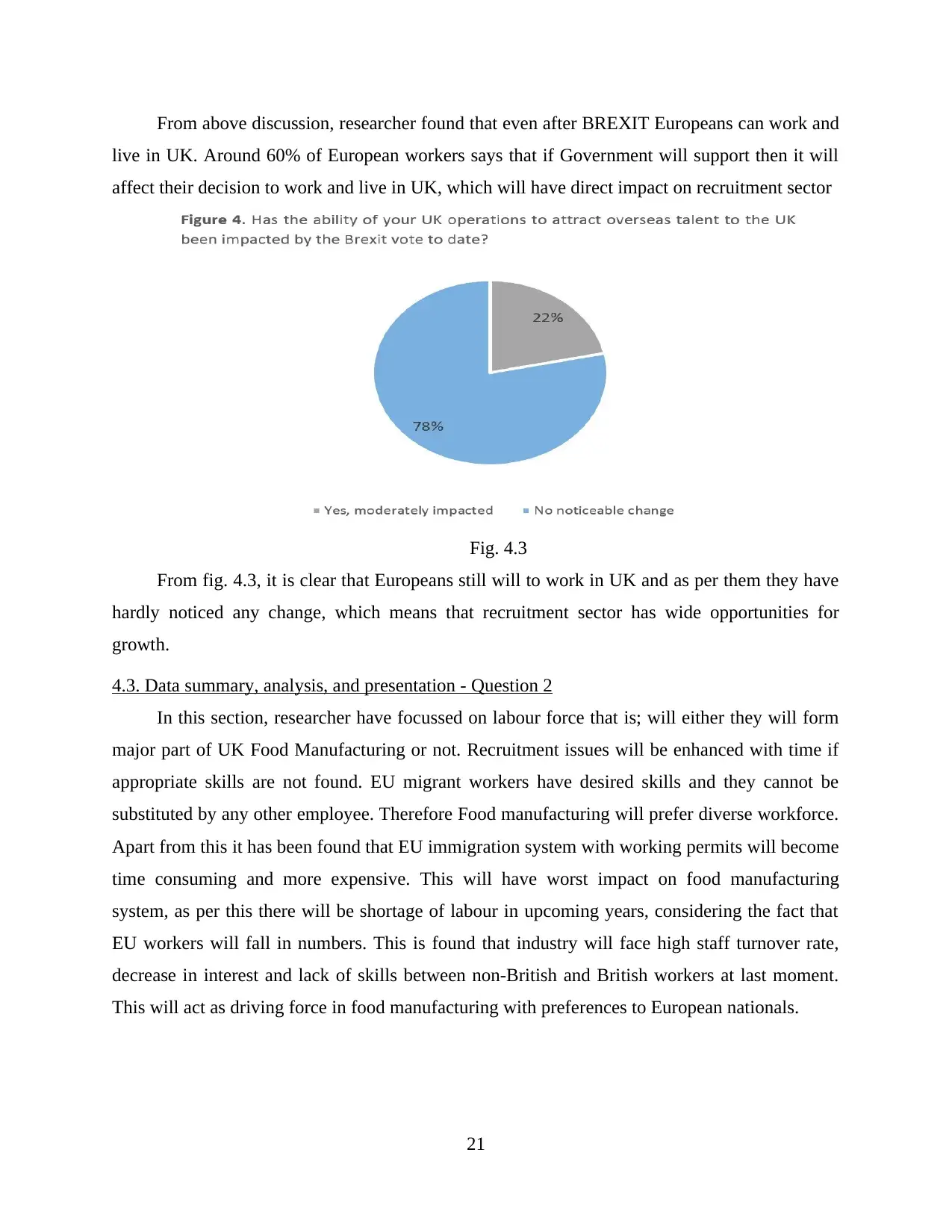
From above discussion, researcher found that even after BREXIT Europeans can work and
live in UK. Around 60% of European workers says that if Government will support then it will
affect their decision to work and live in UK, which will have direct impact on recruitment sector
Fig. 4.3
From fig. 4.3, it is clear that Europeans still will to work in UK and as per them they have
hardly noticed any change, which means that recruitment sector has wide opportunities for
growth.
4.3. Data summary, analysis, and presentation - Question 2
In this section, researcher have focussed on labour force that is; will either they will form
major part of UK Food Manufacturing or not. Recruitment issues will be enhanced with time if
appropriate skills are not found. EU migrant workers have desired skills and they cannot be
substituted by any other employee. Therefore Food manufacturing will prefer diverse workforce.
Apart from this it has been found that EU immigration system with working permits will become
time consuming and more expensive. This will have worst impact on food manufacturing
system, as per this there will be shortage of labour in upcoming years, considering the fact that
EU workers will fall in numbers. This is found that industry will face high staff turnover rate,
decrease in interest and lack of skills between non-British and British workers at last moment.
This will act as driving force in food manufacturing with preferences to European nationals.
21
live in UK. Around 60% of European workers says that if Government will support then it will
affect their decision to work and live in UK, which will have direct impact on recruitment sector
Fig. 4.3
From fig. 4.3, it is clear that Europeans still will to work in UK and as per them they have
hardly noticed any change, which means that recruitment sector has wide opportunities for
growth.
4.3. Data summary, analysis, and presentation - Question 2
In this section, researcher have focussed on labour force that is; will either they will form
major part of UK Food Manufacturing or not. Recruitment issues will be enhanced with time if
appropriate skills are not found. EU migrant workers have desired skills and they cannot be
substituted by any other employee. Therefore Food manufacturing will prefer diverse workforce.
Apart from this it has been found that EU immigration system with working permits will become
time consuming and more expensive. This will have worst impact on food manufacturing
system, as per this there will be shortage of labour in upcoming years, considering the fact that
EU workers will fall in numbers. This is found that industry will face high staff turnover rate,
decrease in interest and lack of skills between non-British and British workers at last moment.
This will act as driving force in food manufacturing with preferences to European nationals.
21
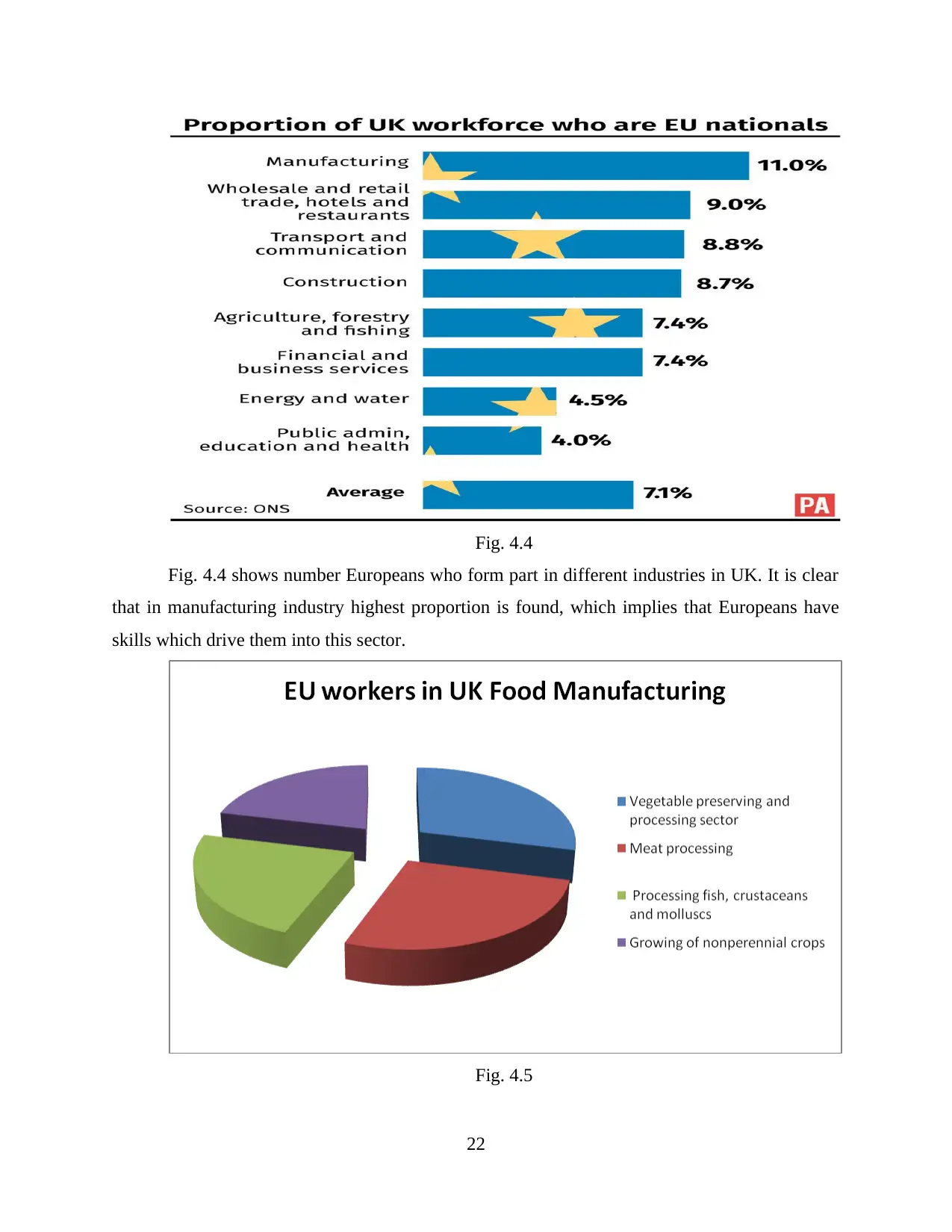
Fig. 4.4
Fig. 4.4 shows number Europeans who form part in different industries in UK. It is clear
that in manufacturing industry highest proportion is found, which implies that Europeans have
skills which drive them into this sector.
Fig. 4.5
22
Fig. 4.4 shows number Europeans who form part in different industries in UK. It is clear
that in manufacturing industry highest proportion is found, which implies that Europeans have
skills which drive them into this sector.
Fig. 4.5
22
Paraphrase This Document
Need a fresh take? Get an instant paraphrase of this document with our AI Paraphraser
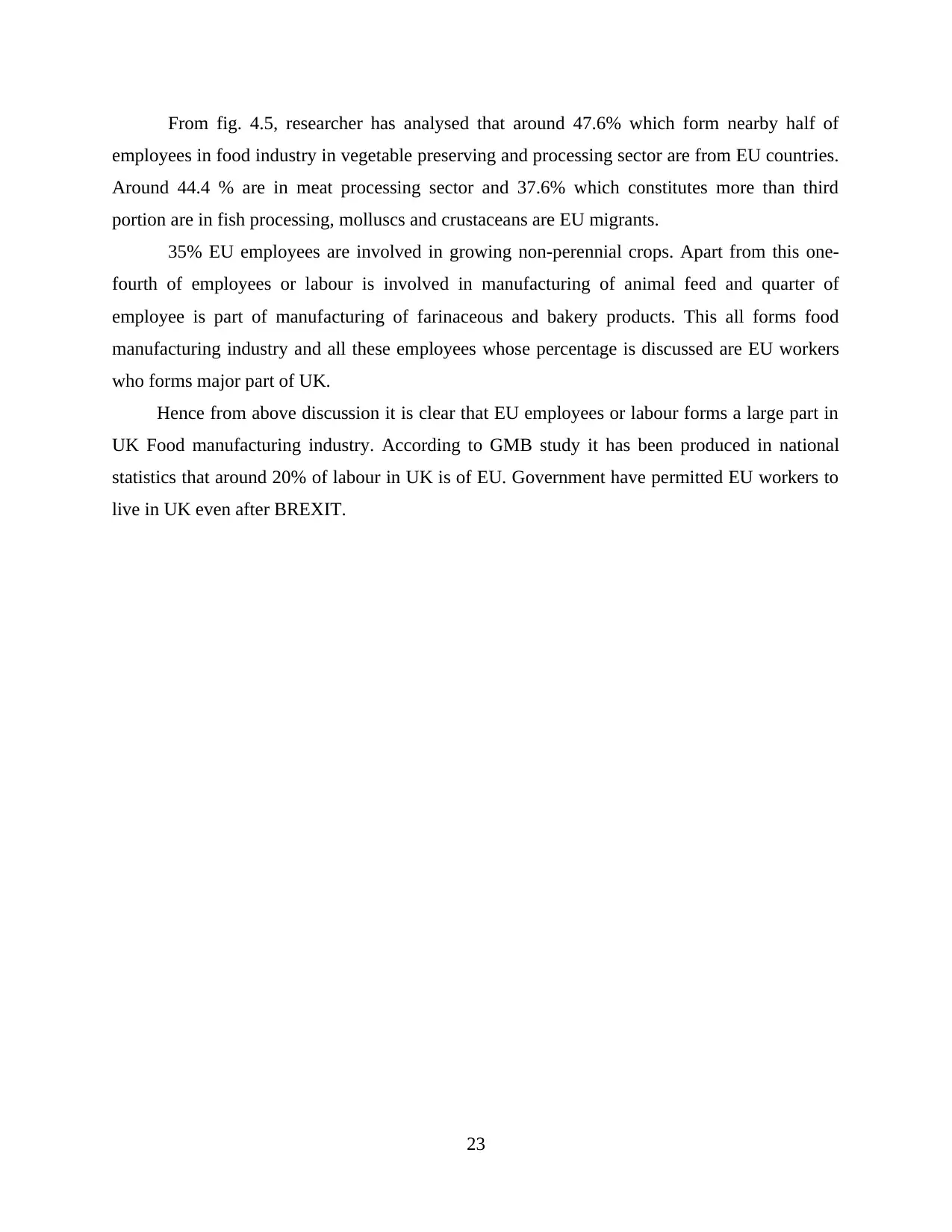
From fig. 4.5, researcher has analysed that around 47.6% which form nearby half of
employees in food industry in vegetable preserving and processing sector are from EU countries.
Around 44.4 % are in meat processing sector and 37.6% which constitutes more than third
portion are in fish processing, molluscs and crustaceans are EU migrants.
35% EU employees are involved in growing non-perennial crops. Apart from this one-
fourth of employees or labour is involved in manufacturing of animal feed and quarter of
employee is part of manufacturing of farinaceous and bakery products. This all forms food
manufacturing industry and all these employees whose percentage is discussed are EU workers
who forms major part of UK.
Hence from above discussion it is clear that EU employees or labour forms a large part in
UK Food manufacturing industry. According to GMB study it has been produced in national
statistics that around 20% of labour in UK is of EU. Government have permitted EU workers to
live in UK even after BREXIT.
23
employees in food industry in vegetable preserving and processing sector are from EU countries.
Around 44.4 % are in meat processing sector and 37.6% which constitutes more than third
portion are in fish processing, molluscs and crustaceans are EU migrants.
35% EU employees are involved in growing non-perennial crops. Apart from this one-
fourth of employees or labour is involved in manufacturing of animal feed and quarter of
employee is part of manufacturing of farinaceous and bakery products. This all forms food
manufacturing industry and all these employees whose percentage is discussed are EU workers
who forms major part of UK.
Hence from above discussion it is clear that EU employees or labour forms a large part in
UK Food manufacturing industry. According to GMB study it has been produced in national
statistics that around 20% of labour in UK is of EU. Government have permitted EU workers to
live in UK even after BREXIT.
23
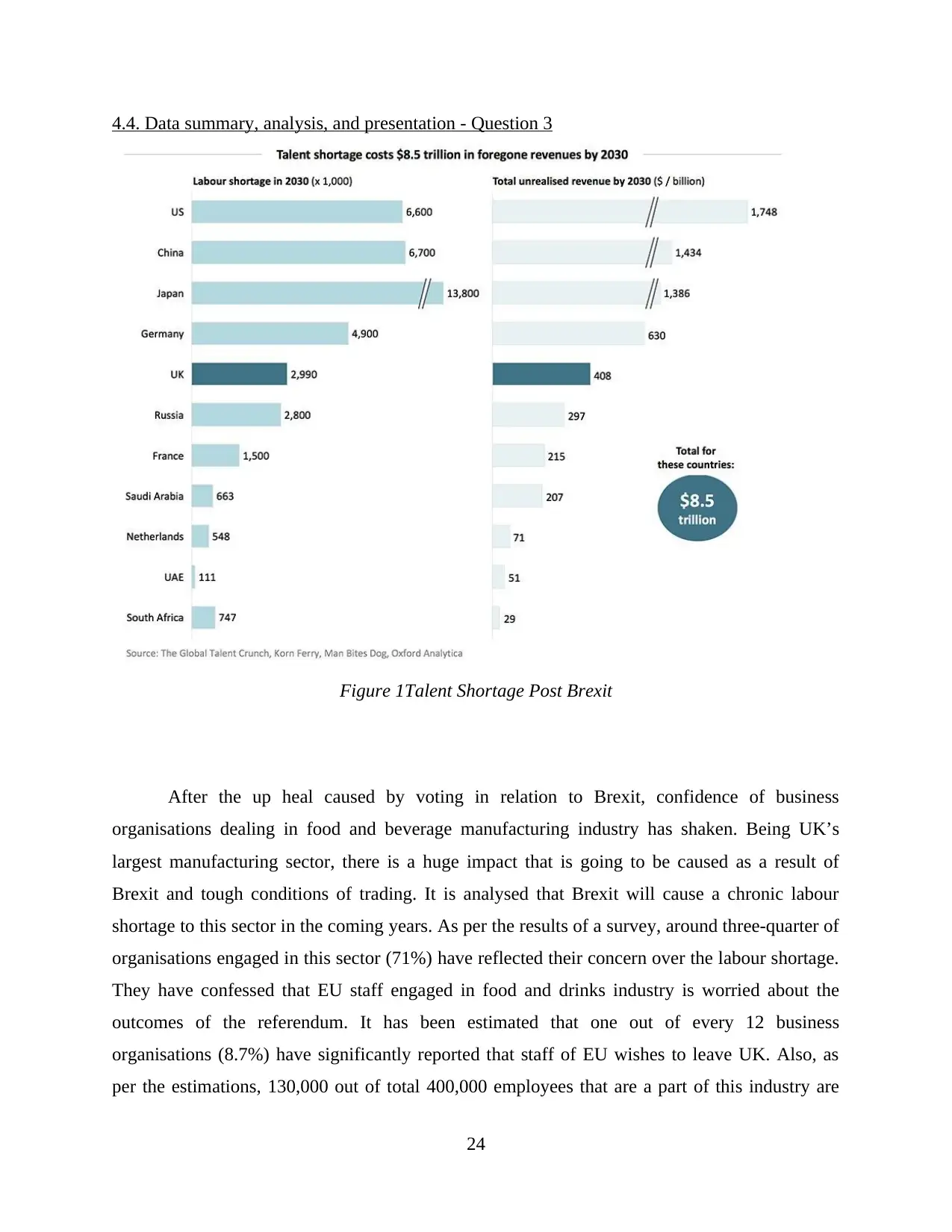
4.4. Data summary, analysis, and presentation - Question 3
Figure 1Talent Shortage Post Brexit
After the up heal caused by voting in relation to Brexit, confidence of business
organisations dealing in food and beverage manufacturing industry has shaken. Being UK’s
largest manufacturing sector, there is a huge impact that is going to be caused as a result of
Brexit and tough conditions of trading. It is analysed that Brexit will cause a chronic labour
shortage to this sector in the coming years. As per the results of a survey, around three-quarter of
organisations engaged in this sector (71%) have reflected their concern over the labour shortage.
They have confessed that EU staff engaged in food and drinks industry is worried about the
outcomes of the referendum. It has been estimated that one out of every 12 business
organisations (8.7%) have significantly reported that staff of EU wishes to leave UK. Also, as
per the estimations, 130,000 out of total 400,000 employees that are a part of this industry are
24
Figure 1Talent Shortage Post Brexit
After the up heal caused by voting in relation to Brexit, confidence of business
organisations dealing in food and beverage manufacturing industry has shaken. Being UK’s
largest manufacturing sector, there is a huge impact that is going to be caused as a result of
Brexit and tough conditions of trading. It is analysed that Brexit will cause a chronic labour
shortage to this sector in the coming years. As per the results of a survey, around three-quarter of
organisations engaged in this sector (71%) have reflected their concern over the labour shortage.
They have confessed that EU staff engaged in food and drinks industry is worried about the
outcomes of the referendum. It has been estimated that one out of every 12 business
organisations (8.7%) have significantly reported that staff of EU wishes to leave UK. Also, as
per the estimations, 130,000 out of total 400,000 employees that are a part of this industry are
24
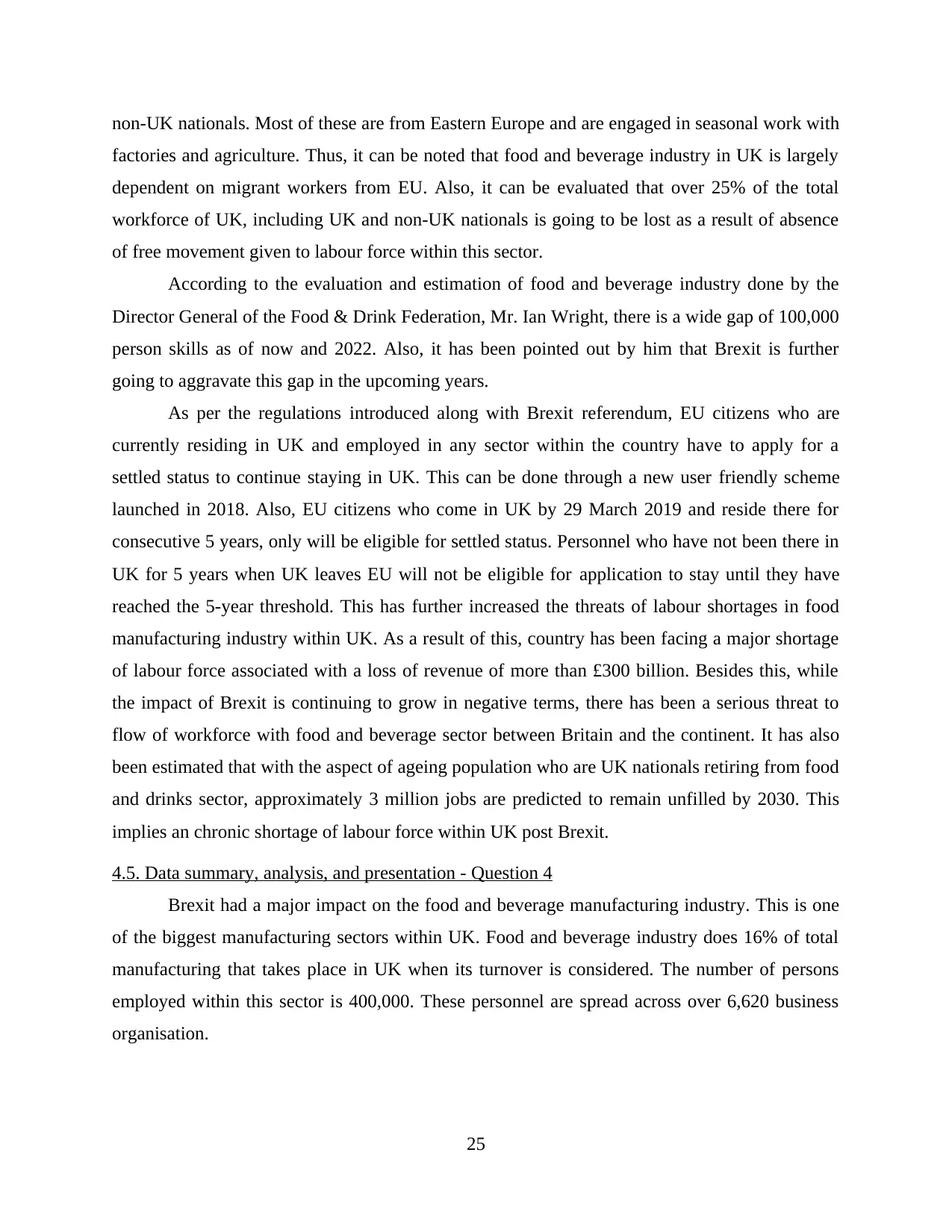
non-UK nationals. Most of these are from Eastern Europe and are engaged in seasonal work with
factories and agriculture. Thus, it can be noted that food and beverage industry in UK is largely
dependent on migrant workers from EU. Also, it can be evaluated that over 25% of the total
workforce of UK, including UK and non-UK nationals is going to be lost as a result of absence
of free movement given to labour force within this sector.
According to the evaluation and estimation of food and beverage industry done by the
Director General of the Food & Drink Federation, Mr. Ian Wright, there is a wide gap of 100,000
person skills as of now and 2022. Also, it has been pointed out by him that Brexit is further
going to aggravate this gap in the upcoming years.
As per the regulations introduced along with Brexit referendum, EU citizens who are
currently residing in UK and employed in any sector within the country have to apply for a
settled status to continue staying in UK. This can be done through a new user friendly scheme
launched in 2018. Also, EU citizens who come in UK by 29 March 2019 and reside there for
consecutive 5 years, only will be eligible for settled status. Personnel who have not been there in
UK for 5 years when UK leaves EU will not be eligible for application to stay until they have
reached the 5-year threshold. This has further increased the threats of labour shortages in food
manufacturing industry within UK. As a result of this, country has been facing a major shortage
of labour force associated with a loss of revenue of more than £300 billion. Besides this, while
the impact of Brexit is continuing to grow in negative terms, there has been a serious threat to
flow of workforce with food and beverage sector between Britain and the continent. It has also
been estimated that with the aspect of ageing population who are UK nationals retiring from food
and drinks sector, approximately 3 million jobs are predicted to remain unfilled by 2030. This
implies an chronic shortage of labour force within UK post Brexit.
4.5. Data summary, analysis, and presentation - Question 4
Brexit had a major impact on the food and beverage manufacturing industry. This is one
of the biggest manufacturing sectors within UK. Food and beverage industry does 16% of total
manufacturing that takes place in UK when its turnover is considered. The number of persons
employed within this sector is 400,000. These personnel are spread across over 6,620 business
organisation.
25
factories and agriculture. Thus, it can be noted that food and beverage industry in UK is largely
dependent on migrant workers from EU. Also, it can be evaluated that over 25% of the total
workforce of UK, including UK and non-UK nationals is going to be lost as a result of absence
of free movement given to labour force within this sector.
According to the evaluation and estimation of food and beverage industry done by the
Director General of the Food & Drink Federation, Mr. Ian Wright, there is a wide gap of 100,000
person skills as of now and 2022. Also, it has been pointed out by him that Brexit is further
going to aggravate this gap in the upcoming years.
As per the regulations introduced along with Brexit referendum, EU citizens who are
currently residing in UK and employed in any sector within the country have to apply for a
settled status to continue staying in UK. This can be done through a new user friendly scheme
launched in 2018. Also, EU citizens who come in UK by 29 March 2019 and reside there for
consecutive 5 years, only will be eligible for settled status. Personnel who have not been there in
UK for 5 years when UK leaves EU will not be eligible for application to stay until they have
reached the 5-year threshold. This has further increased the threats of labour shortages in food
manufacturing industry within UK. As a result of this, country has been facing a major shortage
of labour force associated with a loss of revenue of more than £300 billion. Besides this, while
the impact of Brexit is continuing to grow in negative terms, there has been a serious threat to
flow of workforce with food and beverage sector between Britain and the continent. It has also
been estimated that with the aspect of ageing population who are UK nationals retiring from food
and drinks sector, approximately 3 million jobs are predicted to remain unfilled by 2030. This
implies an chronic shortage of labour force within UK post Brexit.
4.5. Data summary, analysis, and presentation - Question 4
Brexit had a major impact on the food and beverage manufacturing industry. This is one
of the biggest manufacturing sectors within UK. Food and beverage industry does 16% of total
manufacturing that takes place in UK when its turnover is considered. The number of persons
employed within this sector is 400,000. These personnel are spread across over 6,620 business
organisation.
25
Secure Best Marks with AI Grader
Need help grading? Try our AI Grader for instant feedback on your assignments.
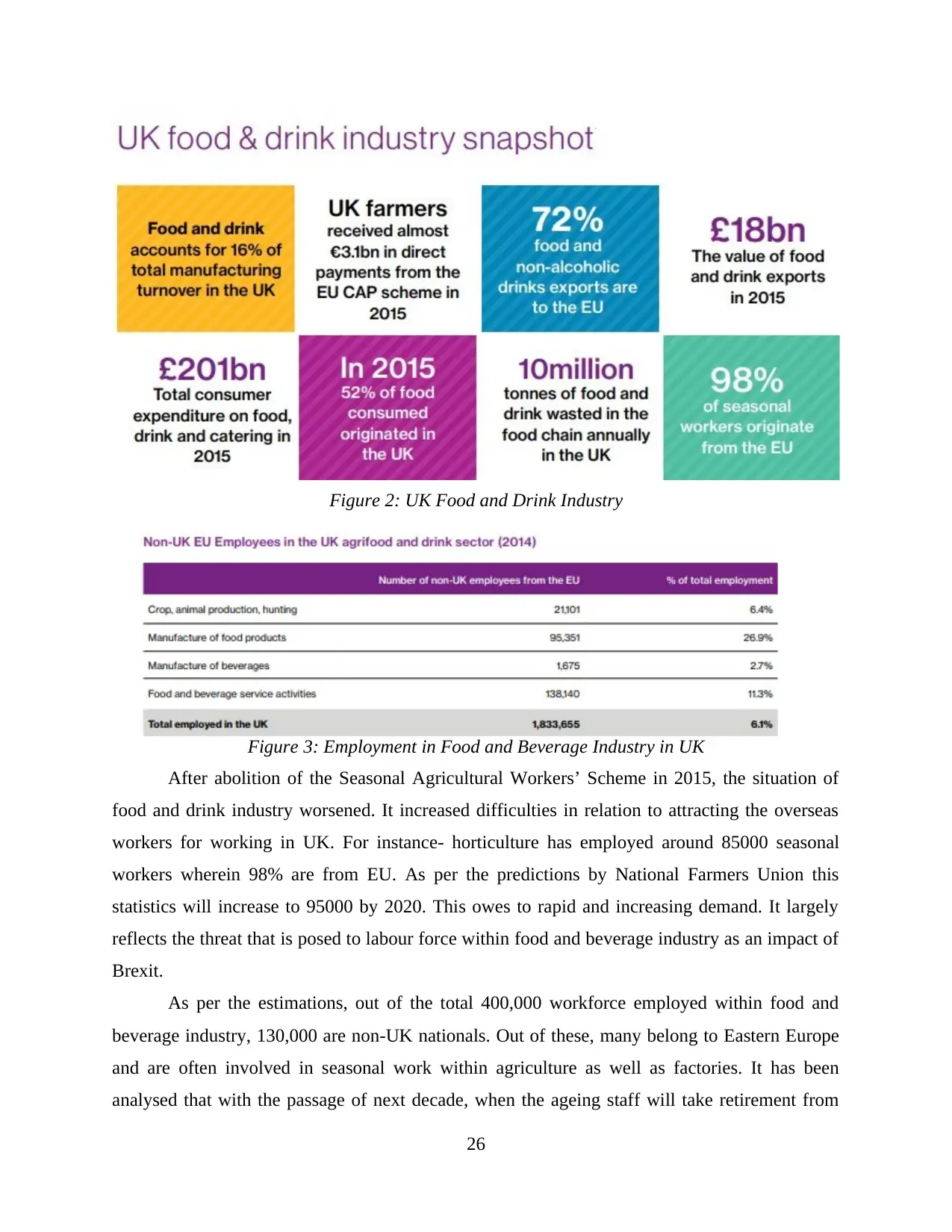
Figure 2: UK Food and Drink Industry
Figure 3: Employment in Food and Beverage Industry in UK
After abolition of the Seasonal Agricultural Workers’ Scheme in 2015, the situation of
food and drink industry worsened. It increased difficulties in relation to attracting the overseas
workers for working in UK. For instance- horticulture has employed around 85000 seasonal
workers wherein 98% are from EU. As per the predictions by National Farmers Union this
statistics will increase to 95000 by 2020. This owes to rapid and increasing demand. It largely
reflects the threat that is posed to labour force within food and beverage industry as an impact of
Brexit.
As per the estimations, out of the total 400,000 workforce employed within food and
beverage industry, 130,000 are non-UK nationals. Out of these, many belong to Eastern Europe
and are often involved in seasonal work within agriculture as well as factories. It has been
analysed that with the passage of next decade, when the ageing staff will take retirement from
26
Figure 3: Employment in Food and Beverage Industry in UK
After abolition of the Seasonal Agricultural Workers’ Scheme in 2015, the situation of
food and drink industry worsened. It increased difficulties in relation to attracting the overseas
workers for working in UK. For instance- horticulture has employed around 85000 seasonal
workers wherein 98% are from EU. As per the predictions by National Farmers Union this
statistics will increase to 95000 by 2020. This owes to rapid and increasing demand. It largely
reflects the threat that is posed to labour force within food and beverage industry as an impact of
Brexit.
As per the estimations, out of the total 400,000 workforce employed within food and
beverage industry, 130,000 are non-UK nationals. Out of these, many belong to Eastern Europe
and are often involved in seasonal work within agriculture as well as factories. It has been
analysed that with the passage of next decade, when the ageing staff will take retirement from
26
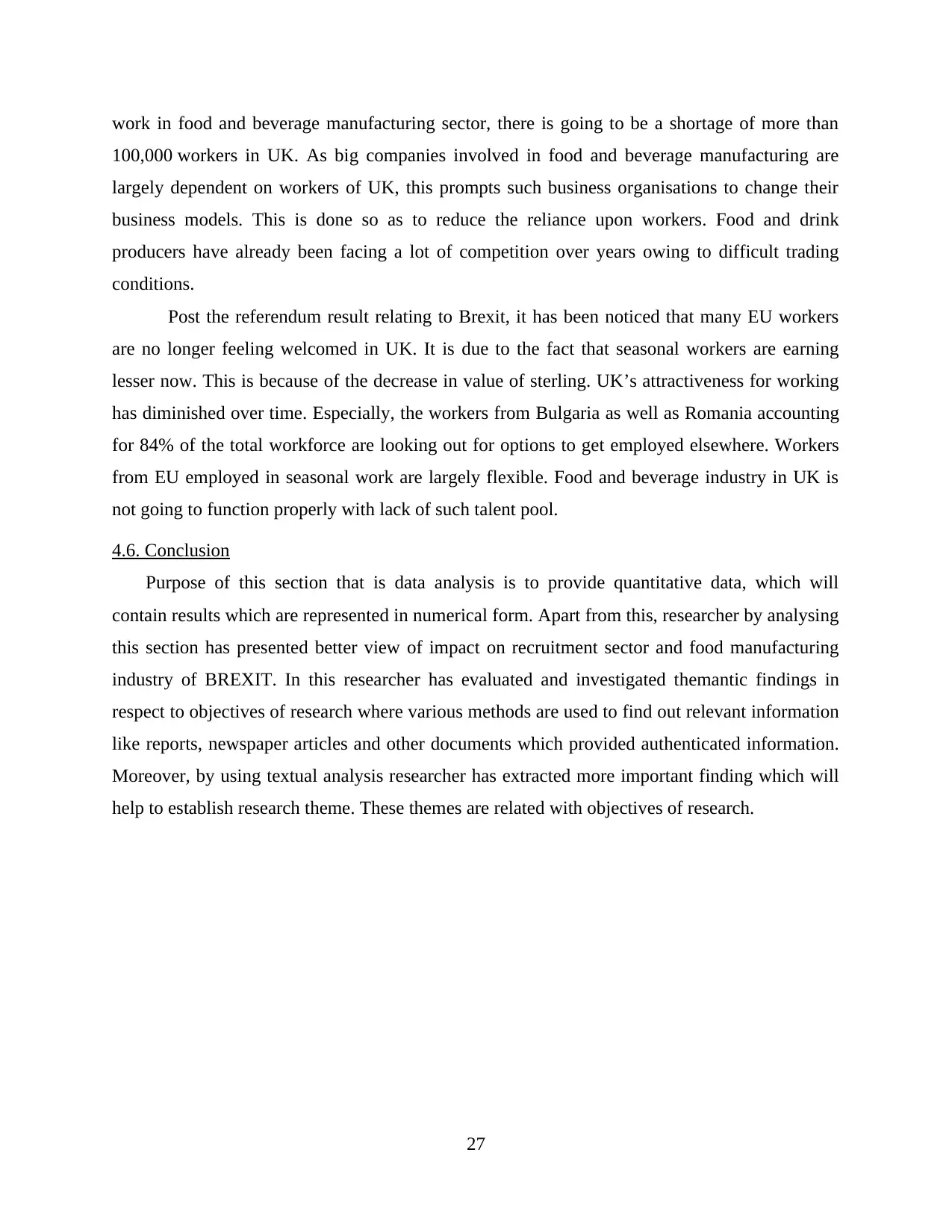
work in food and beverage manufacturing sector, there is going to be a shortage of more than
100,000 workers in UK. As big companies involved in food and beverage manufacturing are
largely dependent on workers of UK, this prompts such business organisations to change their
business models. This is done so as to reduce the reliance upon workers. Food and drink
producers have already been facing a lot of competition over years owing to difficult trading
conditions.
Post the referendum result relating to Brexit, it has been noticed that many EU workers
are no longer feeling welcomed in UK. It is due to the fact that seasonal workers are earning
lesser now. This is because of the decrease in value of sterling. UK’s attractiveness for working
has diminished over time. Especially, the workers from Bulgaria as well as Romania accounting
for 84% of the total workforce are looking out for options to get employed elsewhere. Workers
from EU employed in seasonal work are largely flexible. Food and beverage industry in UK is
not going to function properly with lack of such talent pool.
4.6. Conclusion
Purpose of this section that is data analysis is to provide quantitative data, which will
contain results which are represented in numerical form. Apart from this, researcher by analysing
this section has presented better view of impact on recruitment sector and food manufacturing
industry of BREXIT. In this researcher has evaluated and investigated themantic findings in
respect to objectives of research where various methods are used to find out relevant information
like reports, newspaper articles and other documents which provided authenticated information.
Moreover, by using textual analysis researcher has extracted more important finding which will
help to establish research theme. These themes are related with objectives of research.
27
100,000 workers in UK. As big companies involved in food and beverage manufacturing are
largely dependent on workers of UK, this prompts such business organisations to change their
business models. This is done so as to reduce the reliance upon workers. Food and drink
producers have already been facing a lot of competition over years owing to difficult trading
conditions.
Post the referendum result relating to Brexit, it has been noticed that many EU workers
are no longer feeling welcomed in UK. It is due to the fact that seasonal workers are earning
lesser now. This is because of the decrease in value of sterling. UK’s attractiveness for working
has diminished over time. Especially, the workers from Bulgaria as well as Romania accounting
for 84% of the total workforce are looking out for options to get employed elsewhere. Workers
from EU employed in seasonal work are largely flexible. Food and beverage industry in UK is
not going to function properly with lack of such talent pool.
4.6. Conclusion
Purpose of this section that is data analysis is to provide quantitative data, which will
contain results which are represented in numerical form. Apart from this, researcher by analysing
this section has presented better view of impact on recruitment sector and food manufacturing
industry of BREXIT. In this researcher has evaluated and investigated themantic findings in
respect to objectives of research where various methods are used to find out relevant information
like reports, newspaper articles and other documents which provided authenticated information.
Moreover, by using textual analysis researcher has extracted more important finding which will
help to establish research theme. These themes are related with objectives of research.
27
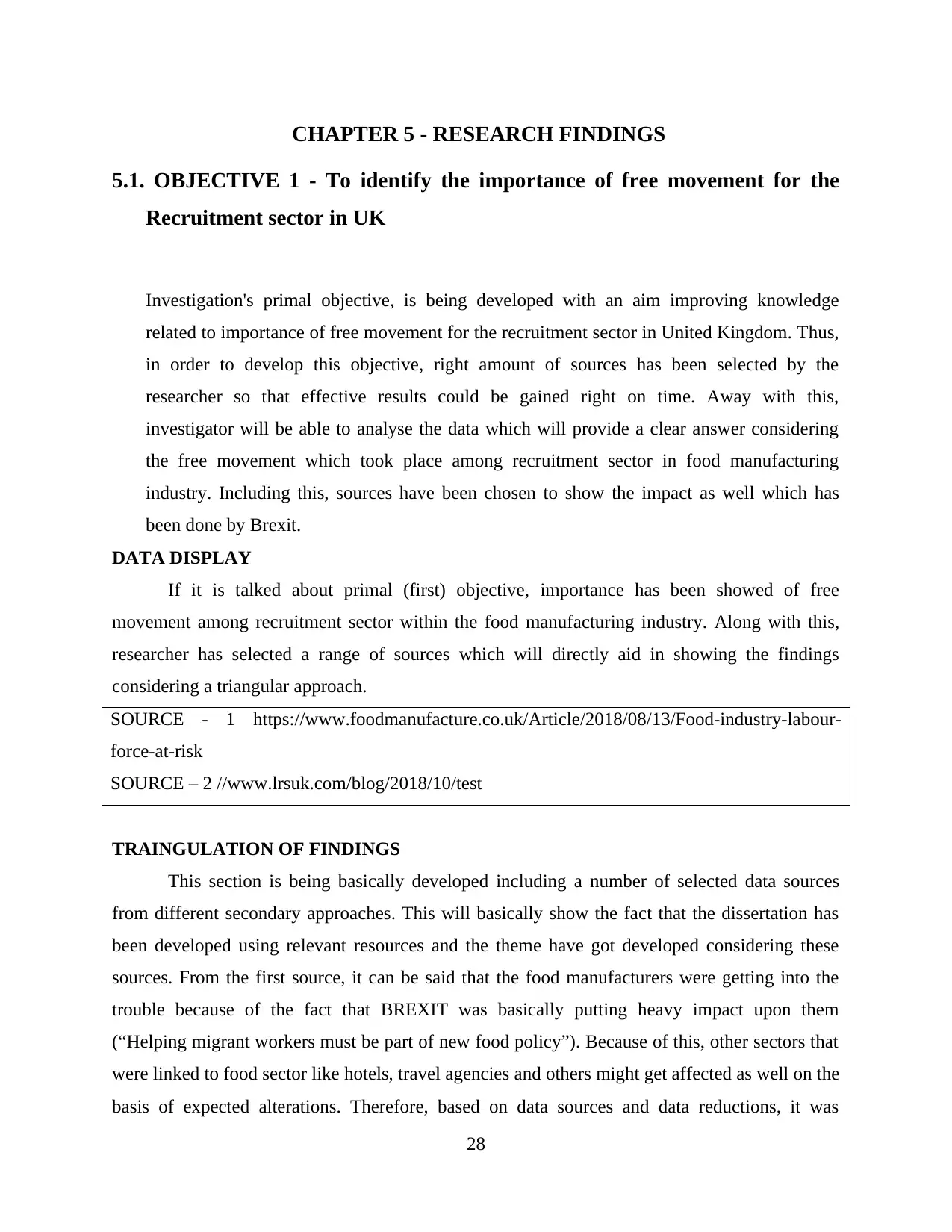
CHAPTER 5 - RESEARCH FINDINGS
5.1. OBJECTIVE 1 - To identify the importance of free movement for the
Recruitment sector in UK
Investigation's primal objective, is being developed with an aim improving knowledge
related to importance of free movement for the recruitment sector in United Kingdom. Thus,
in order to develop this objective, right amount of sources has been selected by the
researcher so that effective results could be gained right on time. Away with this,
investigator will be able to analyse the data which will provide a clear answer considering
the free movement which took place among recruitment sector in food manufacturing
industry. Including this, sources have been chosen to show the impact as well which has
been done by Brexit.
DATA DISPLAY
If it is talked about primal (first) objective, importance has been showed of free
movement among recruitment sector within the food manufacturing industry. Along with this,
researcher has selected a range of sources which will directly aid in showing the findings
considering a triangular approach.
SOURCE - 1 https://www.foodmanufacture.co.uk/Article/2018/08/13/Food-industry-labour-
force-at-risk
SOURCE – 2 //www.lrsuk.com/blog/2018/10/test
TRAINGULATION OF FINDINGS
This section is being basically developed including a number of selected data sources
from different secondary approaches. This will basically show the fact that the dissertation has
been developed using relevant resources and the theme have got developed considering these
sources. From the first source, it can be said that the food manufacturers were getting into the
trouble because of the fact that BREXIT was basically putting heavy impact upon them
(“Helping migrant workers must be part of new food policy”). Because of this, other sectors that
were linked to food sector like hotels, travel agencies and others might get affected as well on the
basis of expected alterations. Therefore, based on data sources and data reductions, it was
28
5.1. OBJECTIVE 1 - To identify the importance of free movement for the
Recruitment sector in UK
Investigation's primal objective, is being developed with an aim improving knowledge
related to importance of free movement for the recruitment sector in United Kingdom. Thus,
in order to develop this objective, right amount of sources has been selected by the
researcher so that effective results could be gained right on time. Away with this,
investigator will be able to analyse the data which will provide a clear answer considering
the free movement which took place among recruitment sector in food manufacturing
industry. Including this, sources have been chosen to show the impact as well which has
been done by Brexit.
DATA DISPLAY
If it is talked about primal (first) objective, importance has been showed of free
movement among recruitment sector within the food manufacturing industry. Along with this,
researcher has selected a range of sources which will directly aid in showing the findings
considering a triangular approach.
SOURCE - 1 https://www.foodmanufacture.co.uk/Article/2018/08/13/Food-industry-labour-
force-at-risk
SOURCE – 2 //www.lrsuk.com/blog/2018/10/test
TRAINGULATION OF FINDINGS
This section is being basically developed including a number of selected data sources
from different secondary approaches. This will basically show the fact that the dissertation has
been developed using relevant resources and the theme have got developed considering these
sources. From the first source, it can be said that the food manufacturers were getting into the
trouble because of the fact that BREXIT was basically putting heavy impact upon them
(“Helping migrant workers must be part of new food policy”). Because of this, other sectors that
were linked to food sector like hotels, travel agencies and others might get affected as well on the
basis of expected alterations. Therefore, based on data sources and data reductions, it was
28
Paraphrase This Document
Need a fresh take? Get an instant paraphrase of this document with our AI Paraphraser
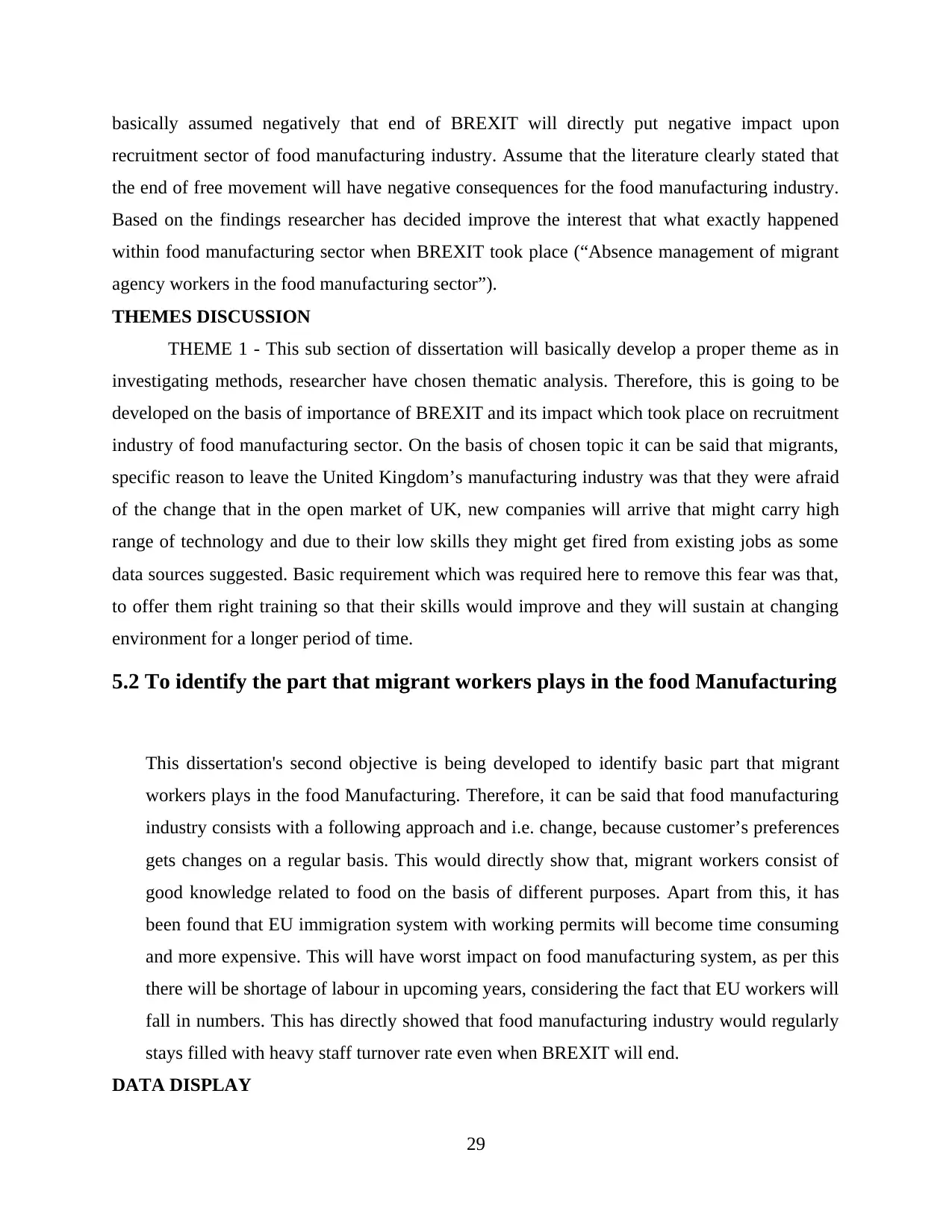
basically assumed negatively that end of BREXIT will directly put negative impact upon
recruitment sector of food manufacturing industry. Assume that the literature clearly stated that
the end of free movement will have negative consequences for the food manufacturing industry.
Based on the findings researcher has decided improve the interest that what exactly happened
within food manufacturing sector when BREXIT took place (“Absence management of migrant
agency workers in the food manufacturing sector”).
THEMES DISCUSSION
THEME 1 - This sub section of dissertation will basically develop a proper theme as in
investigating methods, researcher have chosen thematic analysis. Therefore, this is going to be
developed on the basis of importance of BREXIT and its impact which took place on recruitment
industry of food manufacturing sector. On the basis of chosen topic it can be said that migrants,
specific reason to leave the United Kingdom’s manufacturing industry was that they were afraid
of the change that in the open market of UK, new companies will arrive that might carry high
range of technology and due to their low skills they might get fired from existing jobs as some
data sources suggested. Basic requirement which was required here to remove this fear was that,
to offer them right training so that their skills would improve and they will sustain at changing
environment for a longer period of time.
5.2 To identify the part that migrant workers plays in the food Manufacturing
This dissertation's second objective is being developed to identify basic part that migrant
workers plays in the food Manufacturing. Therefore, it can be said that food manufacturing
industry consists with a following approach and i.e. change, because customer’s preferences
gets changes on a regular basis. This would directly show that, migrant workers consist of
good knowledge related to food on the basis of different purposes. Apart from this, it has
been found that EU immigration system with working permits will become time consuming
and more expensive. This will have worst impact on food manufacturing system, as per this
there will be shortage of labour in upcoming years, considering the fact that EU workers will
fall in numbers. This has directly showed that food manufacturing industry would regularly
stays filled with heavy staff turnover rate even when BREXIT will end.
DATA DISPLAY
29
recruitment sector of food manufacturing industry. Assume that the literature clearly stated that
the end of free movement will have negative consequences for the food manufacturing industry.
Based on the findings researcher has decided improve the interest that what exactly happened
within food manufacturing sector when BREXIT took place (“Absence management of migrant
agency workers in the food manufacturing sector”).
THEMES DISCUSSION
THEME 1 - This sub section of dissertation will basically develop a proper theme as in
investigating methods, researcher have chosen thematic analysis. Therefore, this is going to be
developed on the basis of importance of BREXIT and its impact which took place on recruitment
industry of food manufacturing sector. On the basis of chosen topic it can be said that migrants,
specific reason to leave the United Kingdom’s manufacturing industry was that they were afraid
of the change that in the open market of UK, new companies will arrive that might carry high
range of technology and due to their low skills they might get fired from existing jobs as some
data sources suggested. Basic requirement which was required here to remove this fear was that,
to offer them right training so that their skills would improve and they will sustain at changing
environment for a longer period of time.
5.2 To identify the part that migrant workers plays in the food Manufacturing
This dissertation's second objective is being developed to identify basic part that migrant
workers plays in the food Manufacturing. Therefore, it can be said that food manufacturing
industry consists with a following approach and i.e. change, because customer’s preferences
gets changes on a regular basis. This would directly show that, migrant workers consist of
good knowledge related to food on the basis of different purposes. Apart from this, it has
been found that EU immigration system with working permits will become time consuming
and more expensive. This will have worst impact on food manufacturing system, as per this
there will be shortage of labour in upcoming years, considering the fact that EU workers will
fall in numbers. This has directly showed that food manufacturing industry would regularly
stays filled with heavy staff turnover rate even when BREXIT will end.
DATA DISPLAY
29
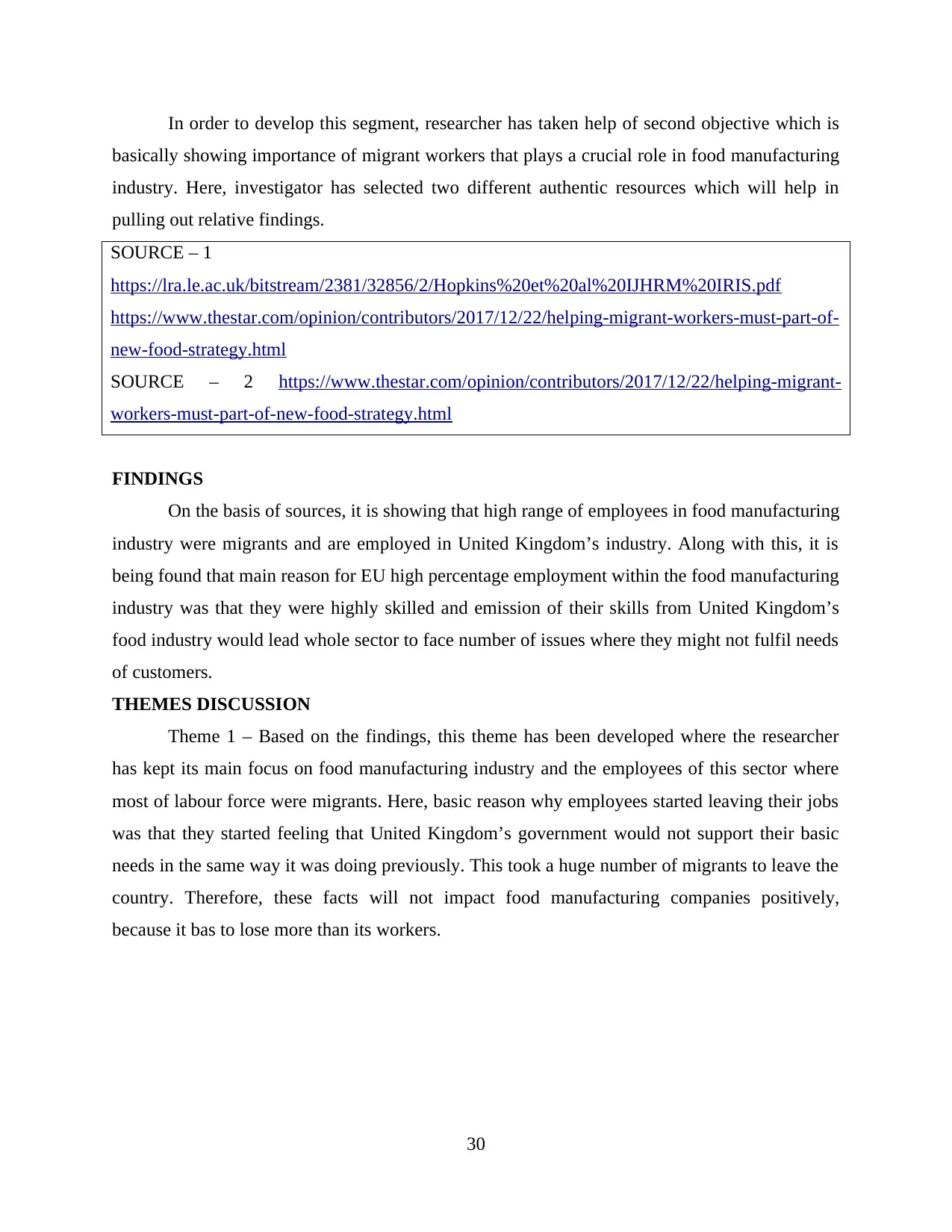
In order to develop this segment, researcher has taken help of second objective which is
basically showing importance of migrant workers that plays a crucial role in food manufacturing
industry. Here, investigator has selected two different authentic resources which will help in
pulling out relative findings.
SOURCE – 1
https://lra.le.ac.uk/bitstream/2381/32856/2/Hopkins%20et%20al%20IJHRM%20IRIS.pdf
https://www.thestar.com/opinion/contributors/2017/12/22/helping-migrant-workers-must-part-of-
new-food-strategy.html
SOURCE – 2 https://www.thestar.com/opinion/contributors/2017/12/22/helping-migrant-
workers-must-part-of-new-food-strategy.html
FINDINGS
On the basis of sources, it is showing that high range of employees in food manufacturing
industry were migrants and are employed in United Kingdom’s industry. Along with this, it is
being found that main reason for EU high percentage employment within the food manufacturing
industry was that they were highly skilled and emission of their skills from United Kingdom’s
food industry would lead whole sector to face number of issues where they might not fulfil needs
of customers.
THEMES DISCUSSION
Theme 1 – Based on the findings, this theme has been developed where the researcher
has kept its main focus on food manufacturing industry and the employees of this sector where
most of labour force were migrants. Here, basic reason why employees started leaving their jobs
was that they started feeling that United Kingdom’s government would not support their basic
needs in the same way it was doing previously. This took a huge number of migrants to leave the
country. Therefore, these facts will not impact food manufacturing companies positively,
because it bas to lose more than its workers.
30
basically showing importance of migrant workers that plays a crucial role in food manufacturing
industry. Here, investigator has selected two different authentic resources which will help in
pulling out relative findings.
SOURCE – 1
https://lra.le.ac.uk/bitstream/2381/32856/2/Hopkins%20et%20al%20IJHRM%20IRIS.pdf
https://www.thestar.com/opinion/contributors/2017/12/22/helping-migrant-workers-must-part-of-
new-food-strategy.html
SOURCE – 2 https://www.thestar.com/opinion/contributors/2017/12/22/helping-migrant-
workers-must-part-of-new-food-strategy.html
FINDINGS
On the basis of sources, it is showing that high range of employees in food manufacturing
industry were migrants and are employed in United Kingdom’s industry. Along with this, it is
being found that main reason for EU high percentage employment within the food manufacturing
industry was that they were highly skilled and emission of their skills from United Kingdom’s
food industry would lead whole sector to face number of issues where they might not fulfil needs
of customers.
THEMES DISCUSSION
Theme 1 – Based on the findings, this theme has been developed where the researcher
has kept its main focus on food manufacturing industry and the employees of this sector where
most of labour force were migrants. Here, basic reason why employees started leaving their jobs
was that they started feeling that United Kingdom’s government would not support their basic
needs in the same way it was doing previously. This took a huge number of migrants to leave the
country. Therefore, these facts will not impact food manufacturing companies positively,
because it bas to lose more than its workers.
30
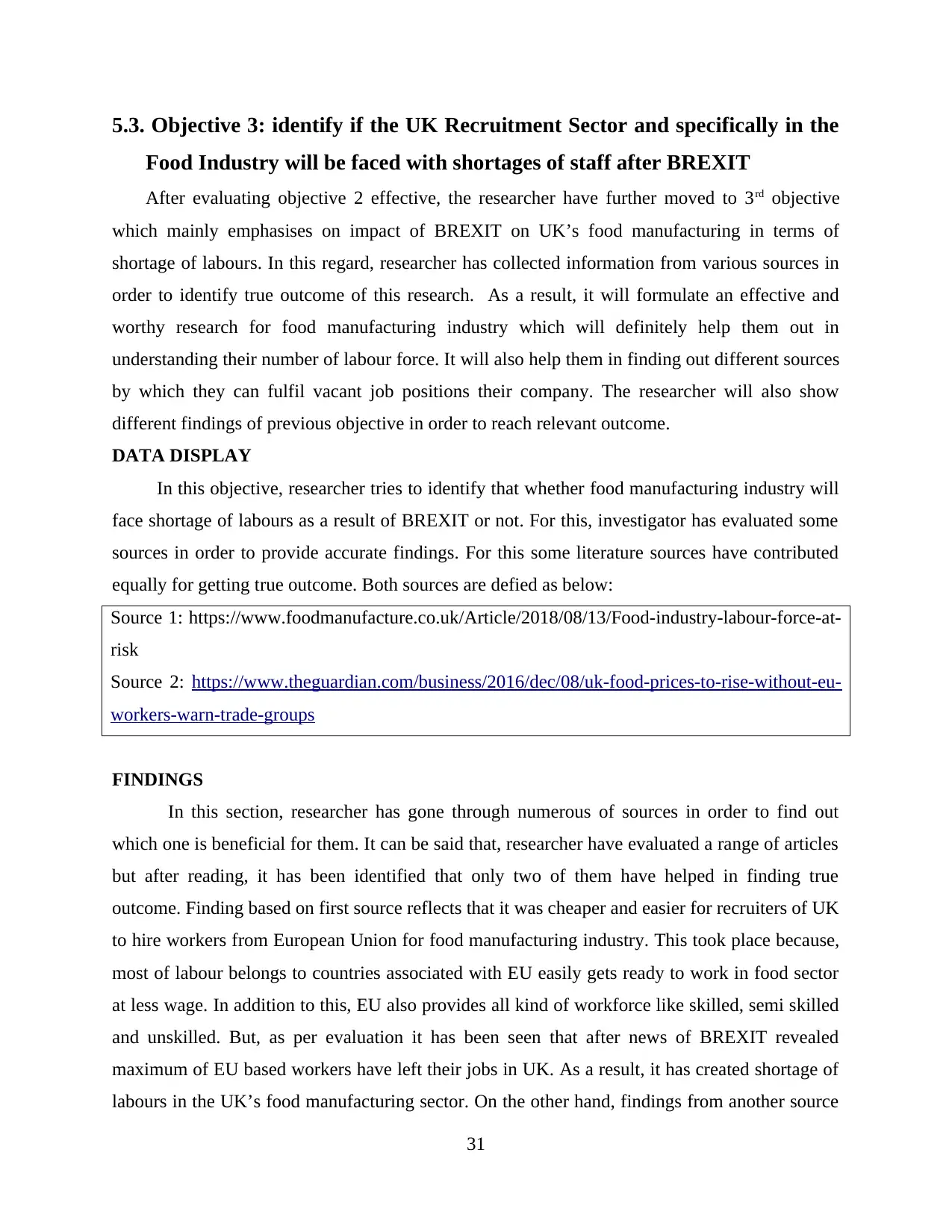
5.3. Objective 3: identify if the UK Recruitment Sector and specifically in the
Food Industry will be faced with shortages of staff after BREXIT
After evaluating objective 2 effective, the researcher have further moved to 3rd objective
which mainly emphasises on impact of BREXIT on UK’s food manufacturing in terms of
shortage of labours. In this regard, researcher has collected information from various sources in
order to identify true outcome of this research. As a result, it will formulate an effective and
worthy research for food manufacturing industry which will definitely help them out in
understanding their number of labour force. It will also help them in finding out different sources
by which they can fulfil vacant job positions their company. The researcher will also show
different findings of previous objective in order to reach relevant outcome.
DATA DISPLAY
In this objective, researcher tries to identify that whether food manufacturing industry will
face shortage of labours as a result of BREXIT or not. For this, investigator has evaluated some
sources in order to provide accurate findings. For this some literature sources have contributed
equally for getting true outcome. Both sources are defied as below:
Source 1: https://www.foodmanufacture.co.uk/Article/2018/08/13/Food-industry-labour-force-at-
risk
Source 2: https://www.theguardian.com/business/2016/dec/08/uk-food-prices-to-rise-without-eu-
workers-warn-trade-groups
FINDINGS
In this section, researcher has gone through numerous of sources in order to find out
which one is beneficial for them. It can be said that, researcher have evaluated a range of articles
but after reading, it has been identified that only two of them have helped in finding true
outcome. Finding based on first source reflects that it was cheaper and easier for recruiters of UK
to hire workers from European Union for food manufacturing industry. This took place because,
most of labour belongs to countries associated with EU easily gets ready to work in food sector
at less wage. In addition to this, EU also provides all kind of workforce like skilled, semi skilled
and unskilled. But, as per evaluation it has been seen that after news of BREXIT revealed
maximum of EU based workers have left their jobs in UK. As a result, it has created shortage of
labours in the UK’s food manufacturing sector. On the other hand, findings from another source
31
Food Industry will be faced with shortages of staff after BREXIT
After evaluating objective 2 effective, the researcher have further moved to 3rd objective
which mainly emphasises on impact of BREXIT on UK’s food manufacturing in terms of
shortage of labours. In this regard, researcher has collected information from various sources in
order to identify true outcome of this research. As a result, it will formulate an effective and
worthy research for food manufacturing industry which will definitely help them out in
understanding their number of labour force. It will also help them in finding out different sources
by which they can fulfil vacant job positions their company. The researcher will also show
different findings of previous objective in order to reach relevant outcome.
DATA DISPLAY
In this objective, researcher tries to identify that whether food manufacturing industry will
face shortage of labours as a result of BREXIT or not. For this, investigator has evaluated some
sources in order to provide accurate findings. For this some literature sources have contributed
equally for getting true outcome. Both sources are defied as below:
Source 1: https://www.foodmanufacture.co.uk/Article/2018/08/13/Food-industry-labour-force-at-
risk
Source 2: https://www.theguardian.com/business/2016/dec/08/uk-food-prices-to-rise-without-eu-
workers-warn-trade-groups
FINDINGS
In this section, researcher has gone through numerous of sources in order to find out
which one is beneficial for them. It can be said that, researcher have evaluated a range of articles
but after reading, it has been identified that only two of them have helped in finding true
outcome. Finding based on first source reflects that it was cheaper and easier for recruiters of UK
to hire workers from European Union for food manufacturing industry. This took place because,
most of labour belongs to countries associated with EU easily gets ready to work in food sector
at less wage. In addition to this, EU also provides all kind of workforce like skilled, semi skilled
and unskilled. But, as per evaluation it has been seen that after news of BREXIT revealed
maximum of EU based workers have left their jobs in UK. As a result, it has created shortage of
labours in the UK’s food manufacturing sector. On the other hand, findings from another source
31
Secure Best Marks with AI Grader
Need help grading? Try our AI Grader for instant feedback on your assignments.
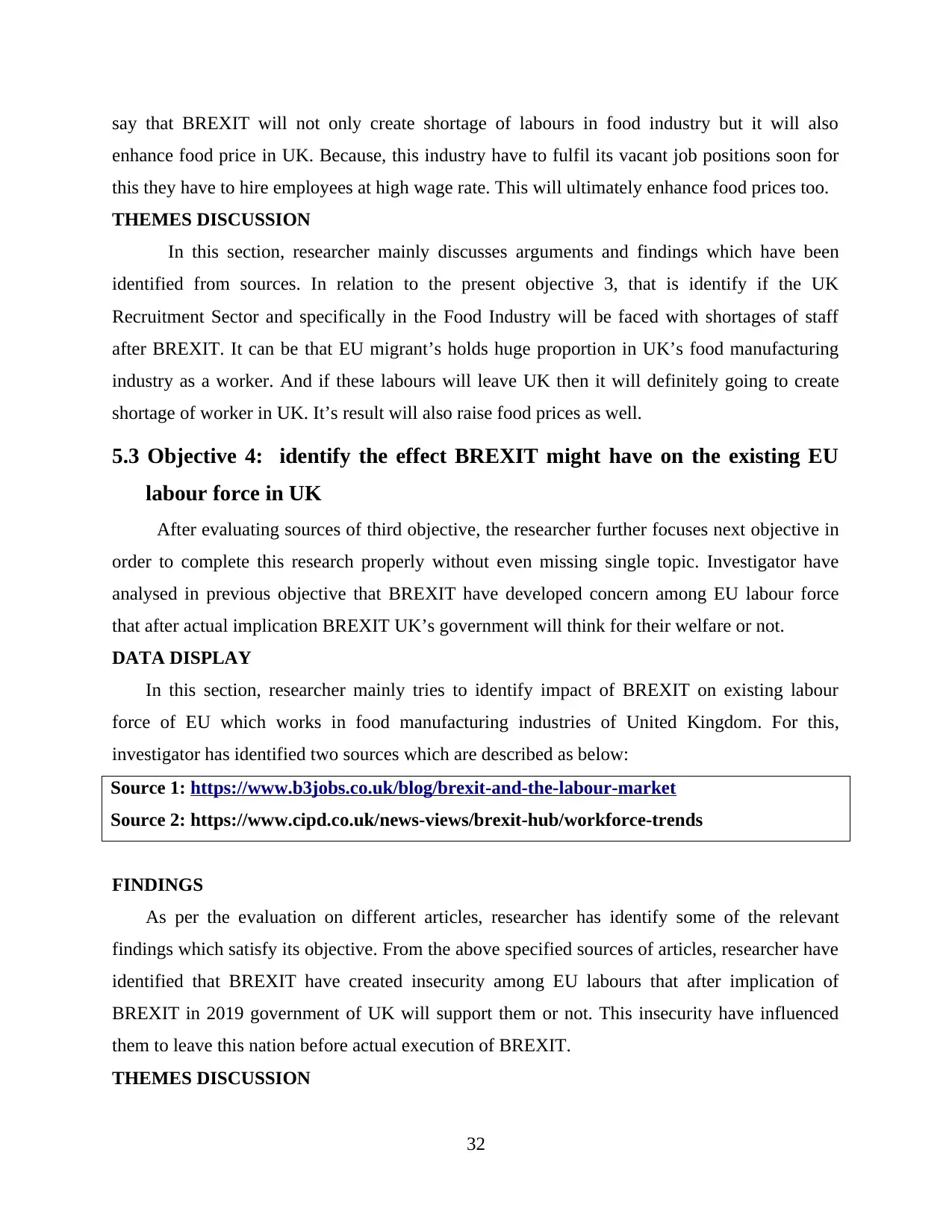
say that BREXIT will not only create shortage of labours in food industry but it will also
enhance food price in UK. Because, this industry have to fulfil its vacant job positions soon for
this they have to hire employees at high wage rate. This will ultimately enhance food prices too.
THEMES DISCUSSION
In this section, researcher mainly discusses arguments and findings which have been
identified from sources. In relation to the present objective 3, that is identify if the UK
Recruitment Sector and specifically in the Food Industry will be faced with shortages of staff
after BREXIT. It can be that EU migrant’s holds huge proportion in UK’s food manufacturing
industry as a worker. And if these labours will leave UK then it will definitely going to create
shortage of worker in UK. It’s result will also raise food prices as well.
5.3 Objective 4: identify the effect BREXIT might have on the existing EU
labour force in UK
After evaluating sources of third objective, the researcher further focuses next objective in
order to complete this research properly without even missing single topic. Investigator have
analysed in previous objective that BREXIT have developed concern among EU labour force
that after actual implication BREXIT UK’s government will think for their welfare or not.
DATA DISPLAY
In this section, researcher mainly tries to identify impact of BREXIT on existing labour
force of EU which works in food manufacturing industries of United Kingdom. For this,
investigator has identified two sources which are described as below:
Source 1: https://www.b3jobs.co.uk/blog/brexit-and-the-labour-market
Source 2: https://www.cipd.co.uk/news-views/brexit-hub/workforce-trends
FINDINGS
As per the evaluation on different articles, researcher has identify some of the relevant
findings which satisfy its objective. From the above specified sources of articles, researcher have
identified that BREXIT have created insecurity among EU labours that after implication of
BREXIT in 2019 government of UK will support them or not. This insecurity have influenced
them to leave this nation before actual execution of BREXIT.
THEMES DISCUSSION
32
enhance food price in UK. Because, this industry have to fulfil its vacant job positions soon for
this they have to hire employees at high wage rate. This will ultimately enhance food prices too.
THEMES DISCUSSION
In this section, researcher mainly discusses arguments and findings which have been
identified from sources. In relation to the present objective 3, that is identify if the UK
Recruitment Sector and specifically in the Food Industry will be faced with shortages of staff
after BREXIT. It can be that EU migrant’s holds huge proportion in UK’s food manufacturing
industry as a worker. And if these labours will leave UK then it will definitely going to create
shortage of worker in UK. It’s result will also raise food prices as well.
5.3 Objective 4: identify the effect BREXIT might have on the existing EU
labour force in UK
After evaluating sources of third objective, the researcher further focuses next objective in
order to complete this research properly without even missing single topic. Investigator have
analysed in previous objective that BREXIT have developed concern among EU labour force
that after actual implication BREXIT UK’s government will think for their welfare or not.
DATA DISPLAY
In this section, researcher mainly tries to identify impact of BREXIT on existing labour
force of EU which works in food manufacturing industries of United Kingdom. For this,
investigator has identified two sources which are described as below:
Source 1: https://www.b3jobs.co.uk/blog/brexit-and-the-labour-market
Source 2: https://www.cipd.co.uk/news-views/brexit-hub/workforce-trends
FINDINGS
As per the evaluation on different articles, researcher has identify some of the relevant
findings which satisfy its objective. From the above specified sources of articles, researcher have
identified that BREXIT have created insecurity among EU labours that after implication of
BREXIT in 2019 government of UK will support them or not. This insecurity have influenced
them to leave this nation before actual execution of BREXIT.
THEMES DISCUSSION
32
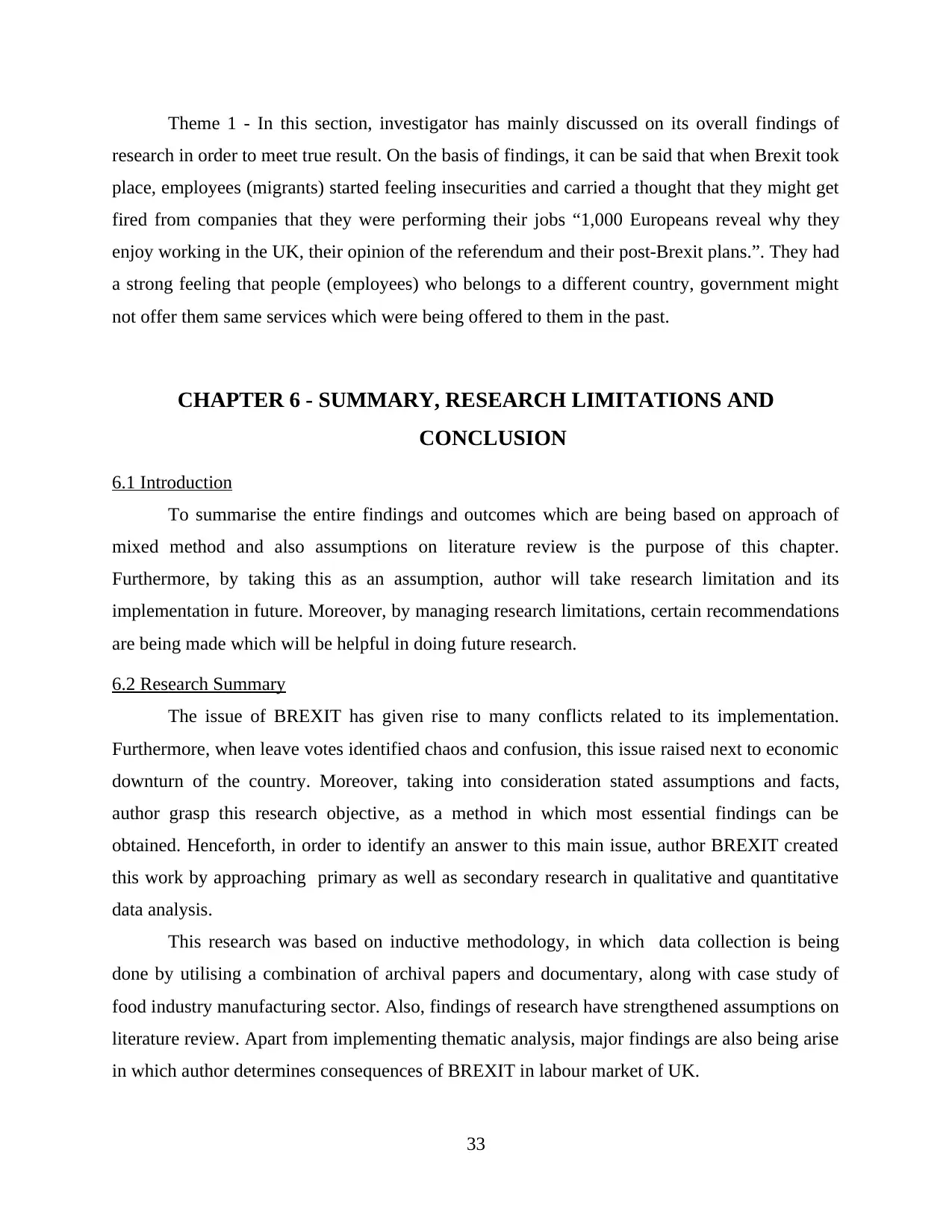
Theme 1 - In this section, investigator has mainly discussed on its overall findings of
research in order to meet true result. On the basis of findings, it can be said that when Brexit took
place, employees (migrants) started feeling insecurities and carried a thought that they might get
fired from companies that they were performing their jobs “1,000 Europeans reveal why they
enjoy working in the UK, their opinion of the referendum and their post-Brexit plans.”. They had
a strong feeling that people (employees) who belongs to a different country, government might
not offer them same services which were being offered to them in the past.
CHAPTER 6 - SUMMARY, RESEARCH LIMITATIONS AND
CONCLUSION
6.1 Introduction
To summarise the entire findings and outcomes which are being based on approach of
mixed method and also assumptions on literature review is the purpose of this chapter.
Furthermore, by taking this as an assumption, author will take research limitation and its
implementation in future. Moreover, by managing research limitations, certain recommendations
are being made which will be helpful in doing future research.
6.2 Research Summary
The issue of BREXIT has given rise to many conflicts related to its implementation.
Furthermore, when leave votes identified chaos and confusion, this issue raised next to economic
downturn of the country. Moreover, taking into consideration stated assumptions and facts,
author grasp this research objective, as a method in which most essential findings can be
obtained. Henceforth, in order to identify an answer to this main issue, author BREXIT created
this work by approaching primary as well as secondary research in qualitative and quantitative
data analysis.
This research was based on inductive methodology, in which data collection is being
done by utilising a combination of archival papers and documentary, along with case study of
food industry manufacturing sector. Also, findings of research have strengthened assumptions on
literature review. Apart from implementing thematic analysis, major findings are also being arise
in which author determines consequences of BREXIT in labour market of UK.
33
research in order to meet true result. On the basis of findings, it can be said that when Brexit took
place, employees (migrants) started feeling insecurities and carried a thought that they might get
fired from companies that they were performing their jobs “1,000 Europeans reveal why they
enjoy working in the UK, their opinion of the referendum and their post-Brexit plans.”. They had
a strong feeling that people (employees) who belongs to a different country, government might
not offer them same services which were being offered to them in the past.
CHAPTER 6 - SUMMARY, RESEARCH LIMITATIONS AND
CONCLUSION
6.1 Introduction
To summarise the entire findings and outcomes which are being based on approach of
mixed method and also assumptions on literature review is the purpose of this chapter.
Furthermore, by taking this as an assumption, author will take research limitation and its
implementation in future. Moreover, by managing research limitations, certain recommendations
are being made which will be helpful in doing future research.
6.2 Research Summary
The issue of BREXIT has given rise to many conflicts related to its implementation.
Furthermore, when leave votes identified chaos and confusion, this issue raised next to economic
downturn of the country. Moreover, taking into consideration stated assumptions and facts,
author grasp this research objective, as a method in which most essential findings can be
obtained. Henceforth, in order to identify an answer to this main issue, author BREXIT created
this work by approaching primary as well as secondary research in qualitative and quantitative
data analysis.
This research was based on inductive methodology, in which data collection is being
done by utilising a combination of archival papers and documentary, along with case study of
food industry manufacturing sector. Also, findings of research have strengthened assumptions on
literature review. Apart from implementing thematic analysis, major findings are also being arise
in which author determines consequences of BREXIT in labour market of UK.
33
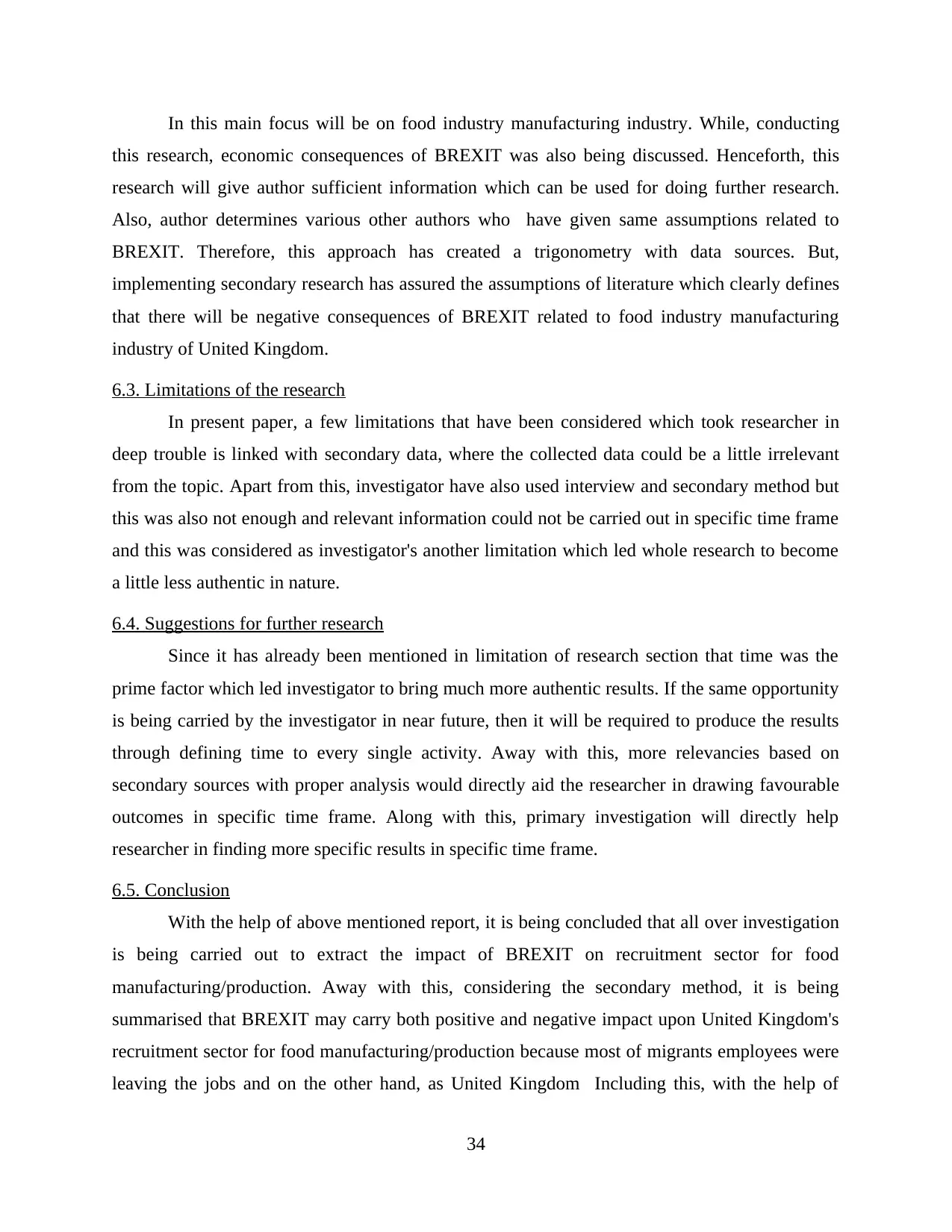
In this main focus will be on food industry manufacturing industry. While, conducting
this research, economic consequences of BREXIT was also being discussed. Henceforth, this
research will give author sufficient information which can be used for doing further research.
Also, author determines various other authors who have given same assumptions related to
BREXIT. Therefore, this approach has created a trigonometry with data sources. But,
implementing secondary research has assured the assumptions of literature which clearly defines
that there will be negative consequences of BREXIT related to food industry manufacturing
industry of United Kingdom.
6.3. Limitations of the research
In present paper, a few limitations that have been considered which took researcher in
deep trouble is linked with secondary data, where the collected data could be a little irrelevant
from the topic. Apart from this, investigator have also used interview and secondary method but
this was also not enough and relevant information could not be carried out in specific time frame
and this was considered as investigator's another limitation which led whole research to become
a little less authentic in nature.
6.4. Suggestions for further research
Since it has already been mentioned in limitation of research section that time was the
prime factor which led investigator to bring much more authentic results. If the same opportunity
is being carried by the investigator in near future, then it will be required to produce the results
through defining time to every single activity. Away with this, more relevancies based on
secondary sources with proper analysis would directly aid the researcher in drawing favourable
outcomes in specific time frame. Along with this, primary investigation will directly help
researcher in finding more specific results in specific time frame.
6.5. Conclusion
With the help of above mentioned report, it is being concluded that all over investigation
is being carried out to extract the impact of BREXIT on recruitment sector for food
manufacturing/production. Away with this, considering the secondary method, it is being
summarised that BREXIT may carry both positive and negative impact upon United Kingdom's
recruitment sector for food manufacturing/production because most of migrants employees were
leaving the jobs and on the other hand, as United Kingdom Including this, with the help of
34
this research, economic consequences of BREXIT was also being discussed. Henceforth, this
research will give author sufficient information which can be used for doing further research.
Also, author determines various other authors who have given same assumptions related to
BREXIT. Therefore, this approach has created a trigonometry with data sources. But,
implementing secondary research has assured the assumptions of literature which clearly defines
that there will be negative consequences of BREXIT related to food industry manufacturing
industry of United Kingdom.
6.3. Limitations of the research
In present paper, a few limitations that have been considered which took researcher in
deep trouble is linked with secondary data, where the collected data could be a little irrelevant
from the topic. Apart from this, investigator have also used interview and secondary method but
this was also not enough and relevant information could not be carried out in specific time frame
and this was considered as investigator's another limitation which led whole research to become
a little less authentic in nature.
6.4. Suggestions for further research
Since it has already been mentioned in limitation of research section that time was the
prime factor which led investigator to bring much more authentic results. If the same opportunity
is being carried by the investigator in near future, then it will be required to produce the results
through defining time to every single activity. Away with this, more relevancies based on
secondary sources with proper analysis would directly aid the researcher in drawing favourable
outcomes in specific time frame. Along with this, primary investigation will directly help
researcher in finding more specific results in specific time frame.
6.5. Conclusion
With the help of above mentioned report, it is being concluded that all over investigation
is being carried out to extract the impact of BREXIT on recruitment sector for food
manufacturing/production. Away with this, considering the secondary method, it is being
summarised that BREXIT may carry both positive and negative impact upon United Kingdom's
recruitment sector for food manufacturing/production because most of migrants employees were
leaving the jobs and on the other hand, as United Kingdom Including this, with the help of
34
Paraphrase This Document
Need a fresh take? Get an instant paraphrase of this document with our AI Paraphraser
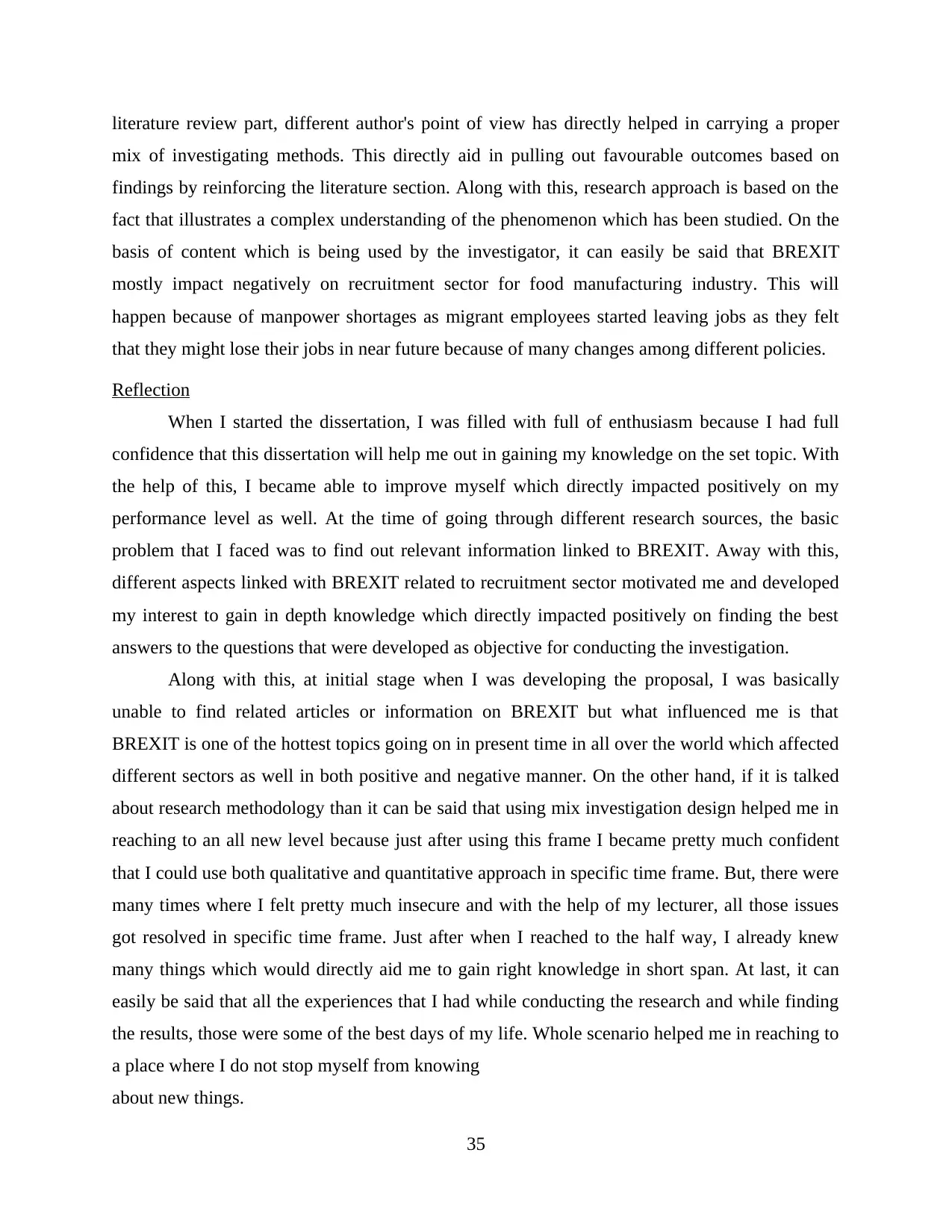
literature review part, different author's point of view has directly helped in carrying a proper
mix of investigating methods. This directly aid in pulling out favourable outcomes based on
findings by reinforcing the literature section. Along with this, research approach is based on the
fact that illustrates a complex understanding of the phenomenon which has been studied. On the
basis of content which is being used by the investigator, it can easily be said that BREXIT
mostly impact negatively on recruitment sector for food manufacturing industry. This will
happen because of manpower shortages as migrant employees started leaving jobs as they felt
that they might lose their jobs in near future because of many changes among different policies.
Reflection
When I started the dissertation, I was filled with full of enthusiasm because I had full
confidence that this dissertation will help me out in gaining my knowledge on the set topic. With
the help of this, I became able to improve myself which directly impacted positively on my
performance level as well. At the time of going through different research sources, the basic
problem that I faced was to find out relevant information linked to BREXIT. Away with this,
different aspects linked with BREXIT related to recruitment sector motivated me and developed
my interest to gain in depth knowledge which directly impacted positively on finding the best
answers to the questions that were developed as objective for conducting the investigation.
Along with this, at initial stage when I was developing the proposal, I was basically
unable to find related articles or information on BREXIT but what influenced me is that
BREXIT is one of the hottest topics going on in present time in all over the world which affected
different sectors as well in both positive and negative manner. On the other hand, if it is talked
about research methodology than it can be said that using mix investigation design helped me in
reaching to an all new level because just after using this frame I became pretty much confident
that I could use both qualitative and quantitative approach in specific time frame. But, there were
many times where I felt pretty much insecure and with the help of my lecturer, all those issues
got resolved in specific time frame. Just after when I reached to the half way, I already knew
many things which would directly aid me to gain right knowledge in short span. At last, it can
easily be said that all the experiences that I had while conducting the research and while finding
the results, those were some of the best days of my life. Whole scenario helped me in reaching to
a place where I do not stop myself from knowing
about new things.
35
mix of investigating methods. This directly aid in pulling out favourable outcomes based on
findings by reinforcing the literature section. Along with this, research approach is based on the
fact that illustrates a complex understanding of the phenomenon which has been studied. On the
basis of content which is being used by the investigator, it can easily be said that BREXIT
mostly impact negatively on recruitment sector for food manufacturing industry. This will
happen because of manpower shortages as migrant employees started leaving jobs as they felt
that they might lose their jobs in near future because of many changes among different policies.
Reflection
When I started the dissertation, I was filled with full of enthusiasm because I had full
confidence that this dissertation will help me out in gaining my knowledge on the set topic. With
the help of this, I became able to improve myself which directly impacted positively on my
performance level as well. At the time of going through different research sources, the basic
problem that I faced was to find out relevant information linked to BREXIT. Away with this,
different aspects linked with BREXIT related to recruitment sector motivated me and developed
my interest to gain in depth knowledge which directly impacted positively on finding the best
answers to the questions that were developed as objective for conducting the investigation.
Along with this, at initial stage when I was developing the proposal, I was basically
unable to find related articles or information on BREXIT but what influenced me is that
BREXIT is one of the hottest topics going on in present time in all over the world which affected
different sectors as well in both positive and negative manner. On the other hand, if it is talked
about research methodology than it can be said that using mix investigation design helped me in
reaching to an all new level because just after using this frame I became pretty much confident
that I could use both qualitative and quantitative approach in specific time frame. But, there were
many times where I felt pretty much insecure and with the help of my lecturer, all those issues
got resolved in specific time frame. Just after when I reached to the half way, I already knew
many things which would directly aid me to gain right knowledge in short span. At last, it can
easily be said that all the experiences that I had while conducting the research and while finding
the results, those were some of the best days of my life. Whole scenario helped me in reaching to
a place where I do not stop myself from knowing
about new things.
35
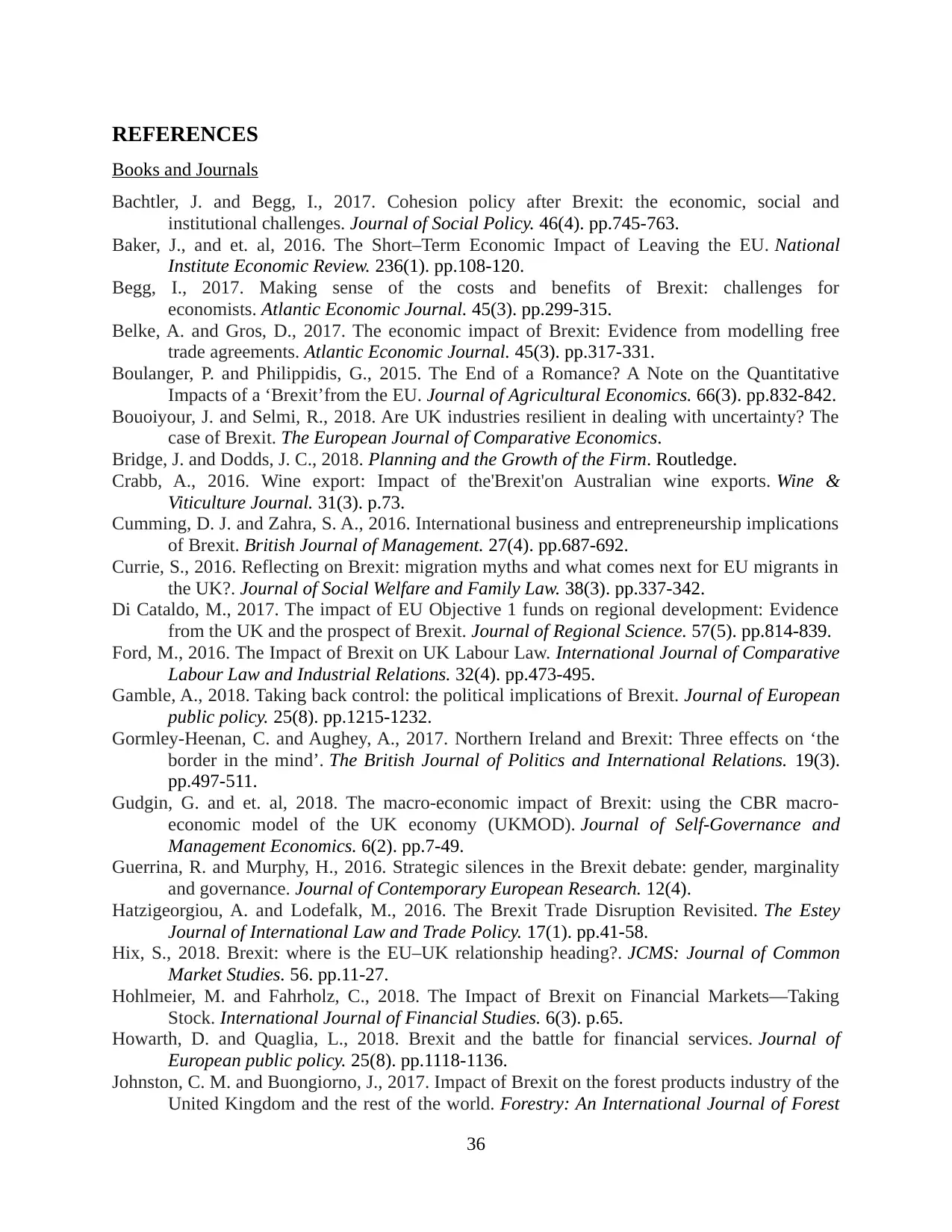
REFERENCES
Books and Journals
Bachtler, J. and Begg, I., 2017. Cohesion policy after Brexit: the economic, social and
institutional challenges. Journal of Social Policy. 46(4). pp.745-763.
Baker, J., and et. al, 2016. The Short–Term Economic Impact of Leaving the EU. National
Institute Economic Review. 236(1). pp.108-120.
Begg, I., 2017. Making sense of the costs and benefits of Brexit: challenges for
economists. Atlantic Economic Journal. 45(3). pp.299-315.
Belke, A. and Gros, D., 2017. The economic impact of Brexit: Evidence from modelling free
trade agreements. Atlantic Economic Journal. 45(3). pp.317-331.
Boulanger, P. and Philippidis, G., 2015. The End of a Romance? A Note on the Quantitative
Impacts of a ‘Brexit’from the EU. Journal of Agricultural Economics. 66(3). pp.832-842.
Bouoiyour, J. and Selmi, R., 2018. Are UK industries resilient in dealing with uncertainty? The
case of Brexit. The European Journal of Comparative Economics.
Bridge, J. and Dodds, J. C., 2018. Planning and the Growth of the Firm. Routledge.
Crabb, A., 2016. Wine export: Impact of the'Brexit'on Australian wine exports. Wine &
Viticulture Journal. 31(3). p.73.
Cumming, D. J. and Zahra, S. A., 2016. International business and entrepreneurship implications
of Brexit. British Journal of Management. 27(4). pp.687-692.
Currie, S., 2016. Reflecting on Brexit: migration myths and what comes next for EU migrants in
the UK?. Journal of Social Welfare and Family Law. 38(3). pp.337-342.
Di Cataldo, M., 2017. The impact of EU Objective 1 funds on regional development: Evidence
from the UK and the prospect of Brexit. Journal of Regional Science. 57(5). pp.814-839.
Ford, M., 2016. The Impact of Brexit on UK Labour Law. International Journal of Comparative
Labour Law and Industrial Relations. 32(4). pp.473-495.
Gamble, A., 2018. Taking back control: the political implications of Brexit. Journal of European
public policy. 25(8). pp.1215-1232.
Gormley-Heenan, C. and Aughey, A., 2017. Northern Ireland and Brexit: Three effects on ‘the
border in the mind’. The British Journal of Politics and International Relations. 19(3).
pp.497-511.
Gudgin, G. and et. al, 2018. The macro-economic impact of Brexit: using the CBR macro-
economic model of the UK economy (UKMOD). Journal of Self-Governance and
Management Economics. 6(2). pp.7-49.
Guerrina, R. and Murphy, H., 2016. Strategic silences in the Brexit debate: gender, marginality
and governance. Journal of Contemporary European Research. 12(4).
Hatzigeorgiou, A. and Lodefalk, M., 2016. The Brexit Trade Disruption Revisited. The Estey
Journal of International Law and Trade Policy. 17(1). pp.41-58.
Hix, S., 2018. Brexit: where is the EU–UK relationship heading?. JCMS: Journal of Common
Market Studies. 56. pp.11-27.
Hohlmeier, M. and Fahrholz, C., 2018. The Impact of Brexit on Financial Markets—Taking
Stock. International Journal of Financial Studies. 6(3). p.65.
Howarth, D. and Quaglia, L., 2018. Brexit and the battle for financial services. Journal of
European public policy. 25(8). pp.1118-1136.
Johnston, C. M. and Buongiorno, J., 2017. Impact of Brexit on the forest products industry of the
United Kingdom and the rest of the world. Forestry: An International Journal of Forest
36
Books and Journals
Bachtler, J. and Begg, I., 2017. Cohesion policy after Brexit: the economic, social and
institutional challenges. Journal of Social Policy. 46(4). pp.745-763.
Baker, J., and et. al, 2016. The Short–Term Economic Impact of Leaving the EU. National
Institute Economic Review. 236(1). pp.108-120.
Begg, I., 2017. Making sense of the costs and benefits of Brexit: challenges for
economists. Atlantic Economic Journal. 45(3). pp.299-315.
Belke, A. and Gros, D., 2017. The economic impact of Brexit: Evidence from modelling free
trade agreements. Atlantic Economic Journal. 45(3). pp.317-331.
Boulanger, P. and Philippidis, G., 2015. The End of a Romance? A Note on the Quantitative
Impacts of a ‘Brexit’from the EU. Journal of Agricultural Economics. 66(3). pp.832-842.
Bouoiyour, J. and Selmi, R., 2018. Are UK industries resilient in dealing with uncertainty? The
case of Brexit. The European Journal of Comparative Economics.
Bridge, J. and Dodds, J. C., 2018. Planning and the Growth of the Firm. Routledge.
Crabb, A., 2016. Wine export: Impact of the'Brexit'on Australian wine exports. Wine &
Viticulture Journal. 31(3). p.73.
Cumming, D. J. and Zahra, S. A., 2016. International business and entrepreneurship implications
of Brexit. British Journal of Management. 27(4). pp.687-692.
Currie, S., 2016. Reflecting on Brexit: migration myths and what comes next for EU migrants in
the UK?. Journal of Social Welfare and Family Law. 38(3). pp.337-342.
Di Cataldo, M., 2017. The impact of EU Objective 1 funds on regional development: Evidence
from the UK and the prospect of Brexit. Journal of Regional Science. 57(5). pp.814-839.
Ford, M., 2016. The Impact of Brexit on UK Labour Law. International Journal of Comparative
Labour Law and Industrial Relations. 32(4). pp.473-495.
Gamble, A., 2018. Taking back control: the political implications of Brexit. Journal of European
public policy. 25(8). pp.1215-1232.
Gormley-Heenan, C. and Aughey, A., 2017. Northern Ireland and Brexit: Three effects on ‘the
border in the mind’. The British Journal of Politics and International Relations. 19(3).
pp.497-511.
Gudgin, G. and et. al, 2018. The macro-economic impact of Brexit: using the CBR macro-
economic model of the UK economy (UKMOD). Journal of Self-Governance and
Management Economics. 6(2). pp.7-49.
Guerrina, R. and Murphy, H., 2016. Strategic silences in the Brexit debate: gender, marginality
and governance. Journal of Contemporary European Research. 12(4).
Hatzigeorgiou, A. and Lodefalk, M., 2016. The Brexit Trade Disruption Revisited. The Estey
Journal of International Law and Trade Policy. 17(1). pp.41-58.
Hix, S., 2018. Brexit: where is the EU–UK relationship heading?. JCMS: Journal of Common
Market Studies. 56. pp.11-27.
Hohlmeier, M. and Fahrholz, C., 2018. The Impact of Brexit on Financial Markets—Taking
Stock. International Journal of Financial Studies. 6(3). p.65.
Howarth, D. and Quaglia, L., 2018. Brexit and the battle for financial services. Journal of
European public policy. 25(8). pp.1118-1136.
Johnston, C. M. and Buongiorno, J., 2017. Impact of Brexit on the forest products industry of the
United Kingdom and the rest of the world. Forestry: An International Journal of Forest
36
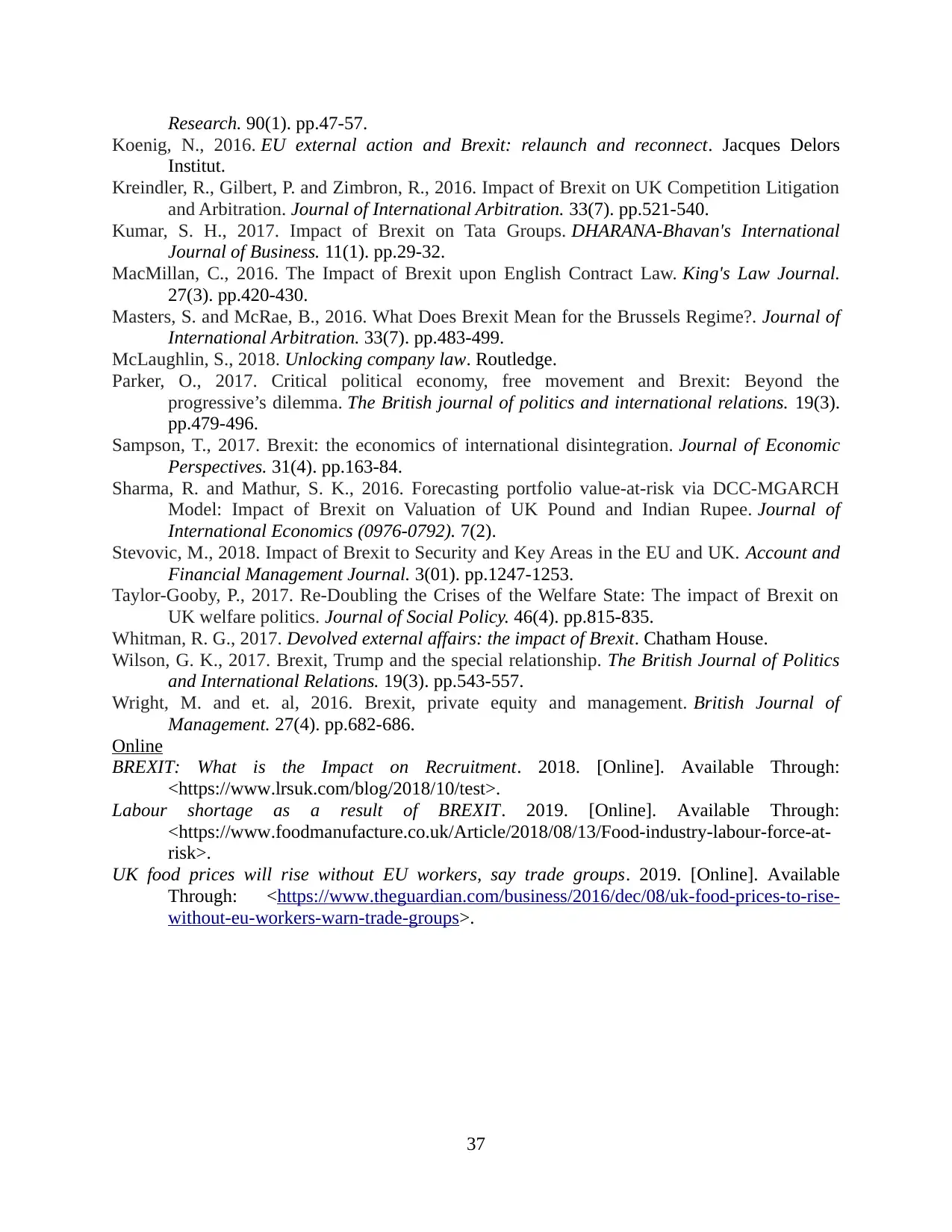
Research. 90(1). pp.47-57.
Koenig, N., 2016. EU external action and Brexit: relaunch and reconnect. Jacques Delors
Institut.
Kreindler, R., Gilbert, P. and Zimbron, R., 2016. Impact of Brexit on UK Competition Litigation
and Arbitration. Journal of International Arbitration. 33(7). pp.521-540.
Kumar, S. H., 2017. Impact of Brexit on Tata Groups. DHARANA-Bhavan's International
Journal of Business. 11(1). pp.29-32.
MacMillan, C., 2016. The Impact of Brexit upon English Contract Law. King's Law Journal.
27(3). pp.420-430.
Masters, S. and McRae, B., 2016. What Does Brexit Mean for the Brussels Regime?. Journal of
International Arbitration. 33(7). pp.483-499.
McLaughlin, S., 2018. Unlocking company law. Routledge.
Parker, O., 2017. Critical political economy, free movement and Brexit: Beyond the
progressive’s dilemma. The British journal of politics and international relations. 19(3).
pp.479-496.
Sampson, T., 2017. Brexit: the economics of international disintegration. Journal of Economic
Perspectives. 31(4). pp.163-84.
Sharma, R. and Mathur, S. K., 2016. Forecasting portfolio value-at-risk via DCC-MGARCH
Model: Impact of Brexit on Valuation of UK Pound and Indian Rupee. Journal of
International Economics (0976-0792). 7(2).
Stevovic, M., 2018. Impact of Brexit to Security and Key Areas in the EU and UK. Account and
Financial Management Journal. 3(01). pp.1247-1253.
Taylor-Gooby, P., 2017. Re-Doubling the Crises of the Welfare State: The impact of Brexit on
UK welfare politics. Journal of Social Policy. 46(4). pp.815-835.
Whitman, R. G., 2017. Devolved external affairs: the impact of Brexit. Chatham House.
Wilson, G. K., 2017. Brexit, Trump and the special relationship. The British Journal of Politics
and International Relations. 19(3). pp.543-557.
Wright, M. and et. al, 2016. Brexit, private equity and management. British Journal of
Management. 27(4). pp.682-686.
Online
BREXIT: What is the Impact on Recruitment. 2018. [Online]. Available Through:
<https://www.lrsuk.com/blog/2018/10/test>.
Labour shortage as a result of BREXIT. 2019. [Online]. Available Through:
<https://www.foodmanufacture.co.uk/Article/2018/08/13/Food-industry-labour-force-at-
risk>.
UK food prices will rise without EU workers, say trade groups. 2019. [Online]. Available
Through: <https://www.theguardian.com/business/2016/dec/08/uk-food-prices-to-rise-
without-eu-workers-warn-trade-groups>.
37
Koenig, N., 2016. EU external action and Brexit: relaunch and reconnect. Jacques Delors
Institut.
Kreindler, R., Gilbert, P. and Zimbron, R., 2016. Impact of Brexit on UK Competition Litigation
and Arbitration. Journal of International Arbitration. 33(7). pp.521-540.
Kumar, S. H., 2017. Impact of Brexit on Tata Groups. DHARANA-Bhavan's International
Journal of Business. 11(1). pp.29-32.
MacMillan, C., 2016. The Impact of Brexit upon English Contract Law. King's Law Journal.
27(3). pp.420-430.
Masters, S. and McRae, B., 2016. What Does Brexit Mean for the Brussels Regime?. Journal of
International Arbitration. 33(7). pp.483-499.
McLaughlin, S., 2018. Unlocking company law. Routledge.
Parker, O., 2017. Critical political economy, free movement and Brexit: Beyond the
progressive’s dilemma. The British journal of politics and international relations. 19(3).
pp.479-496.
Sampson, T., 2017. Brexit: the economics of international disintegration. Journal of Economic
Perspectives. 31(4). pp.163-84.
Sharma, R. and Mathur, S. K., 2016. Forecasting portfolio value-at-risk via DCC-MGARCH
Model: Impact of Brexit on Valuation of UK Pound and Indian Rupee. Journal of
International Economics (0976-0792). 7(2).
Stevovic, M., 2018. Impact of Brexit to Security and Key Areas in the EU and UK. Account and
Financial Management Journal. 3(01). pp.1247-1253.
Taylor-Gooby, P., 2017. Re-Doubling the Crises of the Welfare State: The impact of Brexit on
UK welfare politics. Journal of Social Policy. 46(4). pp.815-835.
Whitman, R. G., 2017. Devolved external affairs: the impact of Brexit. Chatham House.
Wilson, G. K., 2017. Brexit, Trump and the special relationship. The British Journal of Politics
and International Relations. 19(3). pp.543-557.
Wright, M. and et. al, 2016. Brexit, private equity and management. British Journal of
Management. 27(4). pp.682-686.
Online
BREXIT: What is the Impact on Recruitment. 2018. [Online]. Available Through:
<https://www.lrsuk.com/blog/2018/10/test>.
Labour shortage as a result of BREXIT. 2019. [Online]. Available Through:
<https://www.foodmanufacture.co.uk/Article/2018/08/13/Food-industry-labour-force-at-
risk>.
UK food prices will rise without EU workers, say trade groups. 2019. [Online]. Available
Through: <https://www.theguardian.com/business/2016/dec/08/uk-food-prices-to-rise-
without-eu-workers-warn-trade-groups>.
37
1 out of 40
Related Documents
Your All-in-One AI-Powered Toolkit for Academic Success.
+13062052269
info@desklib.com
Available 24*7 on WhatsApp / Email
![[object Object]](/_next/static/media/star-bottom.7253800d.svg)
Unlock your academic potential
© 2024 | Zucol Services PVT LTD | All rights reserved.





